#sometimes i watch the end of red flag just to marvel in his acting
Explore tagged Tumblr posts
Text
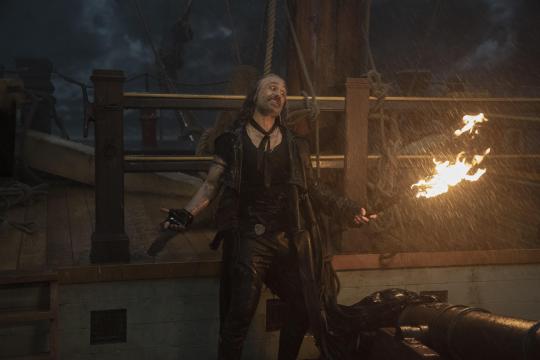
LIIIIIIIKE TAIKA DID YOU HAVE TO GO THAT HARD???????
[picture source]
#OFMD#Our Flag Means Death#Edward Teach#Taika Waititi#sometimes i watch the end of red flag just to marvel in his acting#even though it hurts so SO SO BAD#BUT LIKE#GOOD //GOD//
180 notes
·
View notes
Text
How Shadow and Bones Differentiate Villain and Anti-Hero
Alright, first I need to claim the fact that I love dark, edgy, but misunderstood bad boy in stories with the potential of epic redemption. Loki from Marvel. Jason Todd from DC. Captain Hook from Once Upon a Time. Zuko from AtLA. You name them, I simp them.
So when I watched this new show on Netflix and shown a tall, handsome man in dark clothing, both respected and feared for his power. I feel... nothing.
WHICH IS WEIRD! Like... he’s obviously my type. Complete with the sad backstory and vicious streak. So I kept wondering why I wasn’t enamored by the Darkling, Alexander Kirigan. I wasn’t surprised he was the main villain, I even expected it. But I usually at least have a bit of sympathy for them. This OOC behavior of mine made me introspect myself and the show, trying to find out which part gave me the red flags before Mother Darkling decides to pop the chosen one out halfway in the season.
That’s when it hit me; there were red flags! The show had been subtly trying to tell us Kirigan is a manipulative boyfriend not just by great acting and good directing, but by comparing him with the actual anti-hero of the story who I actually love; Kaz Brekker.
Here’s the list of signs you might not notice of why Kirigan is meant to be a Villain instead of an Anti-Hero.
1. The Eyes
"The eyes are the window to the soul" is a common saying and and the key to good acting for any good show. Eyes tell us a lot about what a person’s character is like and SaB showed us the difference of a sincere man and a man with a hidden agenda.
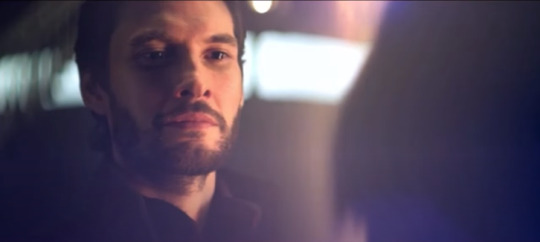
Look at him! Look at that little smirk. Look at the gaze. That's the look you find when someone's evil little plan is finally coming together. Not one awed by the power or by Alina. A blatant sus move is what I'm saying. Congrat, first flag planted.
Sure he could still fall in love with Alina, but that doesn't stop his agenda either. All it does is potentially create conflict for him to pick either his plan for revenge or life with Alina.

In comparison, look at Kaz when he said this to Inej; "She isn't like you, no one is." Straightforward eyes. Serious grim. No nonsense tone. Inej is one of the most talented and terrifying rogue-assassin and Kaz just blatantly said that he kept her from 'slavery' because of who she is, not what she's capable of. Like... the man has no shame being known to love her while still trying to be professional (or as professional a thief can be). I can respect that.
This is the eye of a man who would abandon everything to make sure she comes out alright in the end. Do not argue with me on this!
2. Leverage and Status
The moment Alina steps into the Little Palace she was treated like a princess. A palace, by the way, that’s managed by the Darkling. She gets favorable treatment; from the food, Zoya displaced when she fought Alina, a horseback ride just the two of them, asking her to call by his name to make them familiar, a black uniform that might as well be claiming???
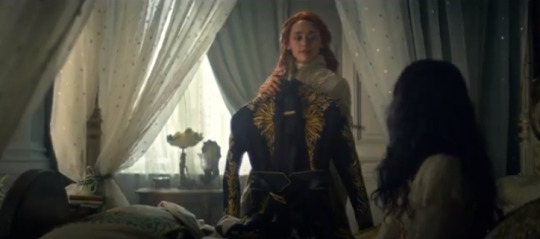
Dude is desperate is what I’m saying.
Sure, this could all be romantic gestures. There’s the problem that Kirigan is superior in status and name, powerful Grisha, and has a vested interest in her power. Pursuing romance while Kirigan has the ability to make her life heaven or hell with a snap of his finger made every single decision be seen with wariness.
"Beware of powerful men," Genya couldn't put it any better.
Had they pursued romance after they destroy the fold, cementing Alina’s position as a saint more. Then I might have let go of that wariness.
I’m only proven correct when the moment Alina turned away from him, Kirigan made another leverage by (spoiler!) putting an antler to her collarbone... eeeewwww much?!
That’s how desperate the Darkling is to be in control of a person and a situation.
And when no letter came for Alina? That a big red flag because who else in this castle can control the coming of going of letter with the Savior. HMMMMMMMMMMM.....
Then there’s Kaz. My man. There’s no competition. This guy held no leverage on my dear Inej. When she almost decided to leave, Kaz didn't force or convince her to stay but he ask her. Doesn't remind her of her debt whether monetary or life debt to him. In fact, this guy needs money for revenge but instead mortgage his main source of income for her freedom.
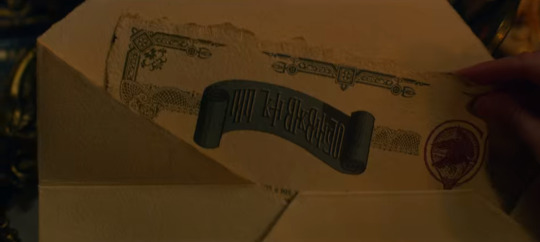
HE POSTPONED HIS LIFE GOAL TO FREE HER FROM DEBT ASJHAKFSDJGLDFJ!!!
What more do I need to say?
3. Sympathy Card
This is the type of point you want to watch out from your partners, ladies, gents, and others. The sympathy card is the way to go when anyone wants to reach out to you so you can take care of them before they abuse or gaslight you.
While it’s good to share trauma and eased the burden, sometimes it's healthy to ask yourself whether the person can take advantage of you and to verify whether they lie to you or not.
When Kirigan shared about his past as a sympathetic boy with his secluded fountain and coin. Everything about that scene rang warning bells for me... the part he had requested her to use his color... requesting to horse ride with just them two... sharing sob story that may encourage Alina to help him...
Kudos to Alina to see through the fact she's seen as a means to an end.
It was only when Kirigan showed righteous anger and frustration of a war that's killing his people did Alina finally opened her heart to him.
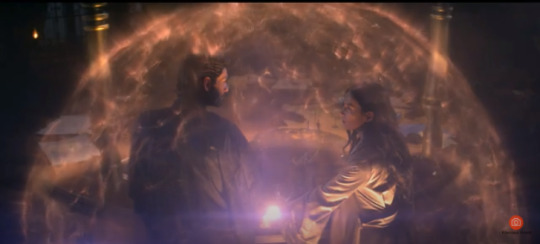
Kaz however doesn't use the sympathy card. Heck, the man likes to believe he shed away any weakness and threw it in the harbor where it belongs. Kaz hates weaknesses. And garnering sympathy is an admission of weakness for him.
We still know there's a tragic backstory as any decent anti-hero would have... but by not sharing that, this implies that Inej and Jesper stayed because of who he is, and not because of who he was or how he came to be. They don't need a sob story to stay together and that showed a stronger bond between them.
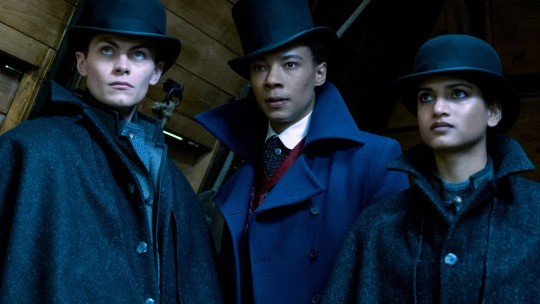
4. Friends
To be frank, I find this the most hilarious because this point is the one that convinced me that Kirigan was secretly an evil bastard.
He doesn’t have any friends!!!
Like... dude had a literal witch army, a wife once, a fuck buddy, and a girlfriend but there wasn’t a single moment in the show where someone, outside of Alina and superior, to speak casually to him.
You’re telling me this person... the most powerful and influential Grisha in the East Ravka, charming as hell, handsome as fuck, and yet he doesn’t have friends?!
“I’ve buried good soldiers... friends...” Get the fuck out of here! WHAT FRIENDS?!?! Maybe if you get off your little power trip from your self-made pedestal, you can actually be less of an asshole and make one.
Sure he excused himself by blaming his ‘ancestor’ for being a shadow summoner. I can see how the fear makes it hard for him to get close to anybody. But all the other characters who are part of his army only ever shown to speak with him respectfully, and the royalty even commend him. No one disrespected him even openly and you’re telling me he doesn’t have one friend amidst all these people?!
In comparison, look at Kaz. He’s brash, crude, and unapologetic. He held true to his moniker ‘Bastard of the Barrel’ and yet this ass has friends. They show Jesper joking with Kaz, and Kaz has shown to banter with him back as well as tolerating his gambling addiction when it could have jeopardized the Job. Inej was shown to actually argue and have disagreement with Kaz when he’s technically her boss. Can you imagine the Darkling doing that? CAN YOU?!
No. Because he's a pretentious ass. That's why.
This is a great example of the use “show not tell” of how Kaz despite his obvious edges has a soft spot shown through his relationship with Inej and Jesper, who have a friendly dynamic. I can attest that while Kaz didn’t create a good first impression, I love Jesper and Inej (they are precious!) so much that I project it to Kaz in extension.
On the other hand, Kirigan’s goodwill had only ever been told by outsiders or himself. None from his inner circle (which he doesn’t have!) other than his mother, who ended up outing him instead.
So I applaud the writers and showrunners of SaB to actually have subtext signs of a manipulative bastard. The Duckling is a good villain character that's complex but unredeemable. Sometimes, you just have a good ol' charming villain you can't redeem and that's okay.
#shadow and bone#sab netflix#sab#netflix#Kaz Brekker#inej#inej gafha#Kaz#the darkling#darkling#villain#anti-hero#jesper#grisha#grishaverse#alexander#alexander kirigan#kirigan#jesper fahey#alina#alina starkov#six of crows#soc
117 notes
·
View notes
Text
Alright so I've seen a lot of opinions floating around and now it's time to add my two cents: the show's Loki is both similar to and distinct from the Loki we remember, and that is, or at least can be, a good thing
We have this idea of the "Loki we know," and we're frustrated that he's not being adapted faithfully--and to a degree, this is correct. Marvel very intentionally chose 2012 Loki as the version to resurrect, because that is when Loki was at the height of his popularity. By doing this, they could get the fanbase that Loki has always had to watch the show, while also avoiding much of the character distortion that came after TDW. A great idea! But then, instead of bringing this character into the show and authentically representing him, they smashed him up with Ragnarok Loki's portrayal. This was mostly done to engage general viewers and to maintain a slightly lighter tone, but both of these are mistakes: first of all, the general viewership has never been Loki's core, active fanbase. But I get it--you want to make money. The second, more egregious mistake, is that you absolutely could have kept a lighter tone with 2012's Loki, and then easily adapted him from there. At the end of Avengers, he's making jokes, and we see even more of these in Endgame. That's humor that's authentic to the character, and doesn't feel disrespectful like Ragnarok was. When we see the Ragnarok style of humor popping up, we immediately get defensive because of how that movie treated him, and we say, "This isn't the Loki we know." But the Loki we know is, to a degree...wrong.
This might seem a bit harsh at first, but I think the fandom as a whole is unwilling to let go of a slightly distorted version of Loki, and that's coloring the fan response to the show. Because we've spent so long with a character that has had relatively few instances of development or even screen time, we've become attached to the version of the character we think we know, sometimes without realizing that collective memory has shifted our perception of him slightly. We're unwilling to let the character change at all, even if at points this growth could be done well--and even if the character was faithfully adapted, he would be met with criticism because he wouldn't be "what we know"; he couldn't be, because we as a fandom created that character, over time and without really recognizing it. To a degree, that kind of misplaced criticism is mixing with the legitimate critiques of the series. It makes us unwilling to look at the good things that are present, even among the flaws.
As an example, let's talk about Loki as a planner, and how his actions in the series compare to those in the earlier movies. A common sentiment I've heard is that throughout episode two (and to a degree, episode one) Loki is just kind of going along with everything. He doesn't seem to have a plan, and this makes people uncomfortable, since the "Loki we know" was a great planner. Wasn't he?
Most of the basis for the "Loki we know," comes from Thor and Thor: the Dark World, so I'll be using those as my "proof texts," so to speak. In those two movies, we see plenty of examples of Loki making spur-of-the-moment decisions to take advantage of a situation; he's a very flexible, adaptable character by nature (as I've discussed before), so this makes sense. The trouble is, I think the fandom memory of Loki has shifted enough that we forget exactly why and how he makes these decisions, and how they turn out. In contrast to what those films actually show us, we tend to think of Loki as a very strategic character, who is too clever to be caught off-guard. That's not the case.
Loki, in those films, has very little grasp or consideration of the consequences of his actions, because his emotions cloud his judgement; because of this, his plans (which are created responsively), and even actions he does not plan, fall apart disastrously. In Thor, when Thor is banished from Asgard, Loki sees an opportunity to step into the role his brother had filled. Then he discovers he is actually Laufey's son, and in response to this news and Odin's falling into Odinsleep, Loki plans to double-cross Laufey and kill him to prove his loyalty, taking the throne in the interim. He does have a plan, but it's one that he developed rather spontaneously based on the circumstances--he didn't plan for Odin to fall asleep so that he could assume the throne, that just...happened, and Loki forms a plan to adapt to it. But when he hears that Thor is trying to return to Asgard, all of his insecurities, compounded by having just discovered that he's actually a Jotun, come back full force; desperate to keep the small bit of identity he thinks he's managed to find, Loki sends an Automaton to kill Thor--whom he loves, and has even said so several times in the film--and then tries to destroy the Bifrost to keep Thor from coming back. These are decisions Loki hasn't truly evaluated; if he had, he wouldn't have made them, because they don't line up with his actual goal, as we see when Thor arrives. When Thor confronts him, Loki essentially has a breakdown, admitting in tears that his real motivation for all of this was just to be considered Thor's equal. He didn't hate Thor, he didn't hate Odin, he didn't even want to be king--he just wanted to be loved as much as his brother. But along the way, his real goal was clouded by his emotional state, and he stopped thinking clearly, instead just lashing out in a desperate bid to protect himself from more pain.
We see something similar occur in Thor: TDW. When Loki sends the guards "up the stairs to the left," he's not thinking about who they might find--he's just lashing out because he's been abandoned by his family, and he wants to exert whatever influence he can over the situation. He wants to do something, especially if it causes problems for Odin and Thor, and he thinks the opportunity has just landed in his lap. He hardly planned for it, but he's not going to pass it up. So he takes it unhesitatingly--and his mother dies. (Coincidentally, after both his father's rejection and his mother's death, Loki nearly dies himself, and at least one of those instances was deliberate. Hmmm...Loki doesn't want to live with the consequences of his actions? It's too painful for him to face what he's done?? Hmm??? But that's beside the point.) Once again, Loki's goals are unclear, and things go wrong because he's just acting on emotion.
All this to say, for Loki, plans are very flexible things that are basically defined as "whatever works best to get what I want," so to say that Loki is just going along with things in the series, and is thus out-of-character, is a bit of an unfair criticism; despite our misremembering, he is, as he's always done, very much acting as a reactive planner. As I've spelled out before, when Loki is thrown into the new environment of the TVA, he immediately starts gathering information, and shaping his responses based off of what he finds. He takes the chances he has to feel things out (at the Renaissance fair, for example), but mostly he bides his time and actively observes until an opportunity arises. This is standard for him, but viewers haven't really been receptive to it, because it isn't what we're expecting.
Now, Loki claims to have a larger plan (something that we think we remember being common), but that's not actually the case. When speaking to Lady Loki/(Enchantress??), he says his ultimate goal is to overthrow the TVA--but he also framed his supposed overall plan as "get an audience with the Time Keepers" when speaking to Mobius. Neither of these are true. In order to more effectively manipulate others, he pretends to have large-scale motivations: with Lady Loki/Enchantress, he knows she will likely only respect him if he claims to have an endgame, since she so clearly does herself, so he manufactures one she likely wouldn't oppose. Mobius, on the other hand, would likely be suspicious without the red-herring Loki throws him; since Mobius believes Loki's trying to get an audience with the Time Keepers, he doesn't become suspicious about how quickly Loki becomes eager to catch the other variant, which would otherwise have been an appropriately huge red flag. But these are just misdirections, further things that Loki is doing to keep himself in the best position possible. That's why his claims of a grand plan (particularly to Lady Loki/Enchantress) sound sudden or unrealistic: they are. But because we think we remember Loki being someone who would have a larger plan, we aren't able to see that he doesn't need to.
This time, unlike in Thor and TDW, Loki's immediate goals are clear: escape the TVA. Be free. Despite Mobius' attempts to get him into a hyper-emotional, and thus, less careful, state of mind, Loki keeps his wits about him. He's intentional with his decisions. He's not lashing out. For once, he's aware of and considers the consequences of his actions--we see him weighing the options as he stands in front of the portal--and he makes the right decisions because his goal is clear in his mind. And this makes all the difference. Loki plays the game expertly, and for the first time, he wins--he escapes.
And I think this is an excellent development, one that deserves more appreciation than we're giving it. It's a good thing that he's not behaving how we think we remember him, as some master planner--that would be being unfaithful to his character. Loki isn't the same as Lady Loki/Enchantress. He doesn't have a grand plan. He just, finally, knows what he really wants. That shows growth, and that is the kind of change we have to want to see, and be willing to accept; so in that regard, it's even good that this Loki is different than he actually was. The Loki we see in Thor and TDW is a highly emotional, and very broken, character, who reacts to his environment often without thinking of the potential consequences; the Loki we're being shown here is still emotional, still clearly affected by what he's gone through, but is now able--or is now being allowed!--to demonstrate his actual capabilities. He ACTUALLY GETS WHAT HE WANTS. That's the first time that's happened, the first time his attempts to protect himself or outsmart someone have actually ended in success instead of disaster. And that's exactly what you should do with a character.
Now, a valid quibble with Loki's characterization is that these things are not obvious, and that is a very legitimate criticism. It's hard to see that Loki is manipulating Mobius by pretending to be helpful, because the show seems to be framing it in a way that encourages us to take Loki at face value. Loki's behavior is an intentional obfuscation, but it can be hard to realize that if it seems like that's what the show is telling us Loki really is. Personally, I justify this by saying that the show is showing us Loki as he wants to be perceived--when Loki is bluffing in episode one, he seems cartoonish and over the top, but certainly nothing like he actually is, and this is what he intends. When he seems too jovial and trusting in episode two, that's because that's what he's presenting to Mobius. It's about whether we buy into the act as much as the other characters do--which is why Loki's most in-character scenes come when he's alone. When he has no one to perform for, he stops performing for us, too, and we see the genuine presentation. But, I could be wrong--maybe this isn't intentional at all. Maybe the writers really are just trying to revamp a character from 2012 and are doing it clumsily, and that's why he seems out of character in moments like those. It's too early to say, and honestly, we may never be sure.
But there are real, valid, and undeniable moments of positive development, the likes of which Loki has never had the space to experience before. They are present if you are willing to look--but they are much less obvious to people who don't want to see them. I agree, they are hard to see, and if I'm being honest, I haven't loved the show anywhere near as much as I would have liked to so far. But I think the fandom as a whole is so caught up in this idea of the "Loki we know" that they don't see the Loki we have for what he is--people are too attached to a misremembering of Loki's previous actions to realize that the change in his behavior isn't a regression or a flaw in his writing but a sign of growth. We're too attached to his brokenness and weakness to let him become strong.
We are defensive about Loki's character because of how it's been mishandled in the past, but if you actually look, you'll find that there is actually a lot of good in what we're being given. I'd agree that the show has to get better about making that obvious if it wants to succeed. But I think some of the harsh criticism the show has been receiving is unwarranted. It might not be perfect, and some of these decisions on the parts of the writers might not be intentional, but Loki has always been a character we've had to think about in order to understand him. Just like this show, there is much good about him beneath the surface. And for as much trouble as it causes sometimes--I'm glad that isn't changing.
#loki#loki series#loki series spoilers#meta#marvel#my meta posts#i just want us to give it a chance ok? if we give it a chance and think about it who knows--maybe it will surprise us just like loki does#and i do think that we have grown so attached to 'our' version of loki that we haven't realized it isn't truly attainable#we've had nothing for so long that we've formed this idealized image of the character that no portrayal can ever live up to#and while this is a natural consequence of how marvel has handled things i don't believe it's fair to judge it so quickly#we should keep an open mind is how i see it. who knows? maybe things will change.#and i have a feeling that that openness to change will be a major theme of the show#loki as a character is finding himself and perhaps we can find him along with him#because some change is necessary to bring him successfully into the present mcu. and they can handle it better--but so can we#this might be a hot take? idk i just have a lot of thoughts#but please no discourse! discussion is encouraged and i know emotions run high bc loki is very important to us but let's be kind ❤️#kay has a party in the tags#kay can i just catch my breath for a second#quality meta seal of approval#not to hype my own post up i just put that on all meta posts so that i can find them
66 notes
·
View notes
Text
Communication Needed {Aaron Hotchner x Reader}
Request: Just saw that requests are open!! Could you please write a hotchxreader with an age difference (optional) for #17 'please, please give me a chance' angsty with a happy ending. I just love your writing! You even got me into marvel fics. Thank you! Ps. Sorry if this is a duplicate I may have submitted early. 💕
Warnings: angst, i don’t think there are any others???
Author’s Note: I spent a few days working on perfecting this. I hope you all enjoy it! Thank you so so much for reading. Love you lots! Xox Angel Baugh

Stupid. You felt stupid. After a drunken night out with your coworkers, you managed to let your feeling for your boss out. He shot you down quicker than you thought was possible. It wasn't your fault, though. He'd been flirting with you for the past few months. Sure, a week of lingering touches and suggestive comments would be easy to brush off. Multiple months of it is an entirely different story. He was leading you on. Was it because you were the new, young agent? Was he naturally flirty and you read the entire situation wrong? You couldn't have read the situation incorrectly; you were a professional profiler for the BAU. He must have been playing you. Why else would he reject you like that? "L/N, may I see you in my office?" Spencer looked up to see your reaction to Hotch's request. His face was scrunched in confusion, mirroring your own expression. Grumbling under your breath, you began the walk of shame. The entire office paused their current actions to watch. Derek patted your shoulder encouragingly when you passed him. Everyone could tell that the boss man was not in a good mood. "You needed me, sir?" you feigned a polite attitude. He spoke without looking up from an open manilla folder, "Shut the door and take a seat. We need to discuss a small change." I follow his orders, spotting the team giving me a thumbs up from the bullpen. You took a deep breath. Nerves were beginning to stack on top of one another. This was the first time you'd talked to him since you confessed your crush. The chair you sat in was a lot more uncomfortable than you remembered. "We are about to leave for a new case. You will stay behind for this one and help Garcia. He still didn't bother to make eye-contact. The lack of interest in his voice irritated you. "That's bullshit and you know it," you scoffed. "I was drunk, okay? You hired me because I don't let my emotions get in the way of the job. It's a bit hypocritical for you to let your effect it, don't you think." That brought his attention to you. "I don't tolerate inappropriate talk like that in my workplace. Keep your personal life away from this building." You stared at him, dumbfounded and mouth agape. "You can leave now." *** You sighed as you spun around in the office chair. Penelope sat in hers and watched you spiral along with your thoughts. The rest of the team was in the jet for the next two hours, so the two of you did not have a lot to do other than gossip. "I don't understand it, Pen. Men are trash." She laughed, "He's not handling his emotions well. Do you have a plan on confronting him about it?" "I can't do that. He's my boss! You know how that man gets when someone makes him uncomfortable. He made me stay here when you clearly don't need any help. He'll fire me next time I even breathe in his direction," you sighed dramatically as you rolled the chair across the room. "Men are so confusing sometimes. I've seen the way he looks at you, and there is nothing innocent in his eyes when he does. We have a bet on how long it takes for you two to get together!" Penelope joins you in grumbling. "There is a lot of chemistry between you guys." The next fifteen minutes were spent talking about the situation. You were finally able to express your worries to someone. It felt amazing to take at least a small amount of the weight on your chest to lift. Penelope helped the best she could. She had been through her fair share of relationship plights and was able to give sufficient advice. An incoming call tore you from the consultation. "Hello, my rays of sunshine! What can I do for you?" Penelope greeted cheerfully. You quietly stationed your chair next to her, eager to get to work. There was no way you would be able to go through any more cases being benched. "Could you do a background check on Frank Ulrich?" Hotch's voice rang throughout the room. "Look for any red flags." "Yes, sir." "Thank you, Garcia." With that, he hung up. *** The case took a total of three days. The team barely needed any help from you and Penelope. It was the easiest, straight-forward job you'd had in a long while. Everybody was going to be arriving home at a reasonable time that night. You'd be staying late, though. Penelope was quick to greet your coworkers as they entered. Hugging Derek tightly and joining JJ in teasing Spencer, she made sure that they were in an okay mental state after seeing gruesome crime scenes. Emily poured herself a cup of coffee as you were approached by Rossi. He noticed the way your gaze followed the leader to his office. "Go talk to him, kid. He's too stubborn to make the first move," he spoke to you. "I will, but I'm going to wait until the office clears out a little bit first." You stood next to the older agent, watching your friends happily rest. "I wish you the best of luck," he laughed, "but I'm going home." You smile, "Have a good night, Rossi." "You, too, Y/N." The team had made a plan to go out and celebrate the easy case. They invited you to go with them, but you explained that you had some work to get done before heading to your small apartment. You stepped into Hotch's office, making sure you shut the door behind you. Nerves wracked your body, and you thought about the possibility of you passing out from anxiety. "We need to talk." You were the first to speak. Hotch sighed, "I don't have the time. There is paperwork to be finished." "What did I do? Why won't you look me in the eye? There is no reason why you should be treating me like this. You openly flirted with me before running away when I said something about it. I'm not going to be some disposable garbage you can throw out when you're done with it," you said in one breath. Tears began to sting your eyes. The built-up frustration was aching to be let out. "Y/N, it's not that." "Then what is it, Aaron? Tell me. Because I don't want to be caught up in your mixed signals. I have never felt like this before, and It absolutely terrifies me. If what I feel is going to get in the way of our team dynamic, tell me right now. I can transfer out and never interrupt your work ever again. Just say the word and I will be on my way." He breathed out, "You're so young. You don't need someone so burdened. I could never give you what you need." "You don't know what I need. Just talk to me about it. I want to be with you. I'm willing to do whatever I can to make this work. I care for you more than I ever thought was possible. Please. Please just give me a chance," you practically begged. If you were acting this desperate with any other person, you would be humiliated. Being so open with Aaron brought the weight off your chest. This was it. Now was the time you got your answer. He rubbed his hands over his face, sighing loudly. You were right and he knew it. Communication is the key to a successful and healthy relationship. He wanted to be with you so badly, but he was letting his insecurities get in the way. "The next time we have a few days off, we can go out. We'll talk about boundaries and what we want out of this. I have never been good at expressing my emotions healthily. I do have feelings for you. I'm willing to try anything if it means keeping you in my life." "It's a date." Your smile did not fade for the rest of the night.
#aaron hotchner x reader#aaron hotchner#penelope garcia#spencer reid#david rossi#emily prentiss#derek morgan#jennifer jareau#criminal minds imagine#criminal minds
94 notes
·
View notes
Text
Lovely Writer Episode 5
Since it was too late yesterday to write down my thoughts completely and I just ended up writing a small post, I'm going to write it all down right now.
And I have stuff to say, guys. So much happened yesterday in Lovely Writer. But the first question is: Is it "Aey", "Aoey" or "Aeoy" (I'm so confused)? Because they suddenly changed their way of calling him and there's an 'o' out of the blue. Why did they change his name after four episodes?
Nevermind. It was just something I asked myself the whole episode but I guess, no one really knows the answer.
Anyway, here are my first impressions and thoughts in general about Lovely Writer Episode 5:
Gene's negative flaw
Gene is the protagonist here but he is not the kind of protagonist you automatically like and especially not every part of him. He is cute and when he's with Nubsib, we only see that part of him because Nubsib finds him cute and adorable. Nubsib even calls him cute more than once. After episode 3, I said, they are pretending but I would change my statement into something like "they are just not showing every part of themselves" because pretending is something else. Preteneding is covering your true identity and it's different from not telling everything about you. I don't think Nubsib pretends. He just hides some stuff about himself when he's with Gene and vise versa. But at the set, we can see Gene is jealous. He is posessive over someone who isn't even his. It is not necessarily a red flag because he allows Nubsib to live his own life ("Go with him if you want to"). But he doesn't like the idea and the sight of Nubsib with someone else. He even leaves the set because of it. It's pretty clear he gets jealous and this jealousy gets adressed later on when he waits for Nubsib to come home but is too pissed to talk to him. Nubsib has to ask him and only then Gene admits it. Like I said, not necessarily a red flag or big problem because at least they talk about it and Nubsib reasures him but it can become a conflict later on. At least, when they are together.
promotion of BLs
Lovely Writer shows the behind the scenes of a typical low-budget BL and I believe it captures the BL industry quite well, although I'm not an expert. I can only judge from what I see on the outside. But with some shows, I've always had the feeling that things are not running smoothly and Lovely Writer just confirms that feeling. This show is very uncomfortable sometimes.
When I first started watching BLs last year, I was very overwhelmed and surprised by all these ships ot there. I was used to the marketing strategies of Marvel or Hollywood in general and European films. The asian way of marketing and promoting a show is different. It focuses more on the actors and their chemistry, not completely on the story in the show or movie. Or at least, I have the feeling it's different. Of course, different is not bad, just unusual.
I am still surprised of how much the promotion focuses on the actors, especially when it comes to BLs. People ship the actors because their lives and the roles they play get mixed up and fans see chemistry because they've seen the show. I feel like there is a blurry line between actor and character which leads to an immense personality cult. I know, it's because of the contracts and I believe they're the real problem because if you don't portray the actors as such and create a ship, their privacy and personal space gets invaded very quickly and in an inhuman way which easily leads to drama. Things will turn ugly at some point and that's not nice for the actors at all.
Lovely Writer criticizes this. Gene goes on Twittee an there is a hashtag full of weird fanservice and it leads to personal drama because he gets jealous. I don't think it's a rare problem. Because kissing someone as your work, because you are an actor, is fine, if you've talked about it honestly but fanservice is something different because it's happening in your real life and there is no line between your work and life. I think you know what I mean. So, Nubsib has to reasure Gene of his feelings and sees it as work but I get why Gene has a problem and I think it's sad that BL actors have to sacrifice their privacy so much because the industry builds this cult around them. This scene hurt me a bit, I have to say. And it will surely remain a problem between these two.
Also, invasive fans... Some fans tend to see you as a sort of object they can look at and touch all the time. Here, these two girls take pictures of Gene and he is aware of it but just doesn't know what to do to stop them without confronting them which is the only thing he can and should do. He thinks it will be over quickly but it won't. If you've once allowed your fans to do this, they won't stop, And we know, Gene slowly gets a fanbase. But he has to make sure they get that he is a human being and not an artifact in a museum. Luckily, Nubsib steps up saves him.
Criticism of NC scenes
This episode starts with the filming of the first kiss in Bad Engineer and I want to say something about it. This scene is very intense but just so uncomfortable and disgusting. What happens on screen is uncomfortable. What happens behind the screen is digusting. And Gene's reaction is really intense. I love Nubsib saying that it's nearly rape. I was like 'thank you'. Really guys, who thinks this is romantic? A first kiss when one of them is unable to move and fights the other one physically and verbally. It's not dominant in a sexy way. It's just creepy and taking advantage. There is no consent. And Nubsib being the king of consent thankfully says something but sadly he acts it out eventually because the director tells him to.
This kissing scene is the worst kissing scene I have ever seen. The setting isn't good and their kiss is weird. I know, it's supposed to be bad but their kiss looks so unpassionate lmao.
But the director is the worst part of it. His answer to Nubsib saying it feels like rape is the question "Don't you understand soap opera vibes?"
...
Of course, it's supposed to be disgusting but that sentence hit me because I got scared how many directors like that are out there. And I also feel sorry for Gene. He wrote that novel and put effort into it. Even though the story is not very exciting or different, he put his writing skills and creativity in this project. And now they ruin that art and smash it on the ground. I myself draw and write, so I kind of relate to him and it hurts watching. Gene only wants to write but it gets turned into something unadmirable and fussy. Now it's more like a rapey fanfiction someone wrote while sitting alone in the dark and reminiced about their weirdest sex dream. Let me tell you, some fantasies should stay as such because this is passionless and disgusting.
Aey and Gene
(I'm gonna stick to writing his name as "Aey" because I'm confused which spelling is the right one.) I think Aey knows Gene likes Nubsib because he always talks to him about that matter. And maybe he likes his novel but still, Aey is very manipulative. He asks for Gene's help. He aks Nubsib out in front of Gene and says "Gene is busy anyways" when Nubsib is not sure. He then reminds Nubsib of their "date" when Gene is there again. Clearly, he wants to show off. Or he's just weird. But in this show, no one is just weird. It will get clearer when the story goes on.
Aey
Talking about Aey, I have to say, I cried last night. Even though I don't like him, I feel sympathy for him. His family is so broken which affects him a lot. I feel sorry for him because he pulled himself together and faced his family again just to storm out crying. It's a nightmare. All those accusations thrown at him, but also the ones he threw, hit deep. There is a big tension escalating and he has very much pain inside. He clearly has a trauma and I hope we'll get to know more about him because his ex was mentioned and something very bad must've happened. Yeah, Aey is a very troubled kid. He is lonely, sad and lost and reminds me of Fiat in TharnType because he too runs after a guy who only showed slight interest in him. The feeling of being unloved and unloveable leads him fantisizing about the one who seems to be perfect in his eyes. And it will all crash down for him.
But who is Mhok? Were they best friends? Were they lovers? Is that their first kiss? It doesn't feel like a first kiss to me but I could be wrong...
What Lovely Writer does right
This show's promotion is exactly like I wanted it to be. No personality cult. That's a very important point for me because they are humans too and I believe it's disgusting to shed flashligh on actors so much. They are not a big ship, I guess. At least, none that I've heard of. They do some Q&A videos or behind the scenes stuff but not openly toxic behavior and discussions about private matters. They don't pretend to be in love for the fanservice and are pretty much looking like they are just doing their job.
This show is definetlely different and I love that part very much about it. So, I will defineltely keep watching and keep my hopes up.
#lovely writer#nubisb#gene#gene x nubsib#i am so entertained by this show#but every week i just lie there staring onto the dark#and think about it all for a few minutes
10 notes
·
View notes
Text
Baron Helmut Zemo Tropes
Taken from Here and Here
Anti-Villain: Sometimes verges on this, though it's a case of Depending on the Writer.
Arch-Enemy: After his father's death, he takes this role to Captain America and leads the Masters of Evil after inheriting the title.
Aristocrats Are Evil: He's a baron after all, and believes his aristocratic heritage entitles him to rule.
Avenging the Villain: Helmut's original motive was to kill Captain America because he killed his father. Eventually, Helmut came to the realization that actually, Heinrich was an awful father and an even worse person.
Badass Normal: Has no powers, but regularly fights the likes of Captain America and the Avengers. He usually has a contingency that will allow him to deal with his opponent's plans anyway; it's only when these contingencies fail (as happened during his battle with Moonstone at the end of the initial run on Thunderbolts) that he's in trouble.
The Big Bad: Of his fare share of arcs, particularly those involving the Masters of Evil.
Brain Uploading: He only survived being decapitated because Techno uploaded his consciousness to a computer.
Butter Face: A Rare Male Example. He has the body you'd expect of somebody who can keep up with Captain America in terms of physique... but that handsome form is contrasted by a hideously malformed visage. For a while, he had a young, dashing look again after hijacking the body of the Helmut from another Earth, but only two years later his face got disfigured again. When he got Carla Sofen's Moonstone, he used it to fix that, but when Melissa broke it again...
Calling the Old Man Out: During his trip back in time, he ran into his father while the latter was gleefully doing mad science for the Nazis. Helmut had long since discarded any Nazi prejudices he had once had, and was fuming watching his father put down other races, the handicapped, etc. Finally he had enough and started beating the hell out of him while giving a "Reason You Suck" Speech. Quite the sign of Character Development for the guy who started out worshiping and avenging his father's memory.
Captain Patriotic: At the beginning of the Thunderbolts, he disguised himself as Citizen V, supposedly the son of a previous hero who'd gone by that name, whom Zemo had killed. Zemo went the whole hog, even decking himself in a cape designed after the American flag.
The Chessmaster: Zemo has a plan for everything, and lays them out months in advance.
Cool Mask: Wears a tighter fitting version of his father's mask.
The Cynic: Has a generally negative view of humanity.
Daddy Issues: He loved his father, and his father loved him... until the Adhesive X incident, where he became outright abusive in every way. Originally, Helmut blamed Captain America. Now, he acknowledges that his father was just a horrible human being.
Did You Just Punch Out Cthulhu?: He once shot the Grandmaster, one of the Elders of the Universe and a being way outside his normal weight class, through the head. Admittedly, there were mitigating circustances that allowed him to do this, and the Grandmaster did get better (because, hey, comics).
Disney Villain Death: Many, many times (see Never Found the Body below).
Even Evil Has Standards: Arranged the death of one of his ancestors during a time-travel jaunt, after he found out the man was a rapist and a mass-murderer who did it all For the Evulz. He later clashed with another ancestor when he thought he was harassing a girl (the two were actually in love, and he quickly apologised).
Evil Genius
Evil Is Petty:
The Faceless: He rarely ever removes his mask, due to his face being horribly scarred in a accident.
Facial Horror: His head has been slashed up so badly that it's practically a skull, with ribbons of flesh draping over his eyes and sliced-off cheeks and lips. The sight of his face visibly disgusts everyone in the original Thunderbolts.
Freudian Excuse: Raised by his father to believe in his inherent superiority. There wasn't a lot of dad hugs down in that South American jungle, mostly just rants and lectures.
Good Scars, Evil Scars: Hideously disfigured beneath his mask.
Grand Theft Me: After becoming a "ghost", his mind was transferred to the actual son of Citizen V (Techno noted it was basically him playing a joke). That is, until an energy conflict - the V-Batallion tried to teleport Citizen V as the body was being sucked into a portal - made his mind be expelled into Techno's machinery. But given he arrived at Counter-Earth, this meant Zemo could do a literal case of the trope, and took the body of his self from this world.
Heel–Face Revolving Door: Cannot make up his mind which side he is supposed to be on. He even once took a bullet for Cap despite being his sworn enemy.
In the Blood: The arrogance and the drive for control certainly are.
Joker Immunity: Unlike his father, he can never seem to be put down for long.
The Leader: Of the Masters of Evil and the Thunderbolts.
Legacy Character: To his father, Baron Heinrich Zemo XII.
Manipulative Bastard: Zemo's very good at getting other people to do what he wants, playing on their emotions and desires.
Master Swordsman: One of the best in the Marvel Universe. Zemo's dueled the likes of Captain America and survived several decades worth of warfare on a time travel jaunt.
Nazi Nobleman: Started out as one, though he's moved away from fascism in recent years. Nowadays his goals align more with Dirty Communists.
Never Found the Body: During the run of Thunderbolts alone he was declared dead on four separate occasions, all of which turned out to be false. In each instance, his body was never found. By the fourth time, most of the team just assume he'll turn up eventually (not that they want him to).
Noble Demon: He's much more noble than his father,for sure.
Purple Is Powerful: Signifies his aristocratic leanings.
Secondary Color Nemesis: Purple, to oppose Cap's blue and red.
Take Over the World: He insists it's to save it. Some people (like Songbird) aren't convinced.
Taking the Bullet: Once leapt in the way of an energy blast an insane Moonstone aimed at Captain America. Messed his face up bad.
There Are No Therapists: This guy is seriously messed up and would probably have turned out differently if he got professional help.
Token Evil Teammate: Alongside Techno, he serves as this for the first iteration of Thunderbolts. While most members of the team fall somewhere between The Hero and the Anti-Hero, Zemo shows no signs of having softened whilst playing-hero, and alongside Techno manages to almost conquer the world and turn it into a Darwinist nightmare. He also constantly mocks his teammates for wanting to be heroes, calling them "weak" and "traitors to the cause" when they show the smallest signs of heroism outside of their pubic duties.
Unlucky Thirteen: He's the thirteenth Baron Zemo.
Well-Intentioned Extremist: In his mind, at any rate, after some Character Development, he becomes determined to take over the world for its own good. That doesn't mean that he's not an Axe-Crazy terrorist who's willing to perform some truly heinous actions for the sake of the "greater good." Zemo: I would never have hurt a world I worked so hard to save.
Western Terrorists: More like this than a Nazi.
Wicked Cultured: When being held at swordpoint by his worst ancestor, an evil aristocrat who believed only in the absolute of power, said ancestor's son (who'd struck up a friendship with Zemo) asked what was more absolute than power. Zemo's answer? "To be, or not to be."
Worthy Opponent: Sometimes sees Captain America this way, and definitely sees Sharon Carter this way.
Xanatos Speed Chess: He's good at incorporating the gambits of others into his plans, as evidenced by his deft manipulation of Moonstone when they were both members of the Thunderbolts.
One of his nastiest acts of spite was destroying a box of Cap's treasured belongings, including some of his last links to the past, right in front of his eyes.
What was his initial plan in founding the Thunderbolts? Pretend to be heroes, earn America and the world's trust, become famous and respected, and then gather knowledge on the other heroes to... sell to the criminal underworld? Eventually, Moonstone points out this is a freaking stupid plan.
Taken to the highest extreme possible. When he actually did have the power to implement whatever change he might have wanted, Songbird shut him down with the intention of killing him out of not trusting him. What were what he believed could have been his last words?
MCU Zemo Tropes
Adaptational Attractiveness: He's quite handsome here, while his comic counterpart usually has to wear a mask to hide his hideously charred, disfigured face. This is true to his first appearance in the comics as a one-shot villain, before he was scarred upon becoming a recurring character.
Adaptational Heroism: In The Falcon and the Winter Soldier, when he does don his iconic comic book alter ego, unlike in the comics where he was a straight-up one-note supervillain, Zemo here is depicted so far as an Ambiguously Evil Anti-Hero ally of Avengers Sam and Bucky without mostly ever betraying them until his escape from the hotel in the fourth episode with most of his redeeming and justifiable qualities shown upfront more than his villainous qualities that Civil War mostly showcased, but still likely an on-and-off antagonist simultaneously during his Enemy Mine with the two superheroes.
Adaptational Nationality: In the comics Helmut Zemo is German, but here he is a Sokovian. Ironically, his actor actually is German, and The Falcon and the Winter Soldier sees a bit of his German accent creep in. He also has a vast array of vehicles and a private plane in Germany, and seems very familiar with both Berlin and the German language. Whether this is a Retcon into making him part German or just a Mythology Gag is yet to be seen, though he does identify Sokovia as "his country".
Adaptational Nice Guy: His comic counterpart and that of his father were literal Nazis who wanted mass genocide and world domination, and while the Helmut of the comics did grow out of the former, he still tends to try the latter. This version of Zemo, despite being on a black ops killing team, has a much simpler and more sympathetic motivation, while his father was merely a civilian. Neither have any ties to HYDRA (aside from Helmut's exploitation of HYDRA's Winter Soldier project), while the versions from the comics are both prominent members of that organisation.
Adaptational Wimp: In the comics Zemo is a major adversary of Captain America and the Avengers, with a particular emphasis on his skills at fencing and manipulation. While this version retains his cunning, he is also presented as much less of a direct threat to anyone despite being a former black operative; when Black Panther decides to bring him in alive, he goes down with barely a struggle. Most of his success ties into this, with him exploiting his lack of obvious supervillainous affect to stay under the heroes' radar until his plan requires him to show his hand, then relying on Steve and Tony's flaws and personal issues to do most of the work for him. The Falcon and the Winter Soldier shows that he hasn't forgotten how to do his own dirty work, however, putting his soldier skills to use alongside his usual guile and strategizing once he gets back into the fray.
Adaptation Personality Change: In the comics, Zemo is generally depicted as an unapologetic villain who is primarily driven by a selfish desire to rule over others. His film version, on the other hand, has a much more sympathetic motive for his villainous actions, as he's just a victim of the Avengers' collateral damage in Sokovia seeking revenge for the death of his entire family.
Affably Evil:
Alas, Poor Villain: His defeat in Civil War is treated as an utterly somber affair, with him having nothing left after completing his plan and hoping to commit Suicide by Cop at T'Challa's hands before trying to kill himself when T'Challa refuses to be consumed by vengeance as Zemo has. Even though he got what he wanted (up to a point), it doesn't change the fact that his family is gone forever.
The Alcoholic: Following his escape from prison in The Falcon and the Winter Soldier, Zemo reveals himself to be a little bit of a tippler, partaking in shots, champagne, helping himself to Sharon's expensive liquor collection, then taking more shots at a club. He apparently approves of the way they party in Madripoor.
All for Nothing: He wanted to destroy the Avengers and was content with them dividing. Thanos's arrival and the events of Endgame undo all of that. In fact, the Avengers are no doubt more beloved than ever as a result.
Anti-Villain: Despite the grim and often hypocritical in hindsight actions he resorts to, he does have some good traits and was hoping for a cleaner way to get what he wanted first. Also, his motive — revenge for the collateral damage-induced loss of his family — is at least a little sympathetic.
Apple of Discord: His Evil Plan is to find evidence that Bucky Barnes murdered Tony Stark's parents while under HYDRA control and show it to Stark, so Bucky's friend Steve Rogers and Tony will turn on each other over whether to spare or kill Bucky, and the Avengers will be ripped apart as they side with one leader or the other.
Arch-Enemy: Since the death of Ulysses Klaue, it seems Zemo has taken his seat as Wakanda's most wanted for the death of King T'Chaka. Not a day after he breaks out of prison, Ayo is already hot on his trail to capture him.
Aristocrats Are Evil: It's revealed in The Falcon and the Winter Soldier that he is a nobleman like his comic counterpart. Though unlike said counterpart, his upbringing had nothing to do with him becoming a villain since his father was by all accounts a decent man in this universe.
Badass Longcoat: The events of The Falcon and the Winter Soldier have Zemo wearing a stylish winter coat, complete with Conspicuous Gloves.
Badass Normal: Unlike most of the Avengers, he's just a plain old human. But, through sheer patience and ingenuity, he still managed to tear them apart. During the trip to Madripoor he proves to be no slouch in combat either, reminding everyone he was former special forces. He also comes much closer to permanently stopping Morgenthau than Falcon or Bucky have ever managed so far, largely because he's fully willing to kill.
The Bad Guy Wins: Downplayed. Zemo has achieved his goals but with never with the fully desired outcome.
Batman Gambit: He's good at finding ways to make other people do things for him by exploiting their predictable behavior.
Beard of Evil: He has grown a beard during his eight years in prison as seen in Episode 2 of The Falcon and the Winter Soldier.
Beware the Superman: His return in The Falcon and the Winter Soldier reveals his own take on the idea. While he is against the idea of a Super Soldier on principle, he is not specifically against them as people, but more how they are precisely put on a pedestal, their flaws washed away/ignored and subsequently inspire Blind Obedience. He specifically notes how the personal loyalty inspired by Steve Rogers to Sam and Bucky (then, even now) precisely drives them to such extremes—even breaking the law much like they did to free him. Sam and Bucky do not protest the point. He admits that Steve was not corrupted by the power he was given but points out there was only one of him compared to the many who would abuse it. He is proven right on this point by John Walker taking the super soldier serum and going off the deep end.
Big Bad: Of Captain America: Civil War. He exploits and exacerbates the ideological differences between Captain America and Iron Man, resulting in the eponymous Good vs Good conflict that threatens to destroy the Avengers.
Big Damn Villains: As Sam, Bucky, and Sharon are pinned down by bounty hunters in the Madripoor shipyard, Zemo suddenly makes a grandiose entrance in full villain garb on a ledge, killing several assassins by shooting a nearby gas tank with his pistol before going to ground and taking down the rest in close combat, opening up the heroes' window of escape.
Blue Blood: The Falcon and The Winter Soldier reveals that he was always a baron. While the fall of Sokovia took away most of the power of the title he still has a lot of money and connections as a result of his position.
Breaking the Fellowship: Thanks to his efforts, the Avengers are severely compromised, with several of the foundational friendships that held them together torn apart and anyone who sided with Cap imprisoned or branded a fugitive. Even Tony and his supporters still bear physical and mental scars caused by fighting their friends.
The Bus Came Back: After being imprisoned at the end of Civil War, Zemo returns in The Falcon and the Winter Soldier, with the title characters seeking his assistance in tracking down the source of the Flag Smashers's Super Soldier powers.
Cape Busters: Has a personal grudge against the Avengers and plots to destroy them by pitting them against one another. By the time of The Falcon and the Winter Soldier, he has apparently narrowed his vendetta to all super soldiers, stating that they "cannot be allowed to exist." At the same time, as stated above in Beware the Superman, his is more nuanced compared to other versions of this trope.
Character Tic: He has a habit of tilting his head whenever he's attempting to manipulate someone. It seems to be a subconscious thing he does, as he immediately stops doing it when Sam notices and lampshades it in Episode 4 of The Falcon and The Winter Soldier.
The Chessmaster: He plays all the Avengers like pawns. He frames Bucky for a crime, to have the world hunt him and lure him out of hiding. This partially causes the Avengers to turn on each other, divided over Bucky's innocence. He takes the UN interrogator's place, extorting information out of Bucky and using the trigger words to activate Bucky's soldier conditioning. Before finally showing Tony the tape of what really happened to his parents, sending him into a murderous rage to kill Bucky.
Colonel Badass: He used to be a Colonel in the Sokovian Special Forces, and he is one of the most effective foes the Avengers have faced — though not because of his combat abilities, but because of how effective he is about executing his plans.
Comic-Book Movies Don't Use Codenames: In Civil War, he's never called "Baron Zemo", the title he goes by in the comics, and is instead referred to by his military rank Colonel. This is subverted in The Falcon and the Winter Soldier, which reveals that he was Sokovian royalty and has several characters address him as "Baron".
The Comically Serious: His stoic demeanour tends to stick out when he's in the same room as Sam and Bucky, like when he awkwardly jumps to the defense of Marvin Gaye's "Trouble Man" soundtrack, or his crappy dancing in Sharon's nightclub.
Composite Character: He takes Klaue's role as the man who murders King T'Chaka.
Cool Car: He actually has a lot of these. His family owned an impressive collection of classics, with plenty of Rolls' and Bentleys in his garage. It's a taste he himself had acquired, as he, Sam, Bucky and Sharon make their getaway out of Madripoor in a super-charged muscle car he had stashed in the docks.
Crusading Widower: His wife was among the civilian casualties in Sokovia. He keeps a recording of her last voice message on his phone.
Cunning Linguist: Zemo's multilingualism allows him to assume different identities. Aside from his native Sokovian, he speaks English, German, Russian, and presumably French, given that he was able to convincingly impersonate a French-speaking psychologist.
Death Seeker: Once he has put Iron Man against Bucky and Cap, he first attempts to persuade Black Panther into killing him, then decides to shoot himself. Black Panther catches the bullet before snagging him a headlock so he can face justice.
Determinator: He manages to find new resolve after Civil War, and Iron Man's sacrifice has done little to change his views. With Iron Man dead and Captain America retired, he decides he will stop the creation of any and all super soldiers in the world no matter what happens.
Divide and Conquer: His plan against the Avengers, seeing that there's absolutely no chance he can fight them on his own. He even compares the Avengers to some sort of a mighty empire, which can only be felled by using this tactic.
Driven to Suicide: Tries to goad T'Challa into killing him, and then to shoot himself when he refuses. Neither works out for him; making enemies of a guy with Super Strength and a bulletproof suit was a bad idea, evidently.
Elites Are More Glamorous: His family is Sokovian nobility and he was colonel in EKO Scorpion, Sokovia's black ops kill squad. Even if Sokovia was a developing Balkans country, that still makes him pretty dangerous.
Enemy Mine: Downplayed Trope. Despite not personally hating Sam and Bucky, the latter two consider their alliance with Zemo this due to Civil War and the damage he caused; the only reason they tolerate him is that he can accomodate them with the resources they need to take down the Flag-Smashers. To his credit, Zemo doesn't hesitate in helping their cause because of his Beware the Superman beliefs, even expressing interest in facing Karli Morgenthau herself.
Even Evil Has Standards:
Evil Genius: While he has combat training, his greatest strength is his intellect. Aside from his abilities as The Chessmaster, Zemo was able to crack the encrypted HYDRA files on the Winter Soldier program that Black Widow released to the Internet and build a very effective EMP bomb in his hotel room.
Face Death with Dignity: When T'Challa finally catches up with him at the end of Civil War, he's completely calm and fully prepared for T'Challa to kill him to avenge his father, even seeming to acknowledge that in his mind T'Challa's revenge against him is just as justified as his own revenge against the Avengers. Later, in episode 5 of The Falcon and the Winter Soldier, he's completely calm and accepting when it looks like Bucky is going to execute him, and later he calmly walks away with the Dora Milaje when they show up to take him into custody, knowing there's a decent chance he's going to be executed in a spectacular fashion in Wakanda for killing the king (for some reason the Dora Milaje went to all that trouble just to turn him over to the U.N. where he'll be held in the same prison that used to hold Captain America's half of the Avengers, but he's got no way of knowing that).
Facial Scruff: His brief appearance in the second episode of The Falcon and the Winter Soldier has Zemo with this due to his time spent in prison. Downplayed in that it looks relatively thin despite having been locked up for eight years at this point, and he shaves it off shortly after.
Fantastic Racism: He has a distaste for enhanced individuals in general, and super soldiers in specific. Specially if such super soldiers are put on pedestals he deems completely unearned.
Flaw Exploitation: He turns the Avengers, particularly Steve and Tony, against each other through a series of Batman Gambits with the ultimate goal of making them fight each other to the death — or if not that, at least to the point of no longer being a cohesive unit. In particular, he reveals to Tony the truth of what happened to his parents knowing that he'll go into an Unstoppable Rage against Bucky and that Cap will prioritise keeping Bucky alive even at Tony's expense.
Friend to All Children: Invoked in The Falcon and the Winter Soldier. In the fourth episode, Zemo earns the trust of a few children in Latvia by offering them sweets in exchange for information. But he also uses to opportunity to manipulate them into thinking Bucky and Sam aren't to be trusted.
Four Eyes, Zero Soul: When he infiltrates the UN compound to activate the Winter Soldier, he wears a pair of glasses as part of his disguise.
From Nobody to Nightmare:
Gambit Roulette: The final part his master plan relies on little other than his assumptions on the personalities and capabilities of various characters after studying thousands of pieces of intel from HYDRA and S.H.I.E.L.D. that Black Widow dumped online back in Winter Soldier. The whole thing would have fallen apart if...
Godzilla Threshold: Sam and Bucky see recruiting him to stop the Flag-Smashers at this...and ultimately cross it when they run out of options.
Heads I Win, Tails You Lose: Even if any of the above had happened, Zemo still would’ve won because his entire goal was for the Avengers to disband - whether through an amicable parting-of-ways or a bloodbath - it was always a matter of how big his win would be. The only real flaw in his plan was the interference of Black Panther, and the creation of the Sokovia Accords, both of which he’d have no way to account for.
He Who Fights Monsters: He wants to take revenge for the death of his family, which he blames on the Avengers for causing collateral damage in the Battle of Sokovia. In doing so, he is responsible for the deaths of dozens of innocent people himself. He even earns someone coming after him for revenge in T'Challa.
Hidden Agenda Villain: His motives remain unclear for much of Civil War and are only revealed as the final battle is taking place.
Hidden Depths: Like Sam, he's a fan of Marvin Gaye and considers "Trouble Man" a masterpiece.
High Collar of Doom: He does the Marquee Alter Ego and Not Wearing Tights through the whole of Civil War, but his winter gear in the third act features a large collar turned up, giving off this vibe. His supervillain gear in Falcon and the Winter Soldier also features one of these, albeit with his comic self's fur trim included.
Human Shield: Thanks to his EKO Scorpion training, is fully capable of taking hostages to hide and shoot behind, as a group of assassins in Madripoor discovered.
Hypocrite:
Interrupted Suicide: After explaining his motivations to T'Challa and apologizing for the death of his father, Zemo tries to shoot himself in the head. T'Challa, however, has none of that, and stops him to make sure he pays for his crimes and turns him over to the authorities.T'Challa: The living are not done with you yet.
It's Personal: Zemo has a personal vendetta against the Avengers. His family was killed during the Battle of Sokovia and he simply wants revenge on those he holds responsible. As pointed out in Beware the Superman, he extends this to any Super Soldier held in such high regard, which is why he has no problem teaming up with Sam (who's more or less Badass Normal like himself) and Bucky (who is a Super Soldier, but isn't exactly held in high regard). When he, Sam, Bucky, and Sharon come across the HYDRA scientist responsible for creating more Super Soldiers after the failed Siberian Winter Soldiers, Zemo quietly and stoically shoots the man before the team is attacked.
Jerkass Has a Point: In episode 4 of The Falcon and the Winter Soldier, Zemo explains why he doesn’t believe that super soldiers should be allowed to exist. By his own previous statements, Sam would probably agree with much of what he says, and John Walker spends the rest of the episode illustrating his arguments.
Kick the Son of a Bitch:
Kill and Replace: Murders the psychologist who was supposed to be evaluating Bucky and takes his place, taking the opportunity to activate Bucky's brainwashing during the evaluation.
Knight of Cerebus: He's a Villainous Underdog, but he manages to tear the Avengers apart through tactics. Unlike previous villains, his methods includes manipulating Tony into trying to execute Bucky to avenge the deaths of his parents and turning on Steve in the process. Averted in The Falcon and the Winter Soldier when his Laughably Evil side lightens the mood.
Know When to Fold 'Em:
Laser-Guided Karma:
Laughably Evil: Downplayed the next time he makes an appearance as he becomes The Comically Serious in an Endearingly Dorky kind of way when he joins in Sam's conversation with Bucky to praise Marvin Gaye's "Trouble Man" soundtrack, or his lame dancing in Sharon's nightclub.
Manipulative Bastard: He is very skilled at manipulation, having studied the Avengers' psychological profiles in order to exploit their individual weaknesses and play them against each other.
Man of Wealth and Taste: Zemo is a baron and more than loaded, owning a private jet, a fleet of classic cars, a personal retainer, and plenty of money and stashed resources.
Marquee Alter Ego: In Civil War, Zemo does not wear a mask — or any kind of costume at all, unlike his comic book counterpart. This changes in The Falcon and the Winter Soldier.
Master of Disguise: Zemo uses prosthetics and heavy makeup in order to convincingly make himself look like Bucky Barnes in the security cameras, fooling just about everyone into thinking the latter was responsible for the UN explosion. He later pulls a Kill and Replace on the psychiatrist who was intended to interview a contained Bucky with no one none the wiser until things start going wrong. Although the latter example is downplayed as when Tony finally discovers the real psychiatrist's body, he looks decidedly nothing like Zemo's impersonation of him.
Misplaced Retribution: Zemo holds the Avengers responsible for all the damage Ultron caused; while Tony and Bruce did create Ultron (after the former was influenced by Wanda), the "end all human life" thing was still his idea. The rest of the Avengers, however didn't know about Tony's plan, and did their best to stop Ultron once he went rogue.
Moral Myopia: He seeks to avenge his family, but he ends up killing multiple innocents who surely had family of their own. He acknowledges this, seeing as how he apologizes to Black Panther for killing his father but by that time he’s hoping to be killed so he can join his family, either by T’Challa or his own hand, so it’s more about easing his conscience rather than remorse for what his actions indirectly caused.
Movie Superheroes Wear Black: Instead of the purple and gold costume he had in the comics, he sticks to dark civilian clothes. Near the end of Civil War, he has a pitch-black coat with a large collar. The Falcon and the Winter Soldier trailers and promo images however reveal he’ll be getting a new costume featuring his signature purple mask and even incorporating the classic ermine trim on his collar.
Nazi Hunter: As part of his Adaptational Nice Guy he's no longer a member of the Nazi-affiliated and fascistic HYDRA group, but is shown to despite and openly oppose them, telling Karpov that "HYDRA deserves its place on the ash heap". The Falcon and the Winter Soldier has him openly despise Nazis and reveals that he'd been hunting down and killing HYDRA members for years as part of his quest to destroy the Super Serum, long before the destruction of Sokovia.
Necessary Evil: How Bucky, and especially Sam, view him in their fight against the Flag-Smashers. No one knows more about the super-soldier serum and Hydra than Zemo, and fortunately for them, they have a common enemy in the Flag-Smashers.
Nice Job Fixing It, Villain!: While his plan does succeed in its goal, it does allow Steve to find Bucky, after fruitlessly spending two years scouring the Earth for him, and gives them an ally who can get the brainwashing out of Bucky's head.
Nice to the Waiter: He is quite friendly and courteous to both a staff member of the hotel he stayed at for Civil War, and his old family butler.
No-Nonsense Nemesis: Zemo is an extremely pragmatic man who knows full well that he's just an ordinary person in an extraordinary world, and realizes that it will give him no quarter if he were to dally about with regards to his vengeance. He has no choice but to be utterly cutthroat if he wants to complete his goal. This is especially shown in his first full-blown action sequence in Falcon and the Winter Soldier, taking down assassins after himself and the heroes in a surprise attack that wouldn't be out of place in a first-person shooter game.
Non-Action Big Bad: Although he has military training, he never directly fights any of the Avengers in Civil War, acknowledging that he could never physically stand up to the likes of them. Instead, he relies more on subterfuge and deception. Becomes a Subverted Trope by the time of Falcon and the Winter Soldier, showing he's fully capable of taking down several assassins after the heroes, though all of them are still normal humans.
Not So Above It All: After being freed from prison in The Falcon and the Winter Soldier, Zemo shows that he isn't a stoic and unpleasant individual 24/7. Notably, he jumps in on Sam and Bucky's conversation about Marvin Gaye's Troubleman soundtrack to give his own thoughts on the record, and he can be seen thoroughly enjoying himself Madripoor, drinking quite a bit of hard liquor and awkwardly dancing at the Little Princess nightclub.
Nothing Left to Do but Die: After getting Tony to fight Steve and Bucky, Zemo decides to listen to his wife's voicemail one last time, before deleting it and attempting to commit suicide.
Nothing Personal: He tells T'Challa that he is sorry for killing his father and that he seemed like a good man in Civil War. While conversing with Bucky for the first time since the events of that film in The Falcon and the Winter Soldier, he says this verbatim about using him to tear apart the Avengers.
Not Wearing Tights: He doesn't wear anything remotely resembling a costume in Civil War. However, he dons the purple mask in The Falcon and the Winter Soldier.
Outliving One's Offspring: His son was a casualty from the Avengers' fight with Ultron.
Old Money: He is generationally wealthy due to his family being Sokovian royalty.
Only Sane Man: In The Falcon and the Winter Soldier, it says a lot about Sam's present circle of associates that (other than Sharon Carter) Zemo is by far the most mentally well-balanced individual Sam has around him at his job.
Papa Wolf: The reason he's out to destroy the Avengers? His family was killed in their fight with Ultron.
Patriotic Fervor: Averted. As Zemo himself remarks ruefully, while he served in Sokovia's armed forces, his drive for vengeance isn't out of any love for the country, as he never actually had much patriotic feeling. The Falcon and The Winter Soldier shows that he does have some serious grievances over how it ended up, though, even chastising Sam and Bucky for not visiting the memorial.
Politically Correct Villain: As part of his Adaptational Nice Guy he's no longer a member of the Nazi-affiliated and fascistic HYDRA group, but is a fan of Marvin Gaye and understands Trouble Man (Sam's favorite album) to be a condensation of the African-American experience. Also berates Sam for stereotyping himself as a "pimp" just because he's flamboyantly dressed.
Purple Is Powerful: The Falcon and the Winter Soldier sees Zemo don a purple mask, coat, and gloves as he resurfaces to the criminal world.
Put on a Prison Bus: Zemo is taken to prison by Black Panther before he can commit suicide, ultimately sitting out the next few years until his return in The Falcon and the Winter Soldier. And it happens again in Episode 5 of the aforementioned series, where he's taken by the Dora Milaje to the Raft.
Pyrrhic Victory: Zemo succeeds in fracturing the Avengers and getting the majority of them branded as fugitives, but he is also captured by Black Panther and still has to face prosecution for the murders he committed. It also works vice versa on his capture being a Pyrrhic Victory for the heroes. Best summarized by the following exchange:Everett K. Ross: So how does it feel? To spend all that time, all that effort, and to see it fail so spectacularly? Helmut Zemo: ...Did it?
Revenge Myopia: Getting his revenge was worth anything — including inflicting upon others the same pain he complained about suffering. Lampshaded at the end of the movie, when T'Challa observes that the revenge he seeks has consumed him. Worse still, because he tore the Avengers apart, they had no gameplan and were unable to present a united front against Thanos, leading to even more families the universe over being devastated by the Snap.
Rogues Gallery Transplant: Downplayed. While Zemo is still an enemy of Captain America and The Falcon as he was in the comics, he also ends up becoming an enemy of Black Panther's, due to his involvement in King T'Chaka's death. It extends to the entire nation of Wakanda as well, as they immediately dispatch Ayo to apprehend him when he escapes from prison in The Falcon and the Winter Soldier.
Royals Who Actually Do Something: His noble lineage while serving in the Sokovian special forces makes him this.
Secretly Wealthy: He may have been living the gritty villain life in Civil War (probably to fly under the radar), but The Falcon and the Winter Soldier reveals that he is a wealthy Baron like his comics counterpart. Sam even reacts with "So all this time, you've been rich?"
A Sinister Clue: Zemo is left-handed and is the Big Bad of Civil War. Shooting a gun with his left hand starts off his Big Damn Villains moment in Falcon and the Winter Soldier.
Sucks at Dancing: While the gang rests and spends the night at Sharon's club in Madripoor, Zemo's dancing moves leave him wanting. Let's just say he was channeling his inner Commander Shepard.
Suicide by Cop: After apologizing to T'Challa for killing his father, he says that he seemed like a good man "with a dutiful son", saying this last part with a meaningful glance, obviously hinting that he's fine with T'Challa taking vengeance upon him now. When T'Challa refuses to do so, Zemo attempts to just shoot himself, but T'Challa thwarts this effort as well.
Superhero Movie Villains Die: Subverted. After completing his plan to turn Iron Man and Captain America against each other, he first attempts Suicide by Black Panther. Attempts being the operative word, as T'Challa refuses when he realises how close he came to turning out like Zemo. As a result, Zemo attempts to shoot himself in the head, but Black Panther stops him and turns him into the authorities, leaving him incarcerated but very much alive.
Supporting Protagonist: Of The Falcon and the Winter Soldier, as most of Bucky's and Sam's story and dynamic are sometimes told from his viewpoint during his team-up with them.
They Look Just Like Everyone Else!: There's nothing from his looks that would suggest that he's more than just an everyday guy.
Took a Level in Cheerfulness: He's much more upbeat in The Falcon and the Winter Soldier than he was in Captain America: Civil War. Which makes sense: in the latter he had just lost his family and was on a revenge quest whereas in the former the stakes aren't as personal and he's had time to grieve for his family in prison, meaning he has the time and temperament to joke around, make fun of "allies" and dance badly.
Took a Level in Kindness: Downplayed, but in The Falcon and the Winter Soldier, he's much friendlier with Sam and Bucky than he was with Tony and Steve in Civil War. Justified, as this time around he's working together with them to take down the Flag-Smashers and even then he still takes the time to engage them in relatively civil conversations.
Tragic Villain: He pursues his vengeance purely because he feels he has nothing else to live for without his family. This is highlighted by his decision to goad Black Panther into killing him and, when that doesn't work, shoot himself.
Tritagonist: Of The Falcon and the Winter Soldier, when he teams up with Sam and Bucky in their crusade to defeat the Flag Smashers, while being more developed as a character in contrast to his debut in Civil War along the way of the narrative.
Tranquil Fury: Despite spending the whole movie on a murderous crusade, Zemo avoids all the theatrics of Loki or Ultron and seldom even raises his voice. This includes when he finally spells out his motives to the heroes.
Troll: Even when he's not manipulating or killing everyone around him, he's kind of a dick, as seen in his reappearance in Falcon and the Winter Soldier, reciting Bucky's trigger phrase, knowing it doesn't work, just to upset him, needling Sam about his experience in the Raft, and later telling his retainer to serve Sam and Bucky them any food that's gone off.
Truer to the Text: Zemo in Civil War was a borderline In Name Only depiction of him. The Falcon and the Winter Soldier retroactively adds a lot more aspects of the original comic character, such as his noble status, his costume, and his physical prowess.
Unknown Rival: To the Flag-Smashers, particularly Karli Morgenthau. Do to being enhanced with the super-soldier serum, Zemo considers the Flag-Smashers to be dangerous individuals, and is more than willing to form an Enemy Mine with Sam and Bucky to take them down. Karli on the other hand, isn't even aware that Zemo exists until he shoots her and destroys the serum right in front of her. Even then, she seems more content to get up and run than to try to confront him for his actions.
Unwitting Instigator of Doom: He successfully managed to break up the Avengers, hoping to bring down the most powerful team of beings in the universe to avenge the deaths of his family. Unfortunately for him, it worked a little too well, as they don't stand on a united front when Thanos arrives and, despite putting up a good fight, get flattened by the Mad Titan. Said Mad Titan then uses the Infinity Stones to wipe out half of all life in the universe, turning the world into a total mess that it spends five years trying to recover from until the Avengers find a way to set things right. Even when they do undo the Snap, the world falls into utter chaos once again trying to handle those that were restored to life, leading to the Flag-Smashers taking rise and causing just enough trouble to force Bucky and Sam to bust Zemo out of jail to help them.
Villain Protagonist: So far of The Falcon and the Winter Soldier, when he teams up with Sam and Bucky to take down the Flag Smashers, getting more screen time and more of his development unlike in Civil War.
Villain Respect: As of The Falcon and the Winter Soldier, Zemo develops this towards Sam Wilson due to his refusal to be ehnanced into being super soldier while maintaining his idealistic outlook. He also concedes that Steve Rogers was not corrupted by the power he held but holds him as an exception.
Villainous Underdog: He's not a Physical God, not an alien, nor a Super Soldier. He's just a former military colonel with patience, a simple yet effective plan, and The Power of Hate. This is exactly why Sam and Bucky decide to bring him into their crusade against the Flag-Smashers.
Weak, but Skilled: Invoked. Zemo is a professionally trained special ops colonel who has the combat skills to take down regular men with ease. However, he knows that no amount of skill can destroy a group of enhanced individuals like the Avengers, and so relies on his manipulation and espionage skills to turn them against each other instead.
Weapon of Choice: A Smith and Wesson 6906 pistol, which he uses to execute the other Winter Soldiers and attempt suicide.
Well-Intentioned Extremist: Zemo's objective in The Falcon and The Winter Soldier is to stop the creation of any and all super soldiers, believing that they create symbols of facism like the Red Skull once did. He accomplishes this in the fourth episode by shooting Karli Morgenthau multiple times and then smashing the remaining vials as Nico is helping her escape him.
What You Are in the Dark: When Zemo corners Karli and discovers the last of the Super Soldier Serum in her possession, rather than take it for himself, which would have made his mission a lot easier, he smashes the vials and would have successfully destroyed them all had Walker not intervened.
Wicked Cultured: He's a connoiseur of music and art, as revealed in Falcon and the Winter Soldier.
Woobie, Destroyer of Worlds: He has quite a sympathetic motive for his mission of revenge against the Avengers, namely that he blames them for the death of his family.
Xanatos Speed Chess: He's not in control of everything that happens in Civil War (for one thing, he has nothing to do with the Sokovia Accords), but he's good at taking advantage of unexpected situations to further his plans. Even more so in The Falcon and the Winter Soldier. In Civil War, at least he still instigates most of the events, but in the show, he's broken out of prison without having expected to and is more or less thrust into an ongoing conflict he has nothing to do with. He still manages to play the heroes and the villains—that he utterly disagrees with—and so far has gotten away completely unscathed, once again having succeeded at what he set out to do.
He's the Big Bad of Civil War and is more than willing to commit mass murder to achieve his ends, but the times he acts polite or remorseful are genuine. He states he'd rather avoid unnecessary deaths if he can, has a few standards, apologizes to T'Challa for killing his father, has regular courteous interactions with a staff member of the hotel he's staying at, and even eventually apologizes to Bucky for using him. Considering he's just a grieving man who's dedicated to avenging the deaths of his family, it makes sense he wouldn't act like a cackling maniac.
By The Falcon And The Winter Soldier, he is shown to be fairly courteous to those around him (who, apart from his family butler were his enemies before) and he is capable of holding civil conversations with Bucky, even offering him a genuine apology for his actions in Civil War. He also agrees to join Sam and Bucky's crusade against the Flag-Smashers, without the driving of a hard bargain one might expect from him. He is also fully willing to lend his resources from the criminal underground to Sam and Bucky to take the Flag-Smashers down, no questions asked.
While none of the Avengers die as a consequence of his plan in Captain America: Civil War, he accomplishes his main goal in dividing them and is content with this. While the looming threat of Thanos forces them back together in Avengers: Infinity War and Avengers: Endgame, the reunion turns out to be temporary — by the time of Spider-Man: Far From Home, WandaVision, and The Falcon and the Winter Soldier, the Avengers are still very much defunct.
In The Falcon and the Winter Soldier, he successfully killed the man who recreated the super soldier formula and destroyed all but one of the remaining samples while inadvertently leading to John Walker gaining the Super Serum for himself. This turns in Zemo's favor after Walker brutally executes a defenseless Flag Smasher in broad daylight in front of civilians, corrupting the image of super soldiers in the public eye. He willing gives up a chance at pulling a Villain: Exit, Stage Left to visit a memorial and allows him self to be captured, his work done.
He framed Bucky Barnes for bombing the United Nations, then relied on everyone else including Captain America hunting him down for it, and further that no one but the Avengers would even be capable of killing Bucky, to get access to Barnes and his knowledge of HYDRA bases.
He arranges for his ruse to be discovered by the media, relying on Tony to find out and make amends with Captain America, so they'll both find the Siberian compound where Zemo reveals to them that Bucky killed Tony's parents.
His entire plan is based on assumptions from the S.H.I.E.L.D. intel on the Avengers he's studied that Captain America's over-protectiveness of his friends and Iron Man's complex over the death of his parents would mean not only that the two would turn on each other if Bucky's involvement in the Starks' death was revealed, but that Steve wouldn't have talked to Tony about Bucky's potential involvement beforehand.
His setup gambled on the fact that it is a conflict that only works if there are no voices of reason to hold either of them back. The fact that the airport fight left only two active members of the Avengers, Bucky and a third party present in the Hydra compound in a place where no one would interfere was a happy accident for him since most of the Avengers present could have prevented things from reaching the breaking point. Of course, this is covered under Heads I Win, Tails You Lose.
Notably, this is also why he finds Bucky a bit tolerable, since he is being bewared of.
In a stark contrast to his comics depiction, he lacks any affiliation with HYDRA and outright states that they deserved to be brought down. A conversation in Falcon and the Winter Soldier reveals he despises the Red Skull and those who idolize him, and he kills Doctor Nagel while the man is gloating about being a god.
Despite his profound hatred of the Avengers, he declined to unleash the other five Winter Soldiers and shot them dead rather than risk someone else doing so, as they were worse than Bucky and would do untold damage to the world given the order. He also seems uncomfortable with the concept of experimenting on humans in general.Zemo: If it's any comfort, they died in their sleep. Did you really think I wanted more of you?
Zemo was "just" a special forces operative, but when his family was killed, he used his intel on HYDRA to take on the Avengers and came closer to destroying the team than any previous villain.
Falcon and the Winter Soldier reveals that at some point, he became involved with the criminal underground, under the simple but accurate alias of "Baron".
A) Captain America and Bucky had captured Zemo before Iron Man arrived (then again, he was in a fortified bunker that would take serious fire-power to break through).
B) Iron Man had not figured out where Cap and Bucky were headed in the first place.
C) Iron Man had not come alone, meaning there might have been someone to restrain him or talk him down after he learned the truth.
D) Black Panther had succeeded in killing Bucky during one of their three fights during the course of the film (of course it’s highly unlikely that he even knew the Black Panther existed).
E) Captain America told Iron Man that the deaths of his parents were orchestrated by HYDRA.
Zemo hates the Avengers after the collateral damage they caused killed his family. So he decides to split the team up and in the process causes collateral damage that kills other people's family members.
Zemo believes that "gods" like the Avengers should not be allowed to exist. Sam points out that be decreeing who deserves to exist, he's speaking like a god.
Tortures and kills Vasily Karpov for information. Karpov is not only a still loyal HYDRA operative but one of the main leaders of the Winter Soldier project and ordered the death of the Starks and his slow death is just desserts. He does the same to the HYDRA scientist responsible for making more Super Soldiers in Falcon and the Winter Soldier, finishing his work from Siberia.
He also happily participates in the interrogation of Doctor Nagel, the Mad Scientist who recreated the Super Soldier Serum via human experimentation, and personally guns the man down.
Zig-zagged; he knows very well that he can never kill the Avengers himself, since more powerful men than him have tried and all have failed, which is why he makes a plan to get them to kill each other for him.
In the secret HYDRA lab in Madripoor, he and his comrades come under attack. Not knowing where the assailants are, Zemo makes a quick getaway, causing Sam and the others to think he bailed... only to show up moments later when the assassins are in plain view, making it much easier for him to take them down.
When the Dora Milaje apprehend him a second time in episode 5 of The Falcon and the Winter Soldier, he surrenders himself without a fight, presumably both because he knew he had no chance of victory and because he had already achieved his goal of destroying the current iteration of the super-soldier serum.
He uses Bucky's Trigger Phrase while the latter's locked in an apparatus, making him go on a rampage. By the end of Civil War, he himself is locked in the same apparatus.
He kills T'Challa's father in the course of his Evil Plan. After T'Challa learns the truth about this, he foils Zemo's attempted suicide to ensure he faces justice for his crimes.
10 notes
·
View notes
Text
Chris & Ellie Bonus: Father’s Day 2019
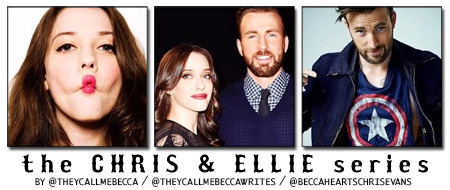
With Tumblr holding my original writing blog @beccaheartschrisevans captive (aka flagged as explicit), I have made a secondary writing blog and may end up closing the other all together. In the meantime, I am reposting all of my stories on my new blog.
Pairing: Chris Evans x Ellie Spencer (OFC)
Rating: G
Warnings: n/a
Summary: Chris celebrating his first father’s day
Disclaimer: This work of fiction is not to be reposted, used or translated without my permission.
Chris & Ellie Bonus Stories Masterlist | Chris & Ellie Masterlist

Father's Day 2019
June 16, 2019
Super Bowl LI was playing on the TV as Chris sat on the couch with four-month-old Tommy in his arms. Neither was really watching the game, instead Chris was watching his son pull on Dodger's ears while the dog sat next to them on the couch perfectly content. It was no secret that the dog loved the baby and had since they'd brought Tommy home from the hospital.
As Chris watched the dog and baby interact, he couldn't help but think back to this time last year. He and Ellie had been trying to get pregnant for over a year and a half without any success and had agreed to visit a specialist once they'd gotten back to Oregon after spending the summer in Massachusetts with his family. As luck would have it, however, a romantic getaway in England following the Avengers: Infinity War premiere had resulted in a positive pregnancy test about six weeks later.
In fact, Ellie had taken the pregnancy test on his 37th birthday and had told him that night once they'd returned to the small, basement apartment in his mom's house. They'd both cried happy tears and had decided to share the news with their family two days later, on Father's Day. They'd shared the news via a video call with her family while in the living room of his mom's house with his family. There had been lots of shouts of joy, lots of tears and hugs galore.
They'd spent the summer in Massachusetts as planned and then had spent the fall in LA while he'd filmed a movie. They'd traveled home to Oregon once a month to meet with her doctor and had returned to the state for good the week after Thanksgiving. (They'd celebrated the holiday in LA and his family had traveled to California to spend the week with them, taking their annual Disney trip a few weeks early and at Disneyland.) Christmas and New Year’s had been spent with Ellie's family in Oregon and they'd counted down the days until Robert Thomas's arrival.
Tommy had arrived a week and a half early on February 3 aka Super Bowl Sunday. He'd been the perfect baby, too. Chris had spent every day of those first two months with Tommy and Ellie, enjoying every second of being a dad, even on those nights where they hadn't gotten much sleep.
Then the mid of April had come and he'd had to leave for his final Marvel press tour. Ellie, Tommy and her family had traveled to LA with him and they'd all attended the movie premiere with him while Tommy had stayed with Ellie's aunt and uncle. Then Ellie and Tommy had traveled to Boston with Chris's family while Chris had started the international leg of the press tour.
They'd had nightly video chats while he'd been gone and had reunited three weeks later in New York City before he'd joined them at his mom's house for the summer. They'd been here for a month now and Chris had been taking the early morning shifts with Tommy so Ellie could go back to sleep after feeding the baby.
It was these quiet mornings with his baby boy that Chris loved the most. It gave them time to bond before they went upstairs to spend time with the rest of the family where Tommy was happily passed around and showered with attention. What they did during the time together depended on Tommy's mood. On mornings like this, where he was awake and giggly, they watched Patriots' football. Whereas, on the mornings where he was grumpy or still sleepy, Chris would cuddle him and either sing, read books or talk to him. During the last few weeks, they'd spent more time watching football than anything else. Or rather, Chris listened to football while watching Tommy interact with Dodger.
Wanting to document this special Father's Day, Chris set Tommy on the couch so he was propped up between the back of the couch and Dodger's torso. Grabbing his phone, Chris snapped a photo of his two boys, seconds before Dodger jumped up and began to lick Tommy's face. The baby looked startled at first, but then let out a delighted shriek which soon at Dodger barking happily.
"Shh," Chris said, chuckling as he darted his eyes over to the partially opened bedroom door. "You're gonna wake up mommy." He picked up Tommy and settled the baby back in his lap. Then, using one hand, he composed a tweet and shared the photo with his Twitter followers.
"Watching Patriots football with my little guy and our best friend on my first #FathersDay #FuturePatsFan"
He posted the tweet and then put his phone aside. He kissed Tommy's head and breathed in the unique baby smell. Sometimes, he couldn't wait for his little boy to get bigger, but he knew that someday he'd miss him being this little.
A loud "TOUCHDOWN!" startled both father and son and Chris grabbed his cell phone, knowing that it was the tone for Ellie sending him a text:
That last hashtag should say #Future12thMan
Chris chuckled at his wife's reference to the fans of the Seattle Seahawks and then said, loudly, "I thought you were sleeping."
Ellie appeared in the doorway to the bedroom, a second later, and was greeted by a squeal from Tommy. The baby began to squirm in Chris's arms as Ellie made her way over to the couch with the aging Daisy following her. The nine-year-old dog settled herself into her dog bed and ignored them all as she went back to sleep.
After passing the baby to his momma, Chris let his eyes wander over to where Daisy slept. He and Ellie had gone back and forth about whether or not to bring her with them this summer, but they'd ultimately decided they couldn't be without her; especially since she was already towards the end of her life. Other than aging joints, she was pretty healthy and he hoped she stayed that way a bit longer.
Of their pets, only their cat Mickey had stayed back in Oregon, as he did every summer. They'd adopted Mickey while they'd been in Georgia back in 2017 and the cat had not enjoyed the flight back to LA that fall and he had especially hated the drive to Oregon when they'd moved there. So rather than deal with a pissed off cat, they'd left him home with Ellie's cousin who was housesitting for them.
"Are you really watching this whole game?" Ellie asked, drawing Chris's attention back to the TV. "You're really going to make him suffer through three quarters of heartbreak?"
Chris glanced at her and could tell she was just busting his chops as she fought back a smile. If there was anyone who could appreciate the way the Patriots had come back to beat the Falcons, it was his wife. Nevertheless, he couldn't help but respond to her goading, "You have to watch the whole game. You can't get the full thrill of the win without it. It would be an 'that's awesome' as opposed to a 'holy sh-'" His voice trailed off as his eyes dropped down to the baby who was smiling up at him.
"Nice save," Ellie said, smoothing her hand over Tommy's hair. "As much as it pains me to do so, this was probably the most exciting football game I've watched."
"It's a Father's Day miracle!" Chris exclaimed, throwing his fist in the air. His excitement was contagious as Tommy began to shriek happily and Dodger began to bark. Reaching over, Chris tickled the baby's feet, making his squeals turn to giggles. Meanwhile, Dodger barked happily, his tail thumping against the couch cushions.
"You three are quite the comedy act," Ellie said, shaking her head. Looking down at the baby, she asked, "Should we go get daddy's present?" He babbled back to her. "Alright, we'll be right back."
Ellie carried Tommy back to the bedroom with Dodger following, the dog obviously not wanting to let his best friend out of his sight. Chris turned his attention to the TV and cringed as Tom Brady was sacked. He watched Atlanta score another touchdown before Ellie and Tommy returned to the room.
His wife had changed Tommy into a white onesie that had a bearded face printed on it and "I have a fuzzy daddy" written on it. Chris threw his head back and laughed.
"That's perfect," he told Ellie.
"We thought it was perfect, too," Ellie agreed. She then handed Chris a wrapped present and a card. "But here's your real present."
Going with tradition, Chris opened the card first and felt tears pool in his eyes as he looked at the homemade card. Ellie had turned a footprint and handprint of Tommy's onto a piece of paper and had turned it into a superhero by adding a face and hands. She had then printed "You are my superhero" on the card.
"This is amazing," he said, sniffing. Leaning over, he gave Ellie a kiss and then leaned down and kissed the top of Tommy's head. Settling back, Chris tore off the wrapping paper and opened a narrow box, pulling out a picture frame. Each of the six photo slots had a picture in it. There was a close up of Tommy sleeping, one of Tommy dressed in his Patriots’ onesie with eye black on his cheeks, a photo of Tommy in his Red Sox gear with Wally the Green Monster, one of Tommy wearing a Captain America costume that one of Ellie's aunts had made him, a photo of the three of them on the day Tommy was born, and a photo of Chris sleeping with Tommy asleep on his chest.
Chris didn't realize he was crying until he felt Ellie drying his face with her thumb.
"I love it," he said, looking at his wife through blurry eyes. "You've made this my best Father's Day ever." They both laughed at his lame joke. He moved so he could wrap his arm around her and then gave her a quick kiss on the lips.
Despite having a full day of family activities ahead of them, the three of them watched the rest of the football game. It was only after the final touchdown, however, that Chris and Ellie realized that Tommy had fallen asleep at some point.
"Told you he's going to be a future 12th man," Ellie teased.
Chris just rolled his eyes.

Want to find me off tumblr? I’m @beccatheycallme on twitter. I also post my stories on AO3.
My tag list is always open, just let me know if you’d like to be added!
#chris evans#theycallmebecca#beccaheartschrisevans#theycallmebeccawrites#chris evans fanfic#chris evans fanfiction#chris evans fan fiction#chris and ellie series#chris and ellie#chris evans x ofc#chris evans x original female character
16 notes
·
View notes
Photo
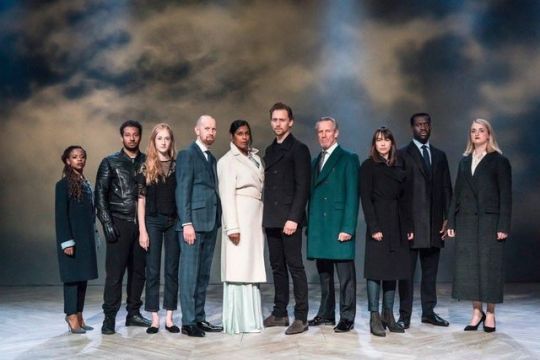
Tom Hiddleston is captivating in Branagh’s wonderful Hamlet
by Esther de Jong
This is my personal account of the RADA production of Hamlet, directed by Sir Kenneth Branagh and Tom Hiddleston as Hamlet. I’m not a reviewer, this is really just a random collection of my impressions of an amazing unexpected experience.So I went into the ballot for RADA’s Hamlet basically on impulse because of the fact I’d loved Tom Hiddleston in The night manager and the Marvel movies. And also because I miss the UK and thought it would be nice to see a play in London. I also figured because the odds were not in my favour: egh, what are the chances........Right...It looked like I was right when the first round of the ballot draw came back with a “we’re sorry you were unsuccessful’ email. Disappointing but not unexpected. They did mention something along the lines of: “oh there is a chance there will be a second round if not all tickets in this round get sold. But don’t count on it as the response was unprecedented.” The draw would be exactly a week later and I didn’t get any email on the date. However, the day after an email notification from RADA popped up on my phone. It started with: Congratulations, you were successful… and the message broke off as they do in those notifications. So I waited in disbelieve as the phone opened the email; and there it was; I had been successful in the second draw and was able to go online to get a ticket. The RADA website looked to have a difficult time dealing with the high volume of people logging on. The minute you clicked on an available seat a message would pop up that it had been taken. Heart in my throat I finally nabbed a front row, (although back of the stage but still) seat on a midweek performance. And then I did a slightly hysterical dance around the living room. I was going to see a favourite actor of mine play Shakespeare’s most famous character in a show directed by Sir Kenneth Branagh. In an incredibly limited run, where not even the theater critics could get tickets for unless they had entered the ballot.
This was going to be my first Shakespeare play live and I was apprehensive because I had tried to read it and frankly had trouble really understanding. The internet saved the day as I found a page that put the original text next to a modern interpretation. I’m so glad I read it that way before going to see it because it really aided in grasping the language better.The Jerwood Vanbrugh theatre is tiny, it’s in an oval shape with a quarter of the oval being the back of the stage, the rest of it runs in between the audience. You are on the stage with the actors, especially if you’re in the front row. I was on the last chair, closest to the back of the stage.Lights go out and I see a shape walk past me toward a small piano on the stage. The first thing we see and hear in this play is Hiddleston playing desolate keys on the piano, singing in a broken voice a text spoken by Ophelia later in the play. “And will he not come again”? (By the way, the score was excellent throughout the play)He leaves in the dark and the lights come up, really bright lights! This happens throughout the play, going from darkened with spot light for the individual soliloquy to lighting every corner. Claudius delivers a speech about having ascended the throne now that his brother King Hamlet is dead, seated behind a desk, signing a treaty and holding up the folder a la Trump. This draws the first laugh of which quite a few will follow in this surprisingly comedy laden performance.
Our first real glimpse of Hiddleston’s Hamlet follows and I’m all of a sudden very close as he enters the stage right, through a door in the set. His eyes are red and tears glisten. I can see that because I’m 2 meters away! Standing in the doorway, wearing a fitted dark coat he’s heartbroken, grief-stricken by his father’s death. There’s no blockbuster actor, or internet favourite to be found. He’s Hamlet and he’s that for the whole of the play. He’s riveting, you can’t not watch him when he’s on the stage as he is alternating between sad and playing the madness, funny and enraged. Switching between an array of emotions without taking a breather. Hiddleston makes it sound so easy as this 400 year old text rolls of his tongue. It’s mind-blowing to me. I wish I could go back and see it again because I feel like I missed so much the first time round. His energy is up all the way through, he crawls under carpets, runs around with a Danish flag as a cape and face paint on. He goes from quiet sadness to banging daggers on tables that make you jump in your seat. He twirls his fellow actor playing Rosacrantz around his waist (I kid you not!) Rock and Roll style and kisses Ophelia with quiet passion. You just don’t dare blink for fear of missing a beat.Now Hiddleston’s performance is captivating but the rest of the cast is equal to the task. All of them deliver a performance that is stunning, and well balanced. And sometimes just so darn funny! (it is a Tragedy after all...) Some of them taking on different parts as there are only 10 players. A few of the original male characters are played by women. It doesn’t matter. They tell a story I had trouble grasping but now am totally immersed in. And coming out of it with a new understanding and a thirst to see more, know more about Shakespeare.
I now understand that Shakespeare really needs to be seen and heard on stage. It doesn’t matter if you read all of his 37 plays. I only now got the essence of Hamlet’s story. Even though this is Branagh’s and Hiddleston’s interpretation, I finally got ‘into’ Shakespeare’s language because I had these wonderful artists take him on and giving me an amazing experience! Being so close to all the actors really gives it a different dimension. There were no microphones as their voices reached every corner of the space just fine. To hear “To be or not To Be” one meter away from me.... it might’ve ruined me for all future theater experiences :D. As is well known to most (if not: Spoiler alert!) it doesn’t end well for Hamlet and most of the characters. I had my heart in my throat for the last Act and as Hamlet lets out his final sigh I couldn’t help the tears. Sad for his story to end this way and simply overwhelmed by the experience and just not wanting it to end. But, like Hamlet’s famous last words:
The rest is Silence.
16 September 2017
130 notes
·
View notes
Text
Words and Fishes
I shaved my balls yesterday.
It had been a minute, and though they were far from resembling an overgrown jungle, they looked like they needed it. In another piece, I wrote about being a late-adopter of the manscaping trend. That’s still true, but adopting the trend didn’t mean that lost my humble southern Ohio roots in an abyss of personal hygiene and marketing tactics meant to make me marvel about how the trimmer I was using (which became conveniently outdated within weeks of my purchase) was so gentle to the touch, you could use it on a balloon animal without popping it. I took pride in coming to my ingenious realization to use the advertisements that came in the mail on Tuesdays and sometimes Wednesdays as mats to catch the trimmings instead of relying solely on the mats that came with my original order and trying to stretch them out as long as possible so I wouldn’t have to pay for replacements (if they’re even available).
As I carefully trimmed my way around my balls and the surrounding areas, I’d occasionally glance down at my improvised mats to gauge my results, as well as new towels, a shower curtain liner, and candle positioned throughout the bathroom. I thought about how it all started.
Words With Friends (WWF) is one of the few games I play. It’s a modern mobile take on a classic --Scrabble-- that allows me to flex and strengthen my vocabulary muscles. When I started in 2011, there was only one tile style, and there were no advertisements to stare through between games. There’ve been some moments I couldn’t believe I got such a high score with a single word or combination of words, but many more (thanks to the Hindsight power-up in WWF 2) when I shook my head at missed opportunities for more points. How could I have been so blind? The best play was right before my eyes.
I know games like WWF are designed to keep me hooked since Zynga has to feed their hungry application developers, but I recently got hooked in another way.
Ever the competitor, I hated losing, even at an inconsequential game like WWF. If I won a game because the other player had timed out, I didn’t feel like I’d earned it because both players hadn’t competed until the end. Who knows what he or she had going on in their life that prevented them from making their next move before the clock ran out?
WWF also has a chat feature you could use to talk with your opponent. I avoided using it for the longest time because for the first several years I played the game, I only played against people I knew in real life. One of my most common initial opponents was my aunt. For months, I beat her every time we played. I relished in kicking her ass all over the virtual game board, which became the biggest drain on my phone’s battery.
One day out of the blue, my aunt’s skill seemed to increase exponentially for no apparent reason. She was suddenly able to beat me (and handily so) three or four times in a row, which irritated me to no end. As quickly and inexplicably as her winning streak began, she stopped playing. The abrupt end to our battles pissed me off so much that I haven’t spoken to her about it since.
***
Eventually, I decided to take a chance and start playing WWF against random opponents. I don’t know if I was looking for a new challenge, or acting out because I couldn’t come to grips with the fact my aunt had finally beaten me. By this time, WWF had a Match of the Day feature that invited you to play against the kind of unpredictable opponent I was looking for. One day, I tapped on the thumbnail of a profile belonging to Kristina from Australia and started playing a game.
She played back fairly quickly and proved to be a tough opponent, winning three or four games for each one I won against her. Like I said, I hated losing. Even though my numbers weren’t great against Kristina, I kept challenging her.
Once, Kristina timed out (which usually occurs after about 10-12 days), giving me a win. I started another game against her. When she played back, I told her the same thing I’ve already told you -- I hate cheap victories that are a result of an elapse of time rather than a display of skill. She offered an apology that she’d been busy. I didn’t expect to hear from her again because the time difference between the Land Down Under and the Buckeye State is anywhere between thirteen and sixteen hours.
Not long after, she messaged me with a simple: “Hello David.” I replied in kind. We exchanged small talk for a few days. I remember wondering how someone who looked as strikingly beautiful as she did in her picture could be interested in talking to me. I told her I imagined she got all kinds of messages from guys all the time because of her good looks. She said she did, but she ignored most of them, adding that one guy asked her to marry him and be a mother to his three children. She declined and blocked him from contacting her, or so she said. Kristina even told me about a stalker who followed her around for a year before being caught. She said she’d never been so scared. Even though we’d never met, I felt genuine concern for her. No one deserves to be harassed by someone who isn’t honest about their intentions, someone who prefers instead to lurk cowardly in the shadows.
Another night, I messaged Kristina saying good evening Ohio time. She wrote back wishing me a good evening NYC (New York City) time. I thought she was just messing with me and I told her so. When I asked if she was visiting NYC, she told me she was living in Hartsdale, working on sponsorship from New York Medical Center (NYMC), and working at a hospital in White Plains. Kristina was very proud of the fact that she’d been selected from a field of three hundred applicants. She added that she’d come to America to get a fresh start after her marriage to her ex-husband Stuart had ended. Her four brothers, Garry, Steven, Michael, and Richard (her twin) drank beer on Scarborough Beach in solidarity with their sister when she’d decided to leave Stuart. She went so far as to say she’d be finishing her bridging visa in January, which would allow her to stay in the United States.
To the question of whether or not she had children, she said she had a daughter. My heart sank slightly because I was starting to feel a connection to Kristina sight unseen. I should have only wanted her Scrabble skills. I thought a child would only complicate things between us if we even got that far. Red flags were starting to pop up left and right, but I was already thinking with my little head. I had to ask, but I also should have known that most thirty-eight-year-old women (ironically, I was exactly two months older than Kristina) would have already had kids if they were planning on having them at all. I should have ended it right there, but Kristina explained that her daughter wasn’t her daughter. She and Stuart had adopted her, only to have her claimed by a biological aunt and taken to live in the United Kingdom.
Crisis averted, it almost seemed too good to be true.
***
I began to open up more to Kristina as the days turned to nights and back again. I told her about how much I loved my grandfather, she told me about her grandmother who lived to be 104 and gave up playing tennis only after falling and breaking her hip shortly before her death. I figured Kristina must have gotten her love of tennis (a sport I’d played as a child), swimming, and golf honestly. I shared with her that my grandfather had been more of a father to my brother and me than he ever should have had to have been, and he too had lived a very active lifestyle until congestive heart failure began to slow him down so much that even he could not fully recover.
She told me many times that she didn’t want gravity to take over as she aged. In reply, I’d point out that I had more to worry about than she did since I was exactly two months older than her. But, one thing I didn’t mention was that not wanting gravity to take over was the same rationale I’d been using for years when deciding to work out. I was afraid of turning into my dad, by which I mean having to watch my gut grow further and further past my belt until my waistline became nothing more than a proverbial line in the sand. A line I once said I’d never cross -- a line I’d move so far away from that despite a steadfast original promise to hold it, I could no longer see. Unlike my dad, I didn’t want to have to take a bag full of medications just to stay alive, even though I’d truly given up on life a long time ago.
Not long after our grandparent conversation in the WWF chat, I began to trust Kristina enough to share some of my writings with her. I can’t remember if we were talking about how emotion and intent aren’t always conveyed well in text messages, or how I’d never quite mastered the use of emojis. Either way, something inspired me to share Ite, emoji est with her. If you haven’t read it, it’s the story of my eggplant emoji fiasco. She laughed hysterically and told me about the eggplants in her vegetable crisper. Kristina said that thanks to me, she’d never look at eggplant the same way again. For an instant, I thought it was odd that she had eggplants readily available. Most people probably don’t keep eggplants on hand. Still, I didn’t think twice about it until much later.
If my ill-advised emoji choice ruined eggplants for the both of us, Kristina didn’t let that stop her from sharing stories of her mishaps. Once, she told me she’d spilled hot chocolate all over the white nightgown she was wearing as she sat in front of the fireplace. Another time, she told me she dropped a fish filet on her foot, but it still ended up in her tummy. I found it odd that she would still eat something after having dropped it, but I dismissed this a personality quirk of hers. I was becoming convinced that she was a klutz, just like me.
Over the next few weeks, I’d discover that clumsiness was one of many traits and/or experiences Kristina and I had in common. I know now that I should have seen all of these commonalities (she’d grown up Catholic like me, her father had been a cop like mine) as significant red flags instead of opportunities to bond with her. At the time, I was too thrilled to meet someone with whom I shared so much to put an abrupt end to our interaction. If I’d known what was to come, I’d wish I had.
One morning, I asked Kristina if there was anything she’d always wanted to try. Her response was skydiving. I said I wanted to dance the tango. We shared visions of tandem jumps and tango lessons. She said she had a red, thigh-high slit dress exactly like one the tiny emoji woman who was always ready to dance in my phone wore. Kristina said Richard had once dropped her while they were doing the tango, so I had to promise to be careful with her. I imagined our two bodies melting into one; our hearts pounding and sweat dripping in unison. I couldn’t wait to feel the shape of her body beneath her dress as we glided together across the dance floor. She purred at the thought of me in a tux.
The more intense our conversations became, the more I entertained the idea of communicating with Kristina outside of the game. I offered her my phone number because it’s a man’s job to move things forward. She didn’t call or text me. Yet another red flag. I wondered if I’d blown it or gone too far since she didn’t reciprocate. In retrospect, this was another chance to walk away from her that I didn’t take, however obvious it was that I should have. I either couldn’t or chose not to see what was going on because I was too grateful for the attention of a beautiful woman read: thumbnail that I would have otherwise considered out of my league and never approached in real life.
Around Christmas, she told me her co-workers were beginning to notice a change in her and surmised that she must be in love. The women wanted to know all about her mystery man; the guys wanted to know what I had that they didn’t. “Personality” was her answer. The rum balls she made for the office Christmas party were a hit. She was the only person I’d ever met apart from my mother who made them, and she admitted to being a piggy when it came to eating them. It seemed our connection was deepening over most trivial things, which made it so much more powerful. I never told her that one holiday season while I was living in Serbia, my mom made rum balls and mailed them to me. I was so happy that I posted a picture of them on Facebook.
One morning, Kristina messaged me saying she had feelings for me and didn’t know what to do with them. Somehow, she said, I’d managed to knock down the walls she’d been building around her heart since she left Stuart, and she’d never felt the same way about another man that she felt about me. She couldn’t figure out how she’d fallen for me. Despite her curiosity, she promised she wouldn’t scroll back through our WWF chat to find out. She closed our exchange of messages that morning by saying that she wanted me to make love to her.
***
I thought this was a great idea. Still, I couldn’t rest on whatever virtual laurels I thought I’d won by having her suggest lovemaking. Instead, I used whatever literary skill I thought I had to paint verbal pictures of the two of us together. I had neither the stamina, nor the potential STDs of a porn star (Kristina was oddly forthcoming about both her lack of STDs and disdain for condoms. Red flag... Red flag...), but I was genuine in my expression of my desire to truly explore her, ravish her, and ejaculate as a choice rather than a punchline. Episodes of our chat became increasingly sexually explicit, both of us contributing content. Sexual tension even spilled over into our WWF games, both players passing up points to play erotic words or make references emotionally charged content of speech bubbles hours or minutes past.
It was wonderful to finally connect with someone on not just a thumbnail but an emotional level. I never told her about my mild Cerebral Palsy, but when she told me she dreamed of specializing in orthopedics, I was convinced I’d found a keeper. I would never immediately volunteer my disability status to a potential partner. Yet I’m sure that somewhere in the darkest corners of the Internet, there are Pickup Artist forums that discuss tactics guys with disabilities can use to get girls. I can see thread now, with posts by guys with usernames like CPaul or DysplasiaDarryl:
Tell a girl about your autobiography, Limp: The Story of My Life. Joke about how you were referring to your leg, not your dick. Ask if she wants to see. If she asks which one or gets the Iceberg Slim reference, assure her your third leg works just fine. If she refuses to investigate on her own, she wasn’t for you anyway. She’s probably a slut who imagines herself having high standards. The girls you really want will get dripping wet at just the thought of being with an artist.
I didn’t think any tactic would have worked on Kristina anyway. Why would I have used something as hollow as a few canned lines or routines with her anyway? She’d have seen right through it all. Besides, I didn’t need to. I’d won her over naturally. My disability was the result of something that happened to me a long time ago. There was no need for me to be angry about it, or keep it locked away like some kind of dark secret. How I chose to handle it would say more about my character than any reaction of hers ever could have. At the end of the day, I didn’t think she would care, so why should I?
Mom and I spent Christmas Eve and Christmas Day at my brother and sister-in-law’s house. She wanted to be there to watch my niece and nephew open presents before Christmas became less magical and more an opportunity for awkward family photos. I can’t say I blame her. After all the gifts had been opened, my niece repeatedly tried to break a board she’d gotten as a training tool for martial arts; my nephew rotated between riding his new bike around the house and nearly flying his new drone into the oven any time it was open. Mom milled about the kitchen, offering to help my brother and sister-in-law prepare a meal.
As for me, instead of spending time with real people, I’d steal away into an adjacent room to check my phone every time it buzzed. I was less concerned with making moves in WWF than I was with seeing if Kristina had messaged me. I felt bad that she couldn’t spend Christmas with her family. Her mother died when Kristina was three, her father had passed away more recently; her brothers were on another continent. Each time checking my phone revealed a message from Kristina, I felt not only validation but strength. She wasn’t the only one who’d built walls around her heart that were beginning to crumble.
***
I couldn’t believe my good fortune. I’d finally connected with someone smart, sexy, athletic, and perhaps most importantly a deep thinker. Kristina was reflecting so much on our future together that it’s almost as if she knew how to put my mind at ease before I could even get nervous. Sure, I was a bit taken aback by her insistence on how clean and STD-free she was, but that was only one instance in which she was all too willing to share. For example, I’d always heard that people who have more money than they know what to do with are usually very quiet about it, especially if it’s family wealth that’s grown with them for generations. So, when Kristina volunteered that she was financially secure, I was surprised, slightly skeptical, but most of all curious.
To hear her tell it, her father (who’d given up his career as a cop for one as a farmer) had accumulated a fortune buying and selling horses. He’d subsequently done very well for himself with stocks and investments, leaving Kristina and her brothers shares upon his death. In terms of which stocks or investments, she only mentioned Bitcoin, which she was able to sell before its value crashed, and an Australian Super Fund, which she claimed had once earned her $81,000.00 in three weeks. At the end of the day, she said, she could afford never to work another day in her life if she so chose. I had a hard time wrapping my Southern Ohio barely-middle-class head around the numbers.
A woman with no kids or STDs who’s both secure and interested in me? It seemed too good to be true.
Despite babies spitting and old men hitting on her, Kristina told me how grateful she was to the staff of NYMC for their hospitality and all she’d learned. Sure, she occasionally had drug seekers tell her to go back to Australia after she’d refused their requests, but her boss had been accommodating enough to actually allow her to go back to Australia when one of her brothers had gotten into an accident two years ago. They’d told her to take all the time she needed.
As much as she loved NYMC, Kristina admitted that she didn’t like New York City very much. She said she was willing to come to Columbus to build a future with me beyond tango and skydiving lessons. As our plans to meet cam closer and closer to fruition, I realized certain aspects of my lifestyle could use upgrade. This is when ordered manscaping tools, cologne, a candle, and a new shower curtain liner. I didn’t stop there. I added new pillows, pillowcases bath towels, and bathmats. I’d be lying if I said these purchases weren’t made at least partially with Kristina in mind (I wouldn’t want to explore a forest, so she shouldn’t have had to either), but they were also very much needed upgrades, no matter how much she’d become my weakness and I’d become her strength.
The Hugo Boss cologne I chose had hints of orange peel and bamboo for Christ’s sake. The “Sexy Man” candle supposedly also had the aroma of a man’s cologne. Kristina said she was curious to find out what the candle smelled like. Unfortunately, we’d never get to make that discovery. I received neither the cologne nor the candle in the mail. On the day they supposedly arrived, I got an email from UPS with a picture of both items in front of my door. But, when I got home from work that night, they were nowhere to be found. The UPS driver who’d delivered them came out to my place the next day asking where I’d looked for my packages. He advised me to file a claim with UPS. UPS in turn advised me to file a claim with Amazon and try to get my money back.
As luck would have it, I got through to an Amazon customer service representative about seven minutes too early the following Monday. Initially, I was told I had two options. The first was to have replacement items sent to me, the second was a refund. Of course I wanted replacements I said. I had to have masculine fragrances to balance out the intoxicating scent of the $29.99 Ambrosia perfume Kristina said she’d be wearing. She’d let me guess which part of her body she’d place the fourth drop of perfume on. She’d promised to leave a bottle at my place to remind me of her. She’d bought lingerie for my eyes only that the store employee told her she was born to wear. She’d told me she slept naked even though I didn’t ask (though she wondered how much sleep we’d be getting). I had a lot riding on this. Could replacements be sent to me?
No.
Since I’d called before 4 P.M. Pacific time (it was 6:57 P.M. ET by this point), my only choice was to a refund. I ended up ordering cologne and bath towels through one of Amazon’s competitors.
***
Even having Kristina in mind while I was trying to make these upgrades was a mistake, but I was acting according to The Awful Truth of where a man’s heart is truly located and giving her credit for things she didn’t earn. For instance, I told her that I had no concerns about her because we’d taken “precautions” even though we’d never met, or video chatted. In reality, we hadn’t done shit but type messages back and forth.
I mentioned that in my experience, fraudsters we usually very demanding, aggressive, and single-minded. They want what they want and they don’t stop until they get it. As proof, I offered my experience with a WWF player who’d messaged me a few days ago, before I even had a chance to accept her invitation to play. That player wanted to know if I was single right off the bat. She demanded that I give her my phone number so we could text, be friends, and maybe more. I blocked her almost immediately. In response, Kristina asked if she was too friendly. “No. You’re just right,” I replied. Goldilocks would have thrown up in her mouth. I was too deeply under the influence of Kristina’s digeridoo siren song to care, and she knew it.
After the first of the year, we transitioned to chatting on Google Hangouts. I sent her a recent photo and asked for one of her in return. She sent me what she said was her most recent one, in which she had long brown hair, dark brown eyes, and wore a white suit. Even though the photo didn’t look anything like her thumbnail form WWF, it did make fa perfect headshot for a medical professional in New York City. As for my photo, she said I had a kind face.
I may have had a kind face, but I never saw Kristina’s real face. She would call me through Hangouts, as she once did even while locked in the morgue, hiding from an active shooter (all the more reason to get out of New York City, she said), but our calls were voice-only. As for photos, she sent me only two more throughout our entire conversation. One was of her dog Buddy, who despite his Australian origins, had once been quarantined for eight hours at the Perth airport when they’d arrived home from the United Kingdom. The other was of her when she was about twelve. She was hanging upside down in a tree, a huge smile on her face.
Kristina gave me the impression that having four brothers made her bit of a tomboy, meaning whatever her brothers did, she did too. It didn’t matter whether they were hanging upside down from trees, or servicing cars. She could do it all. I was falling for her more and more each day. Whenever my phone buzzed, my heart leaped. I didn’t mind the startling lack of visual evidence that she was the woman in the white suit. Sure, she told me videos wouldn’t play on her phone, but I could hear it occasionally buzzing, and birds occasionally beatboxing in the background, when we spoke. We were going to be together. That was all that mattered.
So deep was her commitment to me, our commitment to each other, that she not only vowed to find a job in Columbus (she sent me a screenshot of a job posting at Wexner Medical Center she intended to apply for), she also turned down an offer of a salary increase to stay at NYMC that was more than what I make in a year. She’d even found a house of us to live in and made plans to take her citizenship oath in Cleveland during the weekend of February 19th. I made sure to schedule that weekend off (who knew how much sleep we’d be getting) and introduce her to my mother.
Before any of that could happen, we had to meet for the first time. We made plans to finally connect in person over the Martin Luther King, Jr. Day weekend. She’d even found us a house in Victorian Village (a four-bedroom palace by my standards) that had been built in 1900. She’d pay cash for it of course, and we’d figure out a way to pay off my lease so we could live together. She’d be a doctor and I could quit my job at the bank for a career in freelance copywriting. In the evenings, we’d alternate between dancing the tango and chasing each other throughout the house in various states of undress.
After years of false starts and failures with the opposite sex, my ship was finally coming in.
***
Somehow, Kristina managed to schedule her job interview at Wexner Medical Center and a showing of the house on the same day. I couldn’t be with her since I couldn’t get time away from work on such short notice, but she messaged me once she was back in New York saying that the interview had gone well. They’d agreed to let her have a month off (she suggested we vacation in Hawaii during that time). Her first day would be February 24th, which would line up nicely with what I’d planned to be my last day at the bank, March 1st.
She also said she had a new set of keys in her hand. The wire transfer to purchase the house (list price: $539,000.00) had gone through without a hitch. I’d made sure to have Kristina confirm the wiring instructions verbally with the recipient before sending the money. I didn’t want the woman I loved to be scammed. The house was hers free and clear. She could have both something she wanted (a pool, for only $20,000.00) and something she didn’t (a mortgage).
I was as over the moon as a reserved yet intensely passionate person can be.
In a not so simple twist of fate, Kristina called me the morning from New York. There had been an accident.
Garry had called to say that Richard had been driving in Red Hill (a suburb of Perth) when another driver, who’d gone fishing for their fallen cell phone, rear-ended him. The guy who caused the accident wasn’t seriously injured. Richard, on the other hand, had a broken leg and a collapsed lung. She’d be leaving New York for Perth that night, with a layover in Dubai (another potential vacation destination we’d discussed).
“Do you want to come to Australia with me?” She asked.
Kristina was willing to call Emirates and book tickets for both of us. She wanted to check with me first. Martin Luther King, Jr. Day was fast approaching, but Australia wasn’t a continent I could visit over a three-day weekend. Kristina was disappointed yet understanding. The boxes she’d packed in preparation for her move to Columbus would have to spend several New York minutes in solitude while she traveled to be with her brothers, Richard’s wife Michelle, her niece Bianca (who was the same age as my niece), and the rest of her family. My heart didn’t quite break for her, but cracks appeared. Both of her parents were deceased, now her twin was clinging to life. How much more unlucky could she be?
***
I was sad that I couldn’t see her, but our plans were becoming more specific with each passing day, almost scarily so. There was no question that they were worth waiting for. I’d waited 38 years for Kristina, what was another 10 days?
We’d talked about getting married in our new house, in front of a small group of friends and family. Privately, I hoped my friend Matt, when he finally met Kristina, wouldn’t embarrass me too much with ill-timed disability jokes, but I was bracing myself for the inevitable on more than one front. I’d told Kristina there was no need to spend $6,000.00 on a wedding dress like she did when she’d married Stuart. Even though I had the impression that money was no object to her, I figured the biggest thing she’d be spending money on was travel expenses. Bianca had asked her auntie Kris if she could come to the wedding. Auntie Kris did not object.
We even planned on starting a family. Kristina said she’d been met with surprise from a fellow doctor when she approached them about having a Mirena (inserted into her uterus to guard against pregnancy. I supported her decision and remembered how she’d told me she didn’t like condoms as she reminded herself to breathe during our sexually-charged WWF chat sessions. As far as I was concerned, her body was exactly that. It wasn’t my place to tell her what to do with it. She took it a step further, however, as only she could.
If she had the Mirena removed after a year, would I be opposed to having a child? Of course not, I said. Her voice nearly cracked with joy. I could almost feel the tears running down her face. She’d later tell me of a dream she had in which she was breastfeeding our son, Alexander David when he wrapped his hand around my index finger as I passed by.
Her reaction to our agreement to have a child was as extreme as her dreamy description of breastfeeding, but I didn’t chide her for it. Not my place. After all, it wasn’t the first time she displayed a penchant for the outliers of affection. She loved to send me YouTube videos others had made of love letters to their one and only. You know, the ones where the letters of each word come across the screen one-by-one, with some incredibly cheesy song playing in the background. She sent me a clip of a couple dancing the tango (of course), and the official music video for How Do I Live by LeAnn Rimes, yet another way of reminding herself to breathe.
Though I loved her no less, I sent her only two videos. One was the Raymond K. Hessel scene from the movie Fight Club, in which Tyler Durden challenges Raymond to begin living his life according to his dreams instead of quitting whenever things got too hard. I told Kristina that I tried to live (though I didn’t always succeed) with the same sense of urgency Raymond displayed as he left his apathy behind and ran down the street toward the best-tasting breakfast of his life. Kristina said the scene was scary, and I was nothing like Raymond. She always seemed to know the right thing to say.
The second video was a performance of Nature Boy by Nat King Cole. I’d come to admire the song because I’d heard it many times through the years on my favorite Serbian radio program, Peščanik. Nature Boy had always reminded me of the hundreds if not thousands of hours I’d spent listening to Peščanik to improve my language skills and knowledge of current affairs in the former Yugoslavia. Now, the lyrics had another layer of meaning:
There was a boy A very strange enchanted boy They say he wandered very far, very far Over land and sea A little shy and sad of eye But very wise was he
And then one day A magic day he passed my way And while we spoke of many things Fools and kings This he said to me The greatest thing you'll ever learn Is just to love and be loved in return
The greatest thing you'll ever learn Is just to love and be loved in return
Like I said, what was another ten days?
***
The situation on the ground was worse than anticipated by the time Kristina arrived in Perth. Richard’s lung hadn’t just collapsed, it had been punctured. There was a serious question of whether he’d be able to breathe on his own. Kristina said the driver who caused the accident had been arrested and charged with manslaughter. If that wasn’t enough, she’d had a tense encounter with his sister when she came to the hospital to check on Richard.
As the only medical professional among the five siblings, Kristina had been given the unenviable task of deciding whether to keep Richard on life support or give him a chance to breathe on his own. Even though we were on opposite sides of the globe and dealing with a thirteen-hour time difference, it was hard for me to focus at work. I was constantly checking my phone while at my desk at work, whether I’d heard the buzz of an incoming message or not. My heart raced every time I opened my phone case to illuminate the screen. Getting caught looking at my phone on the production floor could have meant a serious rebuke from management if the wrong person caught me on the wrong day.
I didn’t give a shit.
Someone I loved was hurting. I knew where my priorities were. I knew I would only be with the bank a short while longer (even if no one else did) before Kristina and I started our life together. The last eight years wouldn’t be easy to brush aside. Still, the chance to live in a beautiful house with a beautiful woman, and pursue a copywriting career seemed too good to pass up. I was willing to trade the certainty of the present for my dreams of an uncertain future. Tyler Durden gave Raymond K. Hessel six weeks to get on his way to becoming a veterinarian. If he didn’t, Tyler said, Raymond would be dead. In the real world, March 1st was almost exactly six weeks away.
I’d need no such warning; I’d gotten this far by not heeding warnings.
The next morning (Ohio time), Kristina called me and said Richard had squeezed her hand while she sat beside him in his hospital room, but there was still a long road to recovery ahead. I was no medical professional like Kristina, but I was hopeful this was a positive sign. I didn’t know the man, but I’d looked forward to meeting him ever since Kristina said Richard would be stopping to visit us in our new house after taking care of business in California. She spoke so lovingly of him. I’d always heard twins had a special bond. They were no exception.
She spoke lovingly of me to her brothers too. Kristina said they had come to believe that I must be a hell of a guy if I could make their sister feel the way I did by knocking down the defenses so firmly-entrenched around her heart. She said that in her brothers’ eyes, I’d come a long way from being just a random person she’d met playing a game (a game!) on her phone; someone who could have been a rapist. Kristina made me feel like I was becoming part of their family.
The next morning, I woke to a heart-wrenching message from Kristina. Richard hadn’t been able to breathe on his own and had died as a result of his injuries. Kristina agonized over having made what she said was the wrong decision. I did the best I could to console her from half a world away. I’m not sure how much help I was, but my heart was with her even though I couldn’t be. The time and distance between us meant we couldn’t be together to mourn Richard’s death and celebrate his life. As much as it hurt for us not to be together. Kristina did have one request of me, a request I was happy to oblige: She asked me to pick. the flowers for Richard’s funeral the following Thursday.
I chose pink roses because I felt they were unique. I’d never heard of a funeral with pink roses before. After I’d communicated my decision, Kristina sent me an image of a pink rose, saying she’d bought 300 of them. She promised to make sure everyone knew they were my contribution to the occasion. Since she’d be giving Richard’s eulogy, she’d have ample opportunity to do so.
About two days before the funeral she called me saying that that they’d had a least a hundred people at what had been her childhood home to celebrate Richard. Her father had sold some of the properties the family owned before he died, but her brother Michael still lived in what had been Kristina’s childhood home. Michael suggested Kristina take one of their father’s cigar boxes as a memento, but she was content to leave it where it was.
She took the same approach to her childhood bedroom, which she’d left largely untouched since moving out years ago. Amazingly, she still had a doll of Gizmo from Gremlins, which her father had taken her to see in what probably felt like another lifetime. I admired how she managed to look back at her past and forward to our future. Her family wanted her to stay longer than she’d planned after the funeral, but they understood how much she just wanted to be with me. It seemed “I just want to be with you” was a phrase she repeated every chance she got. I’d be lying if I said I didn’t feel the same way.
***
Kristina called the morning of Richard’s funeral (Australia time) understandably a mess. She and Michelle were about to head over to the church. She said she didn’t know how she was going to make it through without me. I offered the best encouragement I could, told her I loved her (I did), and asked her to be strong. I spent the entirety of my shift at work that day physically in the Buckeye State, but mentally in the Land Down Under. Kristina said she’d try to get in touch with the guys who were supposed to drive her stuff from New York and see if they could meet her in Columbus. We knew she’d be exhausted if she had to drive to Ohio almost immediately after spending 30 hours (she’d gotten a hotel room for the six hours she’d be spending in Dubai) in transit from Western Australia, but it was a price we were willing to pay.
What was waiting for another four days to be together compared to the rest of our lives?
Kristina called me the next morning to say that she almost didn’t make it through Richard’s eulogy. She had to be emotionally and physically supported by her brothers as she bid farewell to her twin. She said she thought about me as she spoke, and she’d gotten a lot of compliments about the pink roses.
She also gave me the impression that it’s customary for people to speak out at funerals in Australia. Her boisterous cousin Anthony, who asked Kristina to “Show us your tits!” a few days earlier (in reference to when she was 16 and her bikini top came off at a swimming pool), wanted to know all about her plans with her “Yankee man” in the middle of the service. I couldn’t help wondering if Kristina had told everyone about our agreement: her bikini top would be entirely unnecessary whenever we were in the water together. I knew those inquiring Aussie minds were so far away from me that our toilet water didn’t even flow in the same direction when flushed, but my face turned as red as the bikini bottom I’d imagined Kristina wearing as we kissed, buoyant beneath the moonlight of the hot Australian summer, her top long ago discarded, floating unattended and aimless on the other side of the pool.
By Friday, Kristina was in the air, and I was making final preparations for her arrival. After the false start of Martin Luther King Jr. Day weekend, I was convinced nothing was going to stop us this time. She’d already worked her final shift at NYMC, and said her toughest goodbyes. Among these was Simon, an eight-year-old with Leukemia who was not long for this world. I’d told Kristina I had a Buckeye necklace she could give to him as a way to both remember her and think of her new life in Ohio. Still, she’d placed serious doubt in my mind as to whether or not he’d live long enough to wear it. At that moment, I’d thought of a quote I’d attributed to Athletic Shorts, a collection of short stories by Chris Crutcher, who I’d met at the American Corner in Novi Sad years ago:
If you want to make life important, shorten it.
I’d always liked that one, even if I hadn’t always lived by it. Kristina and I were about to leave our pasts behind and live fully in the now, however exciting, intoxicating and scary it may have been. The pillow on the left side of my bed, the one she’d chosen, wouldn’t be empty much longer. I had Monday, January 27th off, and hoped to need it after a weekend of little sleep.
***
On Saturday, I made a trip to TJ Maxx. I was looking for a new pair of jeans to wear when I saw Kristina for the first time. As excited as I was, I hadn’t shared in her wealth yet, so I still didn’t want to break the bank. I chose a dark wash that I could wear with anything. I was feeling good about myself when I remembered something I’d learned in Serbia that had nothing to do with athletic shorts: You should never show up at someone’s house for the first time empty-handed.
I already had a cutting board shaped like the state of Ohio that I’d bought at the same place I got the bathmats. I thought it was such a unique idea because it served two purposes. One was in the kitchen, the other was in geography. It was supposed to a a cool way to introduce Kristina to the what, where and when of my home state.
Fresh jeans around my left forearm, I almost got in the checkout line. I was inches from crossing the point-of-no-return barrier that separated the checkout line from the rest of the store when a horrible thought occurred to me. I needed to bring Kristina something to eat. I turned around a ventured into a section of TJ Maxx unspoiled by humans. There was no one around me for ten feet in any direction. Intentionally or not, I was practicing social distancing in a pre-Coronavirus lockdown world.
I saw it when I found a few shelves of snacks, oddly placed there in its box between some graham crackers and a jar of Nutella. It might as well have been a resident of the Island of Misfit Toys, or a sickly puppy from a shelter that nobody wanted because you couldn’t say for certain whether or not it’d be dead in three weeks. In other words, it was exactly what I wanted, what I needed: baklava.
Who the fuck buys baklava at TJ Maxx?
***
I didn’t notice the small details of my new jeans until I got them home. The phrase LUCKY YOU was sown on the placket (a word worth 18 points in WWF) were sown on the placket. There was also a small piece of paper the looked like a fortune from a fortune cookie in one of the pockets. It read: Today is the first day of one wild ride. Lucky # 10, 23, 30, 35, 59, 11. “Kristina is going to love this,” I thought.
Late Saturday night, Kristina messaged me saying she was back at her duplex in New York. Her crystal was all boxed up and her co-workers were running out of time to interrupt our conversations by knocking on her door and begging her to stay. Two guys would be there to start the trip to Columbus with her at 10 A.M. Sunday morning. She’d had to pay extra for them to work on Sunday, but who cared? I didn’t. She certainly didn’t. Money can do lots of things when it’s no object.
The only catch was that one of the guys didn’t have a Driver's License, so Kristina would have to drive her black Ford Focus while the two guys manned the truck. The guys were slow at loading Kristina’s things onto the truck, so they were behind schedule by the time all three hit the road, but Kristina was on her way to me nonetheless.
I’d message her about every two hours to see how far along they were. I paced nervously around my apartment all day because I couldn’t hold a thought in my head. All I wanted to do was step out from behind my phone’s keypad and ravish Kristina in real life. She was so close I could almost taste her.
I’d thrown caution to the wind a long time ago, but I still had some lingering doubts. Like I said, we’d never video chatted, so I’d never seen her face when she wasn’t posing for a picture. I couldn’t find her anywhere on social media. Reason, aka the voice in my (big) head that screamed “Abort! Abort!” had passed out drunk for the last time after too many nights of partying with his false friends Raw, Dick, and Imagination.
***
If anything, the huge plot holes in our love story made my attraction to Kristina even stronger. In my mind’s eye, I saw this woman I had never met as the anthesis of the look-at-me/outrage/cancel culture that screams the loudest in America today. Kristina was the opposite of my oops-my-pussy-is-showing roommate Dragana from Enter the Dragana. We talked about books and fitness instead of counting followers and likes. Kristina had even signed up to volunteer with me at a tennis clinic for kids with Down’s Syndrome. I knew then that her heart was as big as her wallet.
She didn’t need the attention that Dragana craved. At the very beginning of our connection, Kristina had asked me if I had any other women in my life. I asked her the same question about other men. We both answered no. She said my lack of other women was a good thing; the only things she didn’t like sharing were her men and her chocolate.
Somehow, I managed to get a bit of sleep Sunday night, but it came only after I read that Kristina had arrived safely in Columbus. The movers had even helped her unload her car.
Monday morning, I messaged Kristina asking how she was feeling after spending the night in our new house. She replied that she’d woken up in the middle of the night and didn’t know where she was.
After everything she’d been through in the past two weeks, who could blame her?
As I had the day before when she was traveling, I messaged her about once every two hours to see how she was doing. I didn’t want to come across as needy, but I couldn’t help myself. I thought I’d found love, something I’d convinced myself didn’t exist. I wanted to dance the tango with Kristina and promptly rip the red thigh-high slit dress, gorilla costume, or whatever she was wearing off of her. I was convinced she wanted the same and nothing was going to stop us.
***
As hours passed without a message from Kristina, the fears I’d hidden away, buried, or just flat-out ignored from the moment she said said, “Hello David” came creeping back. Around 3:30 that afternoon, I knew I had to do something. I had to know the truth. I requested a Lyft and entered as my destination the address where my new life was supposed to begin. I put on my new jeans, placed the baklava in a reusable shopping bag with the Ohio-shaped cutting board, and waited.
Five-star Jeff came pretty quickly. We talked about what we both did outside the car as we made our way down to the house. Twenty minutes felt like all the games Kristina and I had played, plus the two months we’d spent talking, all rolled into one.
I lied to Jeff for no reason other than it was easy; I told him the contents of my shopping bag were housewarming gifts for friends of mine who were new in town. “Yeah. She’ll be starting a job at Wexner Medical Center next month. They gave her a month off to acclimate herself to her new surroundings. Can you believe that shit?”
I noticed something odd when we pulled up to the house, but I lied again and had Jeff pull over to wait for me in case they weren’t home, even though I instantly knew they wouldn’t be.
A burgundy-colored For Sale sign was still in the front yard.
I silently cursed myself for not having listened to the less-hornier angels of my nature. I felt like I was going to vomit burgundy-colored blood all over five-star Jeff’s floorboards. I liked Jeff, but I couldn’t let him know how badly I’d been played, or all that had led up to what he’d just witnessed. I needed to get home before I could even think of letting my feelings show. At that moment, Jeff was the only other human being on the planet who knew where I was, even if I’d lied about why he’d taken me there.
I walked up the steps and sheepishly knocked on the door. Ringing the doorbell would have been much easier, but my stomach was doing somersaults. I fully expected a classic fat-chick catfish reveal like so many I’d seen on television, but there was no moment of truth, no dramatic confrontation. After five minutes of tense anticipation that quickly morphed into oh-shit-what-if-someone-really-lives-here paranoia, I went back to Jeff’s SUV and explained that they must not be home, so I’d like to go back to mine.
After Jeff dropped me off at my place, I messaged Kristina that I needed to talk to her and it was important. I made sure to include two of the kissy-face emojis that had become ubiquitous in our exchanges. As many times as I tried to send the message, the reply was always the same: Sending failed... tap to retry. I knew I’d been had, but the enormity of both what she’d done to me, and what I’d allowed her to do, didn’t really hit me until I emailed her in a last-ditch effort to tell her something she already knew: I couldn’t reach her through our chat. After I hit send, I finally let my heart sink among the crashing waves of anger, sadness, regret, and self-loathing that had been battering it all day.
David played “why” for ten points.
The pillow on the left side of my bed is still empty when I wake up in the morning. Instead of a four-bedroom house, I still live in my one-bedroom apartment. The walls are so thin that I once heard one of the two homosexuals who live adjacent to me tell someone on the other end of the phone that they could tolerate lemon pepper seasoning in their food if they didn’t know it was there, but foreknowledge of its presence was a deal-breaker.
The things you do for love.
It may not be a reality dreams are made of, but at least its real, and it’s mine.
0 notes
Text
Sparkle Unicorns And Fart Ninjas: What Parents Can Do About Gendered Toys
With Rainbow Butterfly Unicorn Kitty on one side and bulbous-headed Fart Ninjas on the other, the gender divide was impossible to avoid at the North American International Toy Fair in New York City back in February.
The light-up Barbie mermaids vying for space with Gatling-style foam-dart blasters in Manhattan’s Javits Center raised a question: Have toys really progressed since our grandparents’ days? And how do the toys we play with shape the people we grow up to be?
We set out to answer these and related questions in our latest episode of Life Kit’s podcast Parenting: Difficult Conversations, with help from Sesame Workshop.
Toys are getting more gendered
Researcher Elizabeth Sweet studied toy catalogs and ads over time and found that toys are actually more gender divided than they were half a century ago.
Rebecca Hains, a professor at Salem State University in Massachusetts, has written a book about it: The Princess Problem: Guiding Our Girls Through The Princess-Obsessed Years.
Disney characters, she points out, used to be more diverse: There was Cinderella, sure, but also Pinocchio and Bambi. When 1989’s The Little Mermaid made a splash, Hains says, “Disney realized profitability in girls.” Enter the juggernaut Disney Princess brand. Plus, marketers now cloak even gender-neutral toys like blocks in both primary and pastel shades in the hope of selling more sets.
Even with several women vying to be the United States’ next president, and even with a greater awareness of the spectrum of gender identity than we’ve ever had in our culture, Hains says, “it’s almost like kids are subject to stereotypes that we’ve evolved out of elsewhere.”
And these stereotypes can stick.
In a 2013 study of undergraduate women, one-third identified themselves as “princesses.” They placed a higher value on the physical attractiveness of a mate, were less likely to want to join the workforce after college and were more likely to say they wanted to marry a breadwinner. And when all the women were given puzzles to solve, the “princesses” quit faster.
(This study, a conference paper, is described and cited in this paper, co-authored by Sarah Coyne, which similarly showed that girls who preferred playing princesses showed more gender-stereotyped behavior a full year later.)
Researchers haven’t proved that all little girls who like tutus will grow up to be entitled quitters. But play does prepare children for life, so boys and girls both need broad options, says Rosemarie Truglio, a developmental psychologist and vice president of education and research for Sesame Workshop.
“It’s OK for me to like pink things and pretty things and frilly things, but it shouldn’t define who I am and shouldn’t define what I will be in the future,” Truglio says. “Anyone who is singly defined doesn’t make a really interesting person.”
Here are our takeaways for how to handle toy problems.
1. Bans will backfire — no pun intended.
You can certainly outlaw a toy that makes you uncomfortable, but consider this:
“I don’t think banning anything is the answer,” Truglio says. She found this out the hard way as a mom herself. At first “we had the rule: No [toy] guns in our home,” she says. But she realized that all her young son’s friends were playing with them, typically in the hallway of their apartment building.
Group play and the friendship that comes with it are so important for kids, Truglio believes, that she decided to allow the toy gun, with conditions. Besides, if you say no, the odds are that the toy will become even more coveted, she says.
2. How they play is more important than what they play with.
No toy is inherently good or wicked, says Lisa Dinella, a gender studies professor at Monmouth University and co-author of the aforementioned 2013 princess study. With a gun, “you can be really, really aggressive, or you can just be shooting targets.” Equally, a princess game could be all about being pretty, or it could have a sophisticated plot.
One red flag, Truglio says, is when there’s no variety to a child’s play. For example, if your child wants to play with only toy guns, and the play is always aggressive, then that could be a sign for you, as a parent, to step in and find out what’s really troubling the child.
3. Parents can counter sexist messages.
Dinella says kids start learning gender stereotypes before they’re out of diapers. “Between 18 months and 2 years is the first time we’re starting to see their awareness.”
They learn by watching us. Studies show that parents perceive newborn girls as more delicate and newborn boys as being stronger. On the playground, mothers intervene with girls, seeing physical risks, more often.
“So it’s really hard to separate out toy preference from gender socialization that is so insidious,” Hains says.
Dinella has done several experiments on how heavy gender branding influences kids’ toy choices. In one, she and her team painted a bunch of toys white. Without color cues, both boys and girls gravitated toward neutral playthings like Play-Doh and the Etch A Sketch.
In another experiment, titled “Pink Gives Girls Permission,” Dinella and her co-authors flipped the traditional color patterns: pink trucks and camouflage-clad baby dolls. She found that “there’s a bigger barrier to boys playing with girl things and acting like girls than for girls to be able to venture into some of these cross-gender plays.”
Dinella says you can see this inequity in how hard our culture still comes down on the little boys who love princesses and sparkly things.
This is too bad, she says, because toys can teach important and sometimes unexpected skills. Dolls prepare boys for future roles as fathers and help them practice empathy. Acting out a tea party can help children learn “cognitive sequencing of events: the beginning, the middle and the end of a task.” In other words, a tea set can introduce one of the foundations of computer coding.
So Dinella suggests that, when toy shopping, strive for gender balanced as well as gender neutral. Try saying something like, “You have four dolls already, so how about … also getting a truck?”
Or, “Can we get it in the white version so that all of the kids, when they come to our house, can play with it, instead of just the pink version?”
4. Talk to your kids directly, and share your values around toys.
Dinella is also a mother, and she didn’t ban toy guns either. But she does let her children know that she’s not wild about them. “I’m never going to say, ‘Hey, we haven’t played with the Nerf guns a lot lately! Let’s get those out!’ ”
In other cases, she says, you can be more direct. “You can say, ‘This dress-up toy that was given to you, although it’s really sparkly … it does really talk to you about being pretty. And I would rather you spend time trying to get smart.”
5: Join in your child’s play to further expand the possibilities.
If a foam-dart shootout is getting out of hand, ordering the combatants to timeout isn’t all that effective, says Truglio. Instead, “maybe you take on a character role … who is going to stop this type of aggression.”
Hains tells the story of a father who played princesses with his daughter — but would get out the firetruck and send the princesses out on rescue missions.
The good news is that we may be getting a little more help these days from pop culture. Characters like the powerful Elsa, the adventurous Moana, Wonder Woman and the new Captain Marvel, played by Brie Larson, are pushing the envelope for female heroines.
Another of Dinella’s studies suggests that they are having an impact. She asked preschoolers — both boys and girls — to describe themselves and also to describe what they knew about princesses. Not surprisingly, they described princesses as the typical girly girl who needs to be rescued.
Researchers then showed the children video clips of more recent princesses, like Merida from Brave, taking action and being powerful. Then they asked the same questions again.
Watching those images changed the children’s perceptions of princesses, and, Dinella says, it changed kids’ own self-descriptions too.
After seeing princesses being powerful, both the girls and the boys described themselves as more multidimensional: “They [would] say: ‘I am strong. I am powerful. I am a leader.’ But also, ‘I am caring, and I share.’ ”
In other words, when kids anywhere on the gender spectrum spend time with characters who are more complex, it can change the way they see themselves.
Truglio sums it up this way. “Kids play what they see. If you can see it, you can play it — then one day you can be it.”
Copyright 2019 NPR. To see more, visit https://www.npr.org.

Sparkle Unicorns And Fart Ninjas: What Parents Can Do About Gendered Toys published first on https://dlbusinessnow.tumblr.com/
0 notes
Text
Sparkle Unicorns And Fart Ninjas: What Parents Can Do About Gendered Toys
With Rainbow Butterfly Unicorn Kitty on one side and bulbous-headed Fart Ninjas on the other, the gender divide was impossible to avoid at the North American International Toy Fair in New York City back in February.
The light-up Barbie mermaids vying for space with Gatling-style foam-dart blasters in Manhattan’s Javits Center raised a question: Have toys really progressed since our grandparents’ days? And how do the toys we play with shape the people we grow up to be?
We set out to answer these and related questions in our latest episode of Life Kit’s podcast Parenting: Difficult Conversations, with help from Sesame Workshop.
Toys are getting more gendered
Researcher Elizabeth Sweet studied toy catalogs and ads over time and found that toys are actually more gender divided than they were half a century ago.
Rebecca Hains, a professor at Salem State University in Massachusetts, has written a book about it: The Princess Problem: Guiding Our Girls Through The Princess-Obsessed Years.
Disney characters, she points out, used to be more diverse: There was Cinderella, sure, but also Pinocchio and Bambi. When 1989’s The Little Mermaid made a splash, Hains says, “Disney realized profitability in girls.” Enter the juggernaut Disney Princess brand. Plus, marketers now cloak even gender-neutral toys like blocks in both primary and pastel shades in the hope of selling more sets.
Even with several women vying to be the United States’ next president, and even with a greater awareness of the spectrum of gender identity than we’ve ever had in our culture, Hains says, “it’s almost like kids are subject to stereotypes that we’ve evolved out of elsewhere.”
And these stereotypes can stick.
In a 2013 study of undergraduate women, one-third identified themselves as “princesses.” They placed a higher value on the physical attractiveness of a mate, were less likely to want to join the workforce after college and were more likely to say they wanted to marry a breadwinner. And when all the women were given puzzles to solve, the “princesses” quit faster.
(This study, a conference paper, is described and cited in this paper, co-authored by Sarah Coyne, which similarly showed that girls who preferred playing princesses showed more gender-stereotyped behavior a full year later.)
Researchers haven’t proved that all little girls who like tutus will grow up to be entitled quitters. But play does prepare children for life, so boys and girls both need broad options, says Rosemarie Truglio, a developmental psychologist and vice president of education and research for Sesame Workshop.
“It’s OK for me to like pink things and pretty things and frilly things, but it shouldn’t define who I am and shouldn’t define what I will be in the future,” Truglio says. “Anyone who is singly defined doesn’t make a really interesting person.”
Here are our takeaways for how to handle toy problems.
1. Bans will backfire — no pun intended.
You can certainly outlaw a toy that makes you uncomfortable, but consider this:
“I don’t think banning anything is the answer,” Truglio says. She found this out the hard way as a mom herself. At first “we had the rule: No [toy] guns in our home,” she says. But she realized that all her young son’s friends were playing with them, typically in the hallway of their apartment building.
Group play and the friendship that comes with it are so important for kids, Truglio believes, that she decided to allow the toy gun, with conditions. Besides, if you say no, the odds are that the toy will become even more coveted, she says.
2. How they play is more important than what they play with.
No toy is inherently good or wicked, says Lisa Dinella, a gender studies professor at Monmouth University and co-author of the aforementioned 2013 princess study. With a gun, “you can be really, really aggressive, or you can just be shooting targets.” Equally, a princess game could be all about being pretty, or it could have a sophisticated plot.
One red flag, Truglio says, is when there’s no variety to a child’s play. For example, if your child wants to play with only toy guns, and the play is always aggressive, then that could be a sign for you, as a parent, to step in and find out what’s really troubling the child.
3. Parents can counter sexist messages.
Dinella says kids start learning gender stereotypes before they’re out of diapers. “Between 18 months and 2 years is the first time we’re starting to see their awareness.”
They learn by watching us. Studies show that parents perceive newborn girls as more delicate and newborn boys as being stronger. On the playground, mothers intervene with girls, seeing physical risks, more often.
“So it’s really hard to separate out toy preference from gender socialization that is so insidious,” Hains says.
Dinella has done several experiments on how heavy gender branding influences kids’ toy choices. In one, she and her team painted a bunch of toys white. Without color cues, both boys and girls gravitated toward neutral playthings like Play-Doh and the Etch A Sketch.
In another experiment, titled “Pink Gives Girls Permission,” Dinella and her co-authors flipped the traditional color patterns: pink trucks and camouflage-clad baby dolls. She found that “there’s a bigger barrier to boys playing with girl things and acting like girls than for girls to be able to venture into some of these cross-gender plays.”
Dinella says you can see this inequity in how hard our culture still comes down on the little boys who love princesses and sparkly things.
This is too bad, she says, because toys can teach important and sometimes unexpected skills. Dolls prepare boys for future roles as fathers and help them practice empathy. Acting out a tea party can help children learn “cognitive sequencing of events: the beginning, the middle and the end of a task.” In other words, a tea set can introduce one of the foundations of computer coding.
So Dinella suggests that, when toy shopping, strive for gender balanced as well as gender neutral. Try saying something like, “You have four dolls already, so how about … also getting a truck?”
Or, “Can we get it in the white version so that all of the kids, when they come to our house, can play with it, instead of just the pink version?”
4. Talk to your kids directly, and share your values around toys.
Dinella is also a mother, and she didn’t ban toy guns either. But she does let her children know that she’s not wild about them. “I’m never going to say, ‘Hey, we haven’t played with the Nerf guns a lot lately! Let’s get those out!’ ”
In other cases, she says, you can be more direct. “You can say, ‘This dress-up toy that was given to you, although it’s really sparkly … it does really talk to you about being pretty. And I would rather you spend time trying to get smart.”
5: Join in your child’s play to further expand the possibilities.
If a foam-dart shootout is getting out of hand, ordering the combatants to timeout isn’t all that effective, says Truglio. Instead, “maybe you take on a character role … who is going to stop this type of aggression.”
Hains tells the story of a father who played princesses with his daughter — but would get out the firetruck and send the princesses out on rescue missions.
The good news is that we may be getting a little more help these days from pop culture. Characters like the powerful Elsa, the adventurous Moana, Wonder Woman and the new Captain Marvel, played by Brie Larson, are pushing the envelope for female heroines.
Another of Dinella’s studies suggests that they are having an impact. She asked preschoolers — both boys and girls — to describe themselves and also to describe what they knew about princesses. Not surprisingly, they described princesses as the typical girly girl who needs to be rescued.
Researchers then showed the children video clips of more recent princesses, like Merida from Brave, taking action and being powerful. Then they asked the same questions again.
Watching those images changed the children’s perceptions of princesses, and, Dinella says, it changed kids’ own self-descriptions too.
After seeing princesses being powerful, both the girls and the boys described themselves as more multidimensional: “They [would] say: ‘I am strong. I am powerful. I am a leader.’ But also, ‘I am caring, and I share.’ ”
In other words, when kids anywhere on the gender spectrum spend time with characters who are more complex, it can change the way they see themselves.
Truglio sums it up this way. “Kids play what they see. If you can see it, you can play it — then one day you can be it.”
Copyright 2019 NPR. To see more, visit https://www.npr.org.

Sparkle Unicorns And Fart Ninjas: What Parents Can Do About Gendered Toys published first on https://greatpricecourse.tumblr.com/
0 notes
Text
2016 Movie Year in Review
All the 2016 movies I saw, ranked from worst to best, with superlatives in the end.

Notes:
1. I apologize for some of these reviews being half-assed. I went a bit overboard with this and at a certain point just wanted to be done.
2. Thank you for reading this. Even if you don’t read it all, just pretend that you did and tell me how great I am. I love validation.
3. If you disagree with any of my reviews, please tell me, so I can explain precisely why your taste is shit. I also welcome regular discussion.

91. Diablo – In what was a recurring theme in 2016, I saw this under-the-radar Western despite its’ shitty reviews. I was never one to let critics influence my own opinion on something, and I figured that Scott (son of Clint) Eastwood’s Western debut with a supporting performance from personal-fave Walton Goggins couldn’t be that bad. Well, if it’s completely forgotten about and accomplishes nothing else (it already has been and it doesn’t), “Diablo” shows that even the majority of people can sometimes be totally, totally right.
This film is about a young Civil War veteran whose sexy wife gets kidnapped and he goes out on a journey to rescue her. Along the way, we start to realize that the motivations in the kidnapping and the rescue aren’t so simple, etc. The premise is decent and it starts out well (with one hell of an entrance for Eastwood’s character) but the longer the movie goes on, the exponentially faster it falls apart.
This is one of the most poorly-made and ineptly-written actual movies I’ve ever seen. It’s kind of like an Ed Wood flick minus the schlocky charm. None of the characters in this movie act or talk like actual human beings. It’d be surreal if it felt intentional. I’ve written better screenplays on toilet paper, and I don’t mean with a pen. The dialogue is awful and often goes nowhere, the direction is confusing, guns are shot with zero recoil (a personal trigger for me, no pun intended), the acting (even from good actors like Goggins and Danny Glover) sucks, the plot twist is retarded and obvious from a minute into the movie, and I’m willing to bet that even the catering for this film wasn’t that great either.
If Scott Eastwood wants a future in Westerns (or movies in general), I would ask/bribe/intimidate everyone who saw this film to sign a non-disclosure agreement, which shouldn’t be hard since so few people saw it. “Diablo” has nice intentions, but intentions will only get you so far when everyone involved in the creative process is so inept at their job that they make Sony/Warner Bros. executives look almost competent. It’s would all be hilarious if it wasn’t so damn dull. It feels a bit mean giving my bottom spot to a tiny, independent movie with almost no release when there’s plenty of studio-produced garbage to choose from (more on that shortly), but trust me, even in a shitty year for film like 2016, “Diablo” deserves it.
Nice cinematography, though.
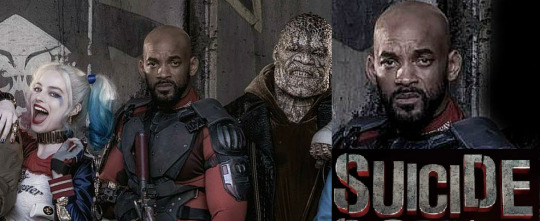
90. Suicide Squad – I’m probably going to spoil parts of the movie here. I also probably won’t proofread this review after I finish writing it. I don’t care, honestly, because just thinking about the aptly-named “Suicide Squad” makes me lose the will to live.
I went into this film expecting it to be garbage even before the negative reviews started pouring in. When I heard that Warner Bros. were planning massive reshoots and rewrites to “make the movie more light-hearted”, a million red flags went up for me. It’s one thing to add in a few additional shots or lines, but WB wanted to fundamentally alter the film’s DNA, while still retaining much of the original footage. The result isn’t so much a new film but rather two films horrifically Frankensteined together, not unlike last year’s “Fantastic Four” (how’s that for a comparison?) The first half is atrocious. It’s just a series of introductions to the main cast that all feel like badly-edited music videos. EVERY. GODDMAN. SCENE in the first half of the movie has some really out-of-place popular song that is not only groan-inducing but also doesn’t fit the tone of the scene in most cases. Slipknot doesn’t even get one of these introductions (not that it matters much since he’s killed off about 10 minutes after we first meet him). His intro amounts to another character saying the funniest line of the movie; “That’s Slipknot. He can climb ANYTHING.” Whoa, watch out for this bad motherfucker.
I don’t know how much of this you can blame on the reshoots, but the plot is fundamentally retarded, as well. Putting aside the basic idea that the contingency plan for a rogue god-like superhero is just a small team of criminals with guns and melee weapons, only two of whom have actual powers, the story progression beats are just plain dumb. The main villain is an all-powerful witch that was supposed to be on the squad but escapes because the government was very lenient in looking after her. Upon being rescued, Viola Davis’ government higher-up kills her subordinates because they “didn’t have clearance” or something like that, even though it was literally their job to help her run everything. At one point, the Joker shows up, takes Harley Quinn away from the squad, only to crash and die (but not really), and she just returns a minute later. In wanting to show his trust, the soldier in charge of the Squad smashes his explosion-app phone, and allows them to leave if they want to. In the ONLY genuinely funny moment in the movie, comic relief character Captain Boomerang wordlessly gets up and leaves. In a move I will never forgive Warner Bros. for, he just returns unceremoniously a minute later (there might be a boomerang joke there, but that’s giving the script too much credit). During the climax, the Squad has a fight with the witch, during which no one even gets hurt so it feels pretty pointless, before she says to stop and tries to coax them into joining her by making them envision and promising them their greatest desires (once again wasting the character’s potential, Captain Boomerang’s is never shown).
The characters might have been the saving grace, but they are all handled incredibly poorly. Despite being “bad guys” (which they verbally remind each other and the audience throughout), they are more like quirky Guardians of the Galaxy-esque heroes, spouting quips and doing the right thing even when it’s against their supposed nature. El Diablo makes sense, as he’s trying to repent for his sins, but why do the rest of them have morals? Why, during Diablo’s story about how he accidentally killed his family, does Harley Quinn un-ironically give him a “how could you do such a monstrous thing?” reaction. What little character development any of them have feels rushed and/or forced, where by the end they are willing to sacrifice themselves for each other and calling themselves a “family” despite having only met a few hours earlier and only exchanged a few quips here and there. Where they could have made genuinely interesting characters by making the main-characters actual villainous anti-heroes who act against the government even while working for them, Warner Bros. just made them typical Marvel heroes, spouting typical Marvel quips while killing typical Marvel cannon-fodder enemies and trying to close a typical Marvel sky portal that can destroy the world or whatever it was supposed to do, except doing it all worse. It doesn’t help that Captain Boomerang, Killer Croc, Katana, and even Joker are all useless and have literally no practical purpose for being in the plot.
How do you fuck up a movie so badly that even Will Smith can’t save it? Smith is one of the few good things about this movie, basically playing his typical leading-man Will Smith persona but he’s so charismatic and likable that you can’t help but feel bad for him for being in this dreck. The rest of the cast is a mixed bag. Margot Robbie has the potential to play a good Harley Quinn, but none of her jokes work (a combination of her delivery and the awful script) and as mentioned before, she’s written to be way too sympathetic. Jai Courtney (Boomerang) had the career-first potential to be good here, but is barely used and what little comic relief he provides is squandered. Adewale Akinnuoye-Agbaje (who I was actually looking forward to in this movie) has only like 6 lines as Killer Croc underneath all that makeup, and all of them make him sound like a black stereotype; as a favor for accomplishing the mission at the end, he asks for BET in his cell, which is a step above asking for fried chicken and grape-drank, so at least there’s that. The guy playing El Diablo is alright. The actors playing Col. Flagg and Katana are forgettable. Oscar-nominee Viola Davis is actually pretty bad as the government head of the squad, looking bored throughout and giving stilted line-deliveries while failing to be intimidating. Cara Delevingne (in her witch form) looks and talks like a particularly poorly-written Game of Thrones character, and is probably the least intimidating villain I’ve ever seen in a comic book movie. Ben Affleck is in the movie for like, a minute. That’s all there is to him.
And how can I forget Jared Leto’s performance as Joker? No seriously, how? Please tell me. He decided that playing the most famous bad guy in comic history would be to act like a Tourette-afflicted edgy teenager who rebels against his upper-class parents by shopping at Hot Topic. At least he was entertainingly cringe-worthy, unlike most of the movie, which is just the regular kind. Who knows, maybe in all that cut footage of him lies a good performance or character arc, but he seems less like a demented criminal mastermind and more like the type of person who would giggle maniacally to himself after tearing the tag off of his mattress. Also, if there’s a word for the introduction version of an anti-climax, Joker’s first appearance in the film is exactly that.
In summary, the acting ranges from decent to bad, the characters are weak, the writing is abysmal, the plot is nonsensical, the tone is all over the place, the music choices are head-drillingly irritating, the action scenes are dull to the point where I zoned out quite a bit during them, and all-in-all a movie that should’ve been stylish and cool is just drab and embarrassing. I know that director David Ayer is better than this (and that he didn’t even have any say in the final edit) and I’m sure there’s a decent cut of this film somewhere, so instead of blaming him I’m going to blame Warner Bros., a studio that gives Sony Pictures a run for their money in terms of sheer incompetency. They’re in such a hurry to catch up to Marvel that they forgot to properly set up their universe and don’t even have a clear vision for what they want to accomplish, story-wise. Say what you will about the MCU and how formulaic a lot of their movies are, but at least Kevin Feige has a vision for his series and makes it work. WB saw the less-than-ideal performance of “Batman v Superman”, panicked, and butchered Ayer’s film to try and make it appeal to as many people as possible, ultimately appealing to no one.
Hell, give Zack Snyder the reigns to the DCEU. He’s not without his flaws, but he’s the closest thing to an auteur working in superhero films today and he’s infinitely more competent in telling a story than the hacks who edited the “Suicide Squad” I saw in theaters. Who is the real Suicide Squad? Is it the team of “bad guys” in the movie? Or is it the audience who is forced to endure this piece of shit? If there is justice, it will be the executives at Warner Bros. who should be forced by shareholders to commit ritualistic suicide live on The CW following “Arrow”
Or just punched in the stomach.
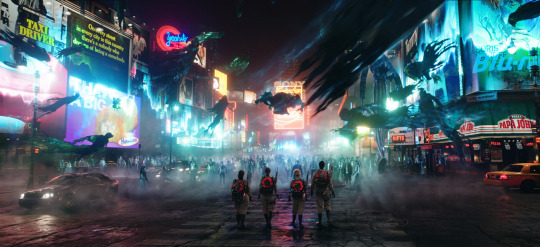
89. Ghostbusters – A “Ghostbusters” reboot is the most politically divisive film of 2016. It’s things like this that make me wonder if we’ve lost our way as a culture. Why people got so up in arms over the casting is beyond me. Personally, I think that anyone who condemns or praises a film solely because of the sex of its leads should be sterilized. But for months ahead of release, I saw almost nonstop articles, Tweets, and arguments about “misogyny” and “the patriarchy” and “raped childhoods” in regards to a silly comedy about people who hunt ghosts, and I started to wonder if it was actually a bad thing that the Chinese will soon take over the West (not that the Chinese would ever allow this film to be released, because Commies are afraid of ghosts or something like that).
It should come as no surprise to anyone with the slightest bit of rationality and foresight, however, that all this controversy would amount to nothing because the film is just a dull, unimaginative slog. I was expecting the movie to be shit because writer/director Paul Feig is a hack who never should have moved past television comedies, and Sony Pictures is a major movie studio run by a bunch of chimps with Down’s Syndrome, and apparently I’m better at pattern recognition than most. But honestly, I can’t even get worked up about “Ghostbusters” because it was just so boring. It never reached the point of being offensively bad like “Suicide Squad”, but this movie doesn’t really have anything going for it either. The lead actresses are fine, and could do well if they had some decent material to work with, but they aren’t funny enough to carry a very improv-heavy feature length film by themselves. A good improvised bit can be like a nice sprinkling of cinnamon on a tasty dessert, but “Ghostbusters” felt like eating several spoonfuls of cinnamon straight from the container. This felt like a modern-day SNL sketch arduously stretched out to two hours.
The improv could have worked if the leads had actual characters to work with, but each one is given just one personality trait (Leslie Jones is scared, Kate McKinnon is koooooky, Kristen Wiig is insecure, and Melissa McCarthy is…there), and they often break their trait for their banter where they constantly try to say funny things and tell jokes, making them feel like a bad college comedy-troupe instead of actual characters. Paul Feig didn’t even bother with any character development; just one forced scene where the animosity between Wiig and McCarthy’s characters, that’s forgotten within 15 minutes, is finally brought up again in the last 5. After a point, I started to feel bad for the cast. I know that McKinnon, Wiig, and McCarthy can do better than this (and have), and even Leslie Jones (who was the worst part of the trailer but is surprisingly the only likable and believable character in the film) deserves more than what she’s given. The only somewhat funny character was the mayoral aide who privately supports the team while publically insulting and condemning them.
As with Paul Feig’s other films, the plot is thin as can be (four women team up to investigate ghosts, start their own business, and before you know it, all hell breaks loose), and it feels very disjointed, with a lot of scenes feeling like they could be put in different orders and it wouldn’t make a difference. As a result, the film fails to properly ramp up in terms of stakes and motivations. There are set-ups without payoffs, and payoffs to things that were never really set up. And of course Feig can’t shoot action or comedy for shit, to the point where even a gifted physical comic like McCarthy looks like she’s lightly swinging at air in her fight scenes. He also clearly misses the R-rating he’s had so far in his feature films, where the lack of jokes is exacerbated without the crutch of swearing to lean on. Plus, as typical of a Sony Pictures movie, there’s enough forced product placement on display to make Michael Bay blush.
The lowest points of the film are the cutesy references to the original film and cameos from the original cast, with the absolute nadir being a scene with a Bill Murray who looks like he’s wondering if it’d be faster to run away from the film set (that he was sued into being on) or to slit his own throat. This just points to a studio product that plays it so safe and close to the original that it doesn’t have any identity of its own, and funnily enough, the gender-swapping of the lead roles is the only decent idea it has to differentiate itself.
As I said before, this wasn’t terrible or painful to watch (possible because I was already detached very early in the movie, but still). I got two chuckles, one from Jones and one from Chris Hemsworth, and a handful of snorts here and there. The CGI, sets, and prop-design are all colorful and surprisingly solid. But the overall movie is just mediocre and a chore to sit through. I normally don’t write lengthy reviews for comedies because there are only so many ways to say something isn’t funny, but the 2016 “Ghostbusters” just isn’t funny, and all the controversy that was brewed up (it wouldn’t surprise me if Sony manufactured the hateful reactions to the trailers themselves to drum up publicity) ultimately led to another one of the same bland, cash-grab remakes that Hollywood has been pumping out for the last several years. Now I may be a sexist, chauvinistic white cis-het misogynist shitlord, but I think the movie-going public deserves better than this, even those dumb bitc…[REDACTED]

88. The Neon Demon - A 16-year-old girl moves to LA to become a model, and finds quick success due to her good looks (and we know she looks good because none of the other characters, including her, ever stop mentioning it), but soon after finds herself succumbing to her own hubris and the jealousy of those around her. That’s literally the entire plot of the movie, minus some of the dirty specifics. Then again, you don’t see a Nicholas Winding Refn for the plot. As can be expected from any of his post-Drive films, characters speak very obvious dialogue with remarkably long pauses, they stare off into the distance a lot (even when just looking into a mirror), jarring ultraviolence occurs, and pretty red-and-blue lighting abounds.
I found NWR’s particular brand of violent, brightly colored autism amusing up to a point, but after a while, it became increasingly grating. Part of that is that the movie as a whole just feels kind of pointless. Thematically it’s quite obvious; the modeling world exploits young women, and said women are also jealous, catty bitches (at least, that’s the impression I got from Refn). But why the fuck is this movie two hours long? So much of the film is just NWR indulging in all of his trademark filming techniques at the expense of making interesting characters. Yes, there are plenty of striking visuals with their fair share of obvious symbolism, but that’s pretty much all there is to it. Much of the movie is filmed like a modeling session or a runway show (which is probably intentional), but there comes a point where you just want to shout “YES, I GET THE GODDAMN POINT, ALREADY.” After about an hour in, I just wanted it to end and couldn’t really care about what happened next. In what seemed like an attempt to rope me back in, the last 40 minutes or so is when the twisted and violent stuff starts happening, but I was less shocked and more annoyed and disgusted by what I was seeing.
The cast is alright, I suppose. The performances from Bella Heathcote and Abbey Lee as the two models that become jealous of the main character are fun and biting. Keanu Reeves is surprisingly entertaining as a sleazy motel manager. As much as I hated that one particular scene with Jena Malone (you’ll know it when it happens), I commend her for being so committed to her performance to actually pull that scene off. Everyone else kind of just occupies that NWR character spectrum that exists somewhere between ethereal and autistic (leaning much closer to the latter in this film).
I hate it when people say the stuff I dislike about a movie is done intentionally. Was my boredom intentional? If, however, the prospect of having Nicholas Winding Refn slowly jerking himself off in your face for two hours while maintaining unblinking eye contact with synth music playing in the background sounds like your cup of tea, then “The Neon Demon” will satisfy your unusually specific fetish, you weirdo.
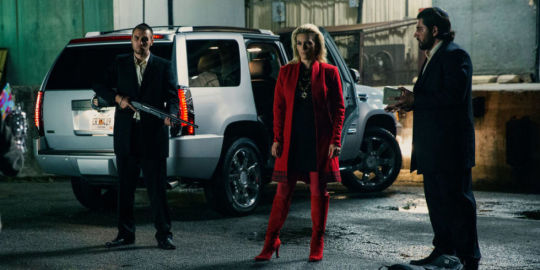
87. Triple 9 – Have you ever seen an urban police drama? Congrats, you’ve already seen “Triple 9”. Basically, there is a squad of crooked Atlanta cops who plan to rob a government building with some criminals in order to appease a mob wife (hammed-up by Kate Winslet in what could possibly be her first bad performance), and they aim to simultaneously stage the murder of a fellow cop across town so there would be little resistance during their robbery. There are ride-alongs, roughing up of suspects, lots of swearing, drug use, betrayals, etc. Pretty much every “gritty” urban crime movie cliché since the ‘90s is in this film, and very little of it is interesting. The movie only really comes alive during its action sequences. The opening bank robbery and mid-film raid especially are expertly crafted and are genuinely exciting. However, they (and a wonderful little cameo from Michael K. Williams) are the film’s only highlights, and the only other thing “Triple 9” is noteworthy for is having such a talented cast and wasting them on such been-there-done-that material. It’s not an ordeal to get through; it holds your attention and it’s thankfully not as edgy as I feared, but between the dull plot, lame dialogue, and unlikable, two-dimensional characters, “Triple 9” is more of a Single 5 (out of 10).
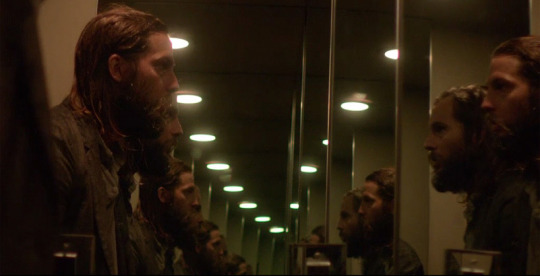
86. The Invitation – A man named Will, who looks like a cross between Jesus and Tom Hardy, brings his new girlfriend to a dinner party set up by his long-estranged ex-wife and her new husband. Things start to get weird when they begin talking a lot about a spirituality group they’re a part of, and Will’s paranoia over their strange behavior is made worse when all of his friends seem to accept it with no problem. I went into watching this movie with little to no expectations, and those expectations were steadily raised by the performances and direction, and it all got pissed away at the end. For a while, it seemed like a really good drama with a genuinely interesting exploration of grief, but without spoiling anything, in the third act it became the EXACT movie I was really hoping it wouldn’t become. I’m sure most people won’t have the problem with this movie that I did, and the good actors and Karyn Kusama’s strong directing (she expertly builds tension and creates a great sense of space) keep it going for the most part, even despite how dumb and illogical a lot of the characters are. But I was just so disappointed by the schlock it became that it just left a bad taste in my mouth. Accept this “Invitation” if you want, but I’m staying home instead.
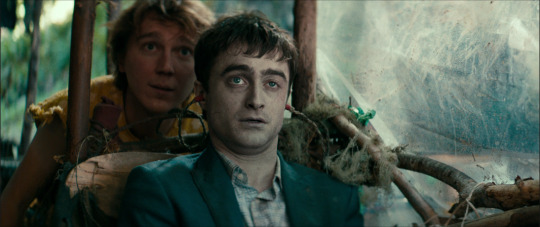
85. Swiss Army Man – Look, I give it points for originality, but this was never going to be my kind of movie. It’s the kind of premise and cast (Paul Dano uses Daniel Radcliffe’s magical farting corpse to get back to civilization while learning about life) that seemed destined to be “baby’s first high-concept indie film”. I saw it because I wanted to give it a chance anyway, and while it’s not without its merits (a good deal of creativity, two committed performances, and plenty of visual flair), the endless grossout humor, montages, and really ham-fisted explanation of themes and character development wore me down to the point where I just didn’t care by the end. I would have liked for the movie to have a more straight-faced approach to the situation, which I think would have underlined the absurd humor present. Instead, we have the kind of ironic whimsy one would get if they saw a bunch of Spike Jonze and Michel Gondry films and completely missed the point. I also would have liked a darker and more realistic ending, one that would actually feel like a culmination of the themes of loneliness and isolation the movie wouldn’t shut the fuck up about. As you might have guessed, the tone is all over the place, too.
If you like this movie, that’s fine. But “Swiss Army Man” is certainly not 2deep4me, and if there is any point I missed in watching it, I don’t care enough to re-watch it. Someone told me that a lot the things I found annoying about this film are intentional. Well, intentionally annoying is still. Fucking. Annoying.
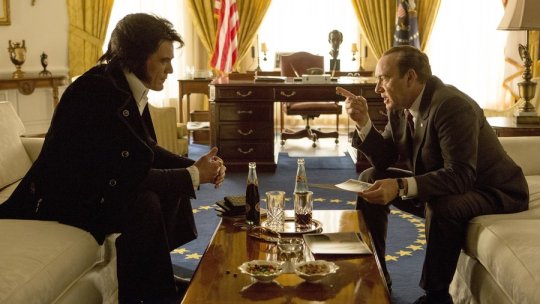
84. Elvis & Nixon – The premise for this movie is really neat. On a December morning in 1970, Elvis Presley strolls up to the White House to request an emergency meeting with Richard Nixon and convince the President to swear him in as an undercover agent, leading to one of the most famous photos in U.S. history. The execution: not so great. The main problem is that the actual meeting is only the last 15-or-so minutes of the movie. The lead-up involves Elvis and his manager’s efforts to actually set up the meeting with Nixon’s staff, while Nixon is hesitant about allowing it. There is way too much stuff about the manager and his family, and Nixon’s staff. It’s not a lot of screentime, but it’s stuff/people you don’t care about in the slightest and is too much by definition (no offense to Colin Hanks, but he should really stick to TV). A lot of this stuff could have been replaced by more Elvis/Nixon, or just cut out entirely, since even at 87 minutes, the film’s length is stretched out.
Luckily, the movie is saved by the outstanding talents playing the titular characters. Michael Shannon as the King and Kevin Spacey as Tricky Dick are so good that they go beyond mere caricatures and actually feel like they embody the historical figures, even if the material is rather light. Much of the movie’s focus is on Shannon’s Elvis, and he easily holds the film together, even though you wish there was more of Nixon. The meeting between the two is of course the highlight of the movie, a wonderful stranger-than-fiction moment of history that would have made a pretty good short film. Here’s hoping for an exploitation-style sequel where they team up to fight evil drug fiends, because they deserve a movie as fun and unique as they are.
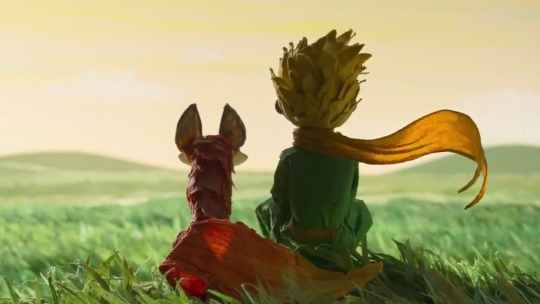
83. The Little Prince – Full confession: I wrote this review a couple of months after actually seeing “The Little Prince” on Netflix and I barely remember anything about it. I remember thinking it was a nice little animated film with a nice message about not forgetting your childhood spirit and imagination and sense of wonder as you grow up. I remember thinking that the CGI animation was nothing special (it was animated in France with a modest budget, so I won’t complain), but the stop-motion sequences were pretty impressive. I remember chuckling a few times and getting the feels once or twice.
It’s alright, from what I recall, so check it out if you like. I’m sorry if you’re a big fan of “The Little Prince” and were hoping for a more in-depth and detailed review, but I genuinely had a hard time remembering stuff about this film, which (considering the film’s message and key themes) is pretty ironic.

82. Jack Reacher: Never Go Back – I was going to make a superlative at the end of this list for “most generic”, but I realized nothing came close to this Tom Cruise action thriller. This movie is so relentlessly generic that it almost feels intentional, like a satire of one of those mediocre 90’s thrillers that are shown endlessly on cable, probably as a double-feature with “U.S. Marshals”. Tom Cruise has never made a bad movie, but this is easily one of his worst ones. Typical conspiracy thriller plot from the type of shitty airport-bookstore paperback novels that boring middle-aged people enjoy (and that these movies are adapted from). Noteworthy only for the scenes with Cruise’s maybe-daughter and their dynamic, something that feels like it’s from a different movie altogether but funnily enough is the only stuff that actually works. Not terrible in any way, but this is something for a lazy Sunday afternoon or to have on in the background while you do something more interesting like ironing your clothes or vacuuming dog hair from underneath the sofa.
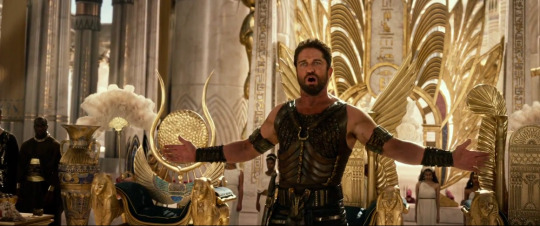
81. Gods of Egypt – Who would have thought that a silly fantasy movie about ancient Egyptian deities would be such a beacon for controversy the way it was prior to release? (The controversy was swiftly forgotten about, as it usually happens). Don’t get me wrong, whitewashing is certainly an issue in Hollywood, but in a film where 10-foot-tall, golden-blooded gods rule over a flat Earth consisting entirely of Egypt while Ra, the God of the Sun, rides around in a magic spaceship taking potshots at a giant space worm all day, complaining about historical inaccuracy is a bit silly. Regardless of what ancient Egyptians actually looked like, any attempt at historical realism would just be jarring and out-of-place here.
Gerard Butler and Chadwick Boseman hamming it up as the evil Set and smarmy Thoth are fun, as is Geoffrey Rush as Ra. Shame that the rest of the cast is as dull and forgettable as they are. The CGI quality is in the halfway-point between “good” and “Syfy movie-tier”. It’s not exactly convincing, but it’s pretty and colorful enough that you don’t need too much suspension of disbelief. Tonally and stylistically, the movie harkens back to those cheesy low-budget fantasy films from the 80’s (if not in budget and star-power). I particularly love how the human girl love interest is portrayed as an innocent girl-next-door-y type, but her massive, barely-contained rack is prominent in almost every frame she’s on screen.
The only major detrimental flaw (and it’s kind of a big one) is that “Gods of Egypt” feels about 20-30 minutes too long. It just doesn’t have the narrative strength or filmmaking energy to sustain its’ running time. If it was edited down (particularly the parts with the young, discount-Orlando Bloom main human character), it’d be a reasonably fun movie. Still, I appreciated “Gods of Egypt” for its goofily-sincere throwback spirit, and nothing about it was painful to watch. Not god-like, but not god-awful either.

80. High-Rise – It’s difficult for me to review a film like “High-Rise”, because while there’s a great deal I admire about the film, the overall experience just felt hollow and repetitive to me. It’s about a young doctor who moves into a fancy 1970’s London high-rise, a self-sustained building with many luxuries intended to provide equal quality of housing to all its inhabitants, where mounting tensions between tensions between the upper and lower floors eventually give way to literal class warfare (subtle). While the first half of the movie is engaging, as the doctor maneuvers through all the social groups and meets a lot of the residents, the second half where the actual fighting starts lost me pretty quickly. None of the characters behave like normal human beings, which makes it hard to be invested in their conflict. While there’s some maintenance issues and disrespect in the building, it’s not clear why they all descend into savagery so quickly. I guess it’s something we’re just supposed to accept (human nature, man), but I feel like a more prolonged slide into chaos would have helped the movie, especially since the second half is just repetitive “one side does bad shit to the other, while the doctor tries to stay out of it” nonsense.
While I don’t buy any of the characters, the cast is strong and they play these caricatures with great conviction. I actually love the aesthetics of the movie; the set design, lighting, camerawork, etc. all being very striking and creative. Director Ben Wheatley’s talent here is evident, even if I stopped caring about the material after a while. I get that this movie is intended to be satire, so a lot of my complaints about the movie could be something that someone else would enjoy because it was all intentional, man. Maybe you’ll get more out of it than I did, but to me it was just a pretty and well-acted slog.
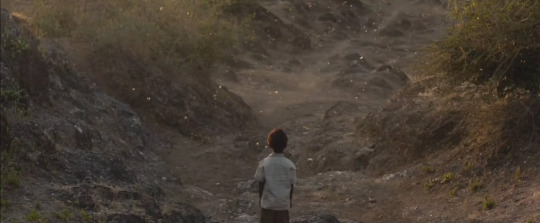
79. Lion
White saviors
Inspirational piano-heavy music the occasionally remembers to throw in some foreign flavor
A cute kid
A solid performance from a minority actor (Dev Patel)
A former Oscar winner who cries a bunch (Nicole Kidman)
A well-intentioned but kind of condescending depiction of another culture
Over-reliance on fish-out-of-water humor
Really obvious plot beats and recurring elements
An attempt to depict “realism” in poverty but watering it down for a PG-13 rating,
A happy/emotional ending
“Based on a true story”
Ending text that not only says what happened to the real-life figures with photos and video, but also includes a statistic about missing children in India and how this film is helping to fix the problem while a pop song by Sia plays.
I know this was based on a true story, but it’s like the fucking Academy themselves made this movie.

78. Independence Day: Resurgence – Roland Emmerich is like a more boring Michael Bay. Many of his films are little more than special effects showcases, dragged down by stock characters and awful writing. Oftentimes, the stupidity on display in a Roland Emmerich movie goes past the point of fun and becomes downright insulting to the audience. Charitably put, the man’s kind of a hack., but even a broken hack is right twice a career (sort of). The first time was 1996’s “Independence Day”, one of the most famous movies of the 90’s and a fun piece of cheese in its own right. The second time was 2016’s long-awaited (by nobody) “Independence Day: Resurgence”*. I don’t wish to imply that “Revengeance” is high-art or anything, but if you’re in the right frame of mind, it’s a simple and comfortably enjoyable flick.
A big part of that is that it’s never insultingly stupid. It’s not smart or anything, but it goes about its business without giving anyone a headache. The characters aren’t deep, but they’re likable enough for the audience to enjoy following them and for possibly the first time in Emmerich’s career, they’re not irritating. “Revolutions” is sincere in its goal to entertain, and displays enough self-awareness to get the audience to relax, like when Jeff Goldblum cheekily comments “They like to get the landmarks” during the film’s main destruction sequence. There’s also some hilariously goofy dialogue like “The ship will touch down over the Atlantic.” --> “Which part?” --> “ALL of it.” There’s a little bit of Chinese pandering (including that juice-box filled with milk or some shit that I keep seeing in these movies), but not enough to annoy, and weirdly it suits the theme of different nationalities banding together.
The cast is fine, but really nothing special. Goldblum is enjoyable because he seems constantly aware of the kind of schlock he’s in, but “Regurgitation” is sorely missing Will Smith, who is more charismatic than all the new cast members combined. When Bill Pullman is giving the best performance, your film isn’t going to win any acting awards. One other thing that I personally really missed was David Arnold, whose score for the 1996 film is one of my favorite film scores of that decade, and the only time the soundtrack for this one comes alive is when it occasionally reprises his majestic themes.
In summary, if you’re looking for something original or high-brow, look elsewhere, but if you just want to kill a few hours and seeing a diverse** group of attractive, multinational humans band together to fight aliens warms your heart a little bit in these cynical times, then “Independence Day: Redemption” will scratch that particular itch.
* I also admit to enjoying “White House Down”
**by diverse I mean black, white, Chinese, and Jeff Goldblum.
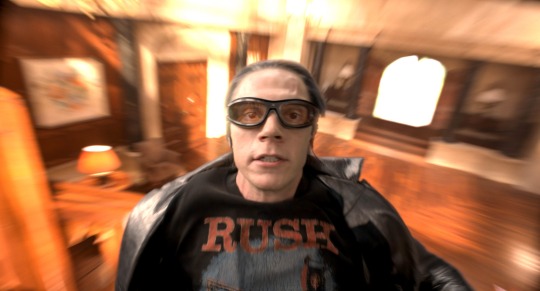
77. X-Men: Apocalypse - There's a bit in "X-Men: Apocalypse" where the younger characters go see "Return of the Jedi" and one of them comments on how the third movie of the trilogy is always the worst.
How prophetic that line turned out to be.
Not that X-Men: Apocalypse is a bad movie, but it’s definitely closer to Brett Ratner’s “X-Men: The Last Stand” than it is to Bryan Singer’s previously strong entries in the franchise. This is definitely one of those “you take the good with the bad” situations. This is a really inconsistent (tonally and otherwise) movie, so instead of writing a repetitive “this is good, but this isn’t” review, I’ll just list off the positives and negatives and leave it up to you to decide if it’s worth watching or not. This will include some spoilers, but you’re not missing much and the canon in these movies is a complete mess anyway. I’ll say that I was entertained, sometimes genuinely and sometimes ironically, for most of the film, so take that how you will.
The Good:
Evan Peters’ Quicksilver, who steals the second X-Men movie in a row
The Quicksilver mansion scene
Nice visuals
Good soundtrack
The early scenes in Poland
The Wolverine cameo
The Bad:
Nightcrawler being wasted despite being one of the best parts of Singer’s “X2”
Jennifer Lawrence is clearly phoning it in
The film does nothing fun with the 1980s setting
Oscar Isaac is wasted on a generic “I’m going to destroy the world and only the strong shall remain” villain.
Storm joins Apocalypse’s gang for like no reason, then switches sides pretty abruptly during the climax
Olivia Munn’s Psylocke has like, one or two lines the whole movie
For the third movie in a row, Magneto becomes the bad guy because he’s Magneto
For the third movie in a row, Professor X gives Magneto the “You don’t have to do this, there is still good in you” speech.
I know it’s the key theme of the franchise, but to hear these characters complain about mutant rights and discrimination is getting tiring after so many movies
It’s two-and-a-half hours long
The Funny:
Nightcrawler’s makeup
Everyone in the movie keeps saying how important Mystique is when this is the most useless and unnecessary her character has ever been.
After killing like, millions of people during the climax, they just let Magneto go, with Professor X telling him “I’ll see you around, old friend”
The characters are 20 years older than they were in “X-Men: First Class”, but all still look like they’re in their 20s or early 30’s.
That scene where Professor X beats up Apocalypse in his mind
Coca-Cola product placement
Magneto destroying Auschwitz
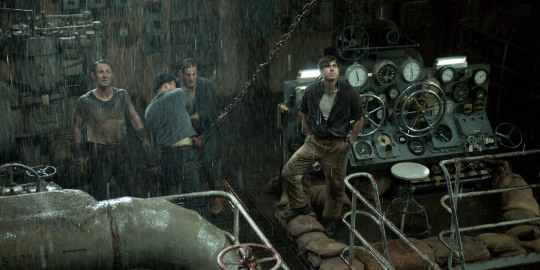
76. The Finest Hours – “The Finest Hours” is a period disaster/rescue drama about a small 1950’s Cape Cod Coast Guard team’s attempts to rescue the crew of an oil tanker after their ship gets Titanic’d by a major storm, and it’s as old-fashioned a movie as it gets, even to a fault. It’s a refreshingly straightforward film. I liked the community/teamwork-focused buildup, as we get to know Chris Pine’s Coast Guardsman, his love interest, and the crew of the ship before the disaster hits. I liked the scenes on the water the most, the experience of them struggling to clear the huge waves during the heavy weather is actually pretty harrowing. I liked the warm tone and the understated heroism.
There’s really not much to this film. I feel like it’s a bit too safe and predictable and not as white-knuckle exciting as I��d hoped. I wasn’t a fan of how the movie kept cutting back to the generic worries of the people on the shore, and the only things in this film thicker than the nostalgia ah the faahkin New England ahhccents. Still, I enjoyed it. It’s not a first-rate vessel, but it stays afloat.

75. Warcraft – I’ll start this by saying that I’m not a Warcraft fan and have never played any of the games. With that out of the way…
"Warcraft" is the nerdiest movie I think I've ever seen. It was so geeky, I felt like watching and enjoying it gave me my virginity back. This movie was made for Warcraft fans and literally nobody else (maybe the Chinese, but they're an easy-to-please bunch).
I actually really admire that. In an age where almost all blockbusters are watered-down, homogenized garbage made by people who seek maximum profit by catering to the largest possible demographic, seeing Universal Pictures take such a risk and sinking $160 million (plus marketing) into a film so niche and nerdy warms my heart. A movie that tries to please everybody pleases nobody in particular, and I'm happy for the Warcraft nerds for having their own cinematic moment.
The movie itself is kind of a mess, however. Even putting aside the stuff you probably need to be a WC fan to understand, the pacing is wonky, the script is weak, most of the human cast is bland, the editing sucks, and it ends very anticlimactically. While Duncan Jones (who is the main reason I saw this movie) pulls off some impressive visuals and great moments, the movie for the most part lacks the epic feel you’d expect in a big-budget fantasy movie. I was able to follow the basic story, but I was definitely lost at times, and remembered like, 3 or 4 of the characters’ names by the time the movie ended.
“Warcraft” certainly has its positives, however. While most of the human cast is underwritten or boring, Travis Fimmel and Ben Foster are both quite good in their roles, easily standing out from their cardboard cut-out castmates. The orcs won the lottery on their actors, all of whom play the orcs with such conviction that they feel more believable than most of their human counterparts. Even the writing was better during the orc scenes, weirdly. Speaking of believable, the special effects on display are fantastic. Between the amazing-looking orcs, the magic effects and the scenery, the CG artists have definitely earned their paychecks on this one. The battle scenes were fun, and (THANK GOD) shot clearly without using shaky-cam or fast editing, those two errant turds on the delicious pie of most action films. It’s also nice to see a movie that seems like it was created out of love and affection by people who actually care for the franchise, and who don’t feel the need to make it ironic or quippy.
While I mentioned that the writing is weak (most characters are frustratingly undeveloped and there are lots of important-sounding proper nouns that left me scratching my head), I see plenty of room for improvement, and with more refinement and focus, I can see a great sequel arising from this. I genuinely hope this franchise continues, because even though it’s not my thing and certainly not without its weaknesses, I enjoyed it for the most part and it feels like such a refreshing medicine to the disease of bland, corporate modern blockbusters that I don’t mind the odd taste or that the spoon is made from frozen fanboy wank.

74. Teenage Mutant Ninja Turtles: Out of the Shadows – I admit to being one of the few people that liked the Michael Bay-produced 2014 TMNT reboot, so I was also one of the few people looking forward to this year’s generically-subtitled sequel. I’m happy to say that as incremental as it may be, OOTS is a definite improvement. It feels less like the factory-assembled reboot typical of Hollywood attempts to cash in on nostalgic properties, and feels more in line with the original cartoon series. No longer is charisma-vacuum Megan Fox the main character; she is relegated to supporting duties, and the turtles (still enthusiastically played by their mo-cap actors) take center stage. This movie does the typical sequel thing where it includes more villains than the first, but all of them (besides Shredder, who is little more than a cameo) are surprisingly entertaining and never outstay their welcome. Tyler Perry is delightful as a mad scientist, as are the two guys who play man-beasts Bebop and Rocksteady. “Arrow” star Stephen Amell is clearly having a blast as vigilante Casey Jones. The action sequences are creative and fun to watch.
There’s plenty of product placement, but the Turtles have always been whores designed to sell merchandise, so it doesn’t feel out of place. I miss Brian Tyler’s bombastic music from the first film, the score here by Steve Jablonsky being much more generic and forgettable. The few attempts at character development are trite and unnecessary. The writing is still kinda crappy, and there’s a bit too much juvenile humor. I suppose my biggest complaint is that while the filmmaking is competent, it really lacks the sort of energy and inspiration to take it to the next level. Almost all the elements for a genuinely good Turtles movie are here; it just needs someone to put it all together into something that’s more than the sum of its parts, and not the dude who directed “Earth to Echo” (I’d heard of it either).
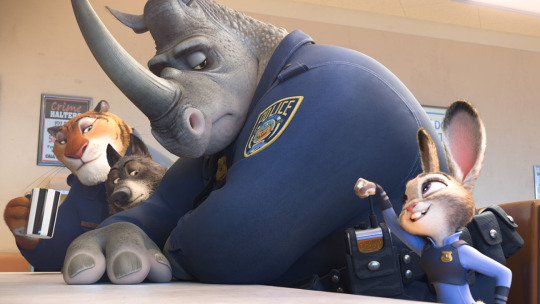
73. Zootopia – Nice animation, great attention to detail and some good visual gags (the population-counter on the rabbit farm, the wolf cop going undercover, etc.). Highlight of the film was the opening school-play scene. Nice message for the kids about how prejudices can lead even the most well-intentioned of people astray. Plot goes through the familiar beats of a Disney film, except for a pretty retarded third-act heel turn that I won’t spoil, but it would make more sense and have more story impact if the character didn’t feel so minor, and if it wasn’t so last-minute in the movie. “Frozen” was dull as shit, but at least the scene where HANS BETRAYS ANNA (spoiler warning) was pretty hilarious because of how well-timed and out of nowhere it was. The “grown-up” references (Godfather, Breaking Bad, etc.) feel pretty forced, mainly due to them just being references and not actual jokes. Overall, it’s a decent, well-made, and occasionally funny film (“I mean, I am just a dumb bunny, but we are good at multiplying”), but the overly-formulaic and predictable plot signifies that Disney’s lack of creative ambition is still there. Also, the sloth scene might have been funny if I hadn’t already seen it in the trailer. It’s definitely not one of those scenes that’s funny more than once.
Recommended for kids, furries, and those who love animal puns.
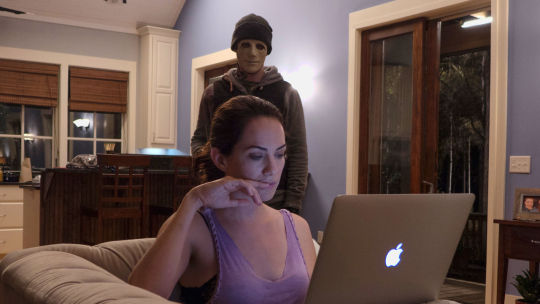
72. Hush – A deaf-mute writer is terrorized in her home by a psychopath intent on killing her. A nice premise with a refreshing twist on the tired home invasion genre, and the movie is a brisk 81 minutes. However, I feel like it should have been shorter, and it was only so long because the villain was so unbelievably stupid. At multiple points he could have entered her home and killed her pretty easily, but the plot dictates that she needs to think of ways to survive and outsmart him, so he’s just written as a crazy and evil idiot who wants to toy with his prey. I imagine most people would be fine with it, but his behavior became more annoying than scary after a while.
Making the film watchable is the solid directing and cinematography, along with writer/star Kate Siegel who makes for a very sympathetic and likable protagonist. We both wince and feel for her character when she gets hurt, as she sobs quietly but can’t audibly cry. Her performance is so convincing that I was genuinely surprised to find out that she’s not actually deaf in real life. The movie is decent and worth watching if you like horror-thrillers, and it shows than Blumhouse can still produce the occasional, not-garbage horror film.

71. War Dogs - I wasn’t a fan of the “Hangover” trilogy, even if the third entry was an admirably bold middle-finger to all of its established fans, but I saw talent in Todd Phillips’ direction which made me somewhat look forward to his next endeavor. Based on a true story, Miles Teller and Jonah Hill play two 20-something Miami dudes who get into the world of gun-running and happen upon a major but shady deal with the U.S. government. Basically, “Lord of War” for the new generation. However, where “Lord of War” was, despite its’ wry sense of humor, a pretty dramatic and searing look at the arms trade and the U.S. government’s involvement with it. “War Dogs”, meanwhile, feels more like a lightweight “Wolf of Wall Street”-esque rise-and-fall story of two friends and businessmen that, despite the constant references to the Bush administration, feels like only a passing criticism of the government. The key problem with the movie is how been-there-done-that it is. Even if you know nothing about the real-world story that inspired it, all the dramatic beats and character progressions are thoroughly predictable, and watching it I felt like I’ve seen this movie a hundred times already. It even opens with a variation of that freeze-frame “You’re probably wondering how I got in this situation” cliché. It’s not bad. It’s solid in pretty much every aspect. The directing by Phillips (I like a visual gag where a character sees approaching Iraqi insurgents in his truck’s side mirror, then the camera pans down to “Objects in mirror are closer than they appear”), the writing, the acting (with a noteworthy turn by Jonah Hill). It’s all fine. But the movie’s crippling lack of ambition means that by the end of the year, it’ll probably be completely forgotten about. I’m writing this review two days after having seen it and I’m genuinely having trouble remembering things about it. To put it in a hack-y movie critic kind of way; “War Dogs” is a gun that doesn’t malfunction, but never hits the bulls-eye either.

70. Jason Bourne – If the Bourne films popularized the “gritty espionage thriller” genre, 2016’s “Jason Bourne” feels like a generic knockoff made while the trend was hot, except it’s several years later and no one really cares. Still, I was looking forward to the film, because there are so few good action movies coming out these days and Paul Greengrass is at least a pretty strong director. I will always slightly resent Greengrass for popularizing the shaky-cam, fast-editing style of action filmmaking, but I admit he does it better than pretty much everyone, and it actually suits Bourne’s gritty, improvisational nature. There’s an early chase set during a riot in Athens and a climactic chase in Las Vegas that feel as urgent and intense as any action scenes I’ve seen in a while. Still, you wish the guy would invest in a tripod or something. It’s nice that Greengrass doesn’t discriminate, but exclusively hiring camera operators with Parkinson’s does make the end product a bit hard to follow, visually.
The plot is some hokum about the CIA trying to knock off a billionaire social media tech guru because he won’t let them use his product to spy on everyone, and somehow Jason Bourne is brought out of exile/retirement because of EVEN MORE buried secrets about his past. It’s pretty generic stuff that tries to be timely but comes across as trying too hard. Damon’s a compelling lead, and he’s given a decent villainous counterpart in Vincent Cassel, but it’s hard to be involved in the material. I was also disappointed by the lack of character development for Julia Stiles’ returning Nicky Parsons. Some insight into why she came out of hiding to give Bourne information would have been nice. The rest of the cast is unmemorable; Tommy Lee Jones in particular looks like he’s counting down the seconds until he stops shooting and can cash in his check.
You can tell that this is a tacked-on cash-grab sequel. They couldn’t even bother thinking of a proper Bourne title (The Bourne Resurgence, maybe?), and while Damon and Greengrass are definitely not half-assing it, you can tell their hearts aren’t really in this. Their workmanlike approach and their undeniable talent, however, does mean that Jason Bourne is an enjoyable thriller, and you’ll at least get a great pair of action scenes out of it. Still, what the hell were they thinking, making a Bourne film without Jeremy Renner?

69. Rogue One: A Star Wars Story - There is perhaps no bigger red flag to me for a major blockbuster movie than hearing about “extensive reshoots”. Putting aside the lessons we’ve learned from “Fantastic 4” and “Suicide Squad”, the main problem with these kinds of reshoots is that it speaks to the studio not having enough confidence in the director’s vision, and more in the opinions of test audiences. I know that reshoots are commonplace in the film industry, but when they announced that “Rogue One” would have several weeks of reshoots that weren’t even headed by director Gareth Edwards, my heart sank a bit.
Now, I don’t mean to compare this to the previously mentioned comic-book dumpster fires, but the fact that “Rogue One” is just “kinda good” makes it pretty disappointing for me. Before some of you nerds ask; no, I didn’t watch this film with the sole purpose of criticizing it and ruining the Star Wars circlejerk. I was really looking forward to it when I heard that Gareth Edwards would direct, because his recent “Godzilla” reboot was fucking awesome and easily one of the best blockbusters of recent years, and I had hoped that “Rogue One” would mark an effort in taking this unkillable franchise to bold, new directions. It’s not like doing so would even be considered risky; “Star Wars” fans would literally pay money to eat dogshit if they were told it’d be canon or if the actor who played Wedge Antilles told them to do it.
But there’s the problem. Despite some differences in approach to the main saga, “Rogue One” is as safe as they come. Sure, there’s no opening crawl and the visuals are grittier than usual, but in terms of dialogue, storytelling, style of music, etc., it’s still very much a Star Wars movie. I do like how the movie takes itself fairly seriously and is bereft of the typical cringe-worthy Disneyquips©, but it kind of lacks the passion and inspiration that made so many people fall in love with the original trilogy.
Michael Giacchino’s score does the job, but isn’t all that memorable. He happily mimics John Williams’ style, but doesn’t display the sense of flair or majesty that made Williams’ music for this series so famous. It’s a shame we’ll never get to hear original composer Alexandre Desplat’s work for this film (he couldn’t do the score due to rescheduling around the reshoots).
The cast is a major case of “talented actors let down by a weak script and thin characters”. Try doing the Plinkett thing and describe the characters’ personalities, without talking about their role in the plot or their motivations, and ask yourself if any of them sound interesting. The main character Jyn Erso is especially disappointing, since what initially seems like a personal quest to find her father turns into her just selflessly becoming a noble rebel hero. There’s kind of an arc, sure, but it’s seriously missing any real drama to make the arc meaningful. This is especially bad during the slow and plodding first two acts of the film, which are rather unengaging and even boring at times.
The only somewhat amusing characters are the droid K-2SO (Alan Tudyk), the blind kung-fu former Jedi (Donnie Yen), and the Death Star director (Ben Mendelsohn). The droid is pretty much the only source of humor in the film, and he feels welcome because he doesn’t feel over-the-top (he’s a kind of cross between C3PO and HK-47). Donnie Yen is an insanely charismatic actor, and he makes his character interesting enough that he can overcome the writing. Ben Mendelsohn makes for an entertaining and slimy villain, but he’s let down by the script and the constraints of the canon more than anyone. Mendelsohn’s naturally villainous performance is wasted due to his character’s frequent emasculation at the hands of old franchise baddies Grand Moff Tarkin and Darth Vader.
And therein lies the crux of the matter, both that of the film and of Disney; they focus less on building the future or telling new, memorable stories in lieu of milking the past for all it’s worth. This is best exemplified by Disney’s decision to reintroduce a pair of ANH characters using their creepy, uncanny-valley CGI technology and body doubles. They did this in a few Marvel movies to have actors play younger versions of themselves, but here they use it to bring a dead actor (Peter Cushing as Tarkin) back to life, and it’s quite morbid and uncomfortable when you think about it. They literally bought a dead man’s likeness from his estate to milk it for nostalgia bucks. Is that where we are as a society where we’re totally cool with something like this? Wouldn’t it be much more natural (and cheaper) to just recast the old characters? You know, with human beings and whatnot?
Don’t get me wrong. As an action-space-fantasy movie, “Rogue One” works well enough. I mentioned previously that the first two acts are meh, despite some good moments (like the Death Star’s demonstration on a desert city, and the whole opening scene). Most of the movie was characters traveling from one colorless location to the next, getting into a scuffle with the Empire, then escaping. It’s in the third act where the movie really kicks into gear. The stakes are raised, things feel more urgent, and the bland locations are swapped for a beautiful tropical beach setting with an Empire base on it. It’s basically one large action sequence, but it works. Edwards again uses his excellent sense of scale and visual prowess to make the battle feel epic and exciting. As someone who isn’t a big Star Wars fan, it’s easily the best 30-40 minutes in any of the movies for me.
However, while “Rogue One” gives an admirable effort in being its own thing, it can’t help but keep calling back to the original trilogy just to please its established fanbase. I don’t blame all of the film’s flaws on the reshoots. There’s no obvious difference between original and new footage like a crappy wig or awful, forced humor. And who knows, maybe the reshoots actually made the film better. But at the end, “Rogue One” feels like it doesn’t want to be a Star Wars movie but is forced to be one (pun intended) by its strict parents. So often the characters go on about “hope”, as if they are seeking HOPE of a NEW variety. It may be like poetry (it rhymes), but after a point it becomes less poetry and more beating you over the head with a rhyming dictionary. For future installments, let’s cross our fingers for a little less “hope” and a little more “new”.
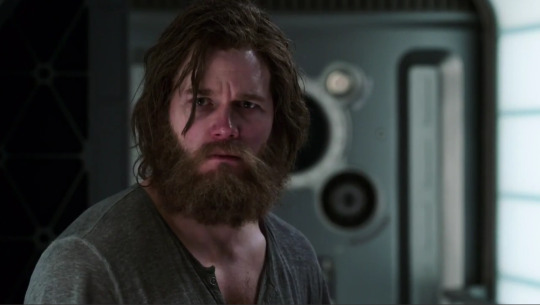
68. Passengers – Betrays Chris Pratt’s best movie performance to date, an excellent first act, and its own interesting (and pretty disturbing) premise by watering it down with schmaltzy Hollywood romance, unnecessary action, and a cancer-inducing end-credits Imagine Dragons song. I could write an entire essay on why the movie’s specific approach to its story is deeply uncomfortable. I’m also pretty much over Jennifer Lawrence at this point.
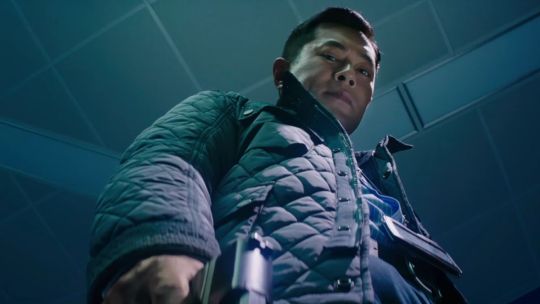
67. Three – Intriguing and unique chamber piece, but its comical elements and over-the-top melodrama feel out of place, and the final shootout feels like style just for style’s sake, which makes it oddly boring. Watchable, but a massive step down for Johnnie To after his excellent “Drug War”.
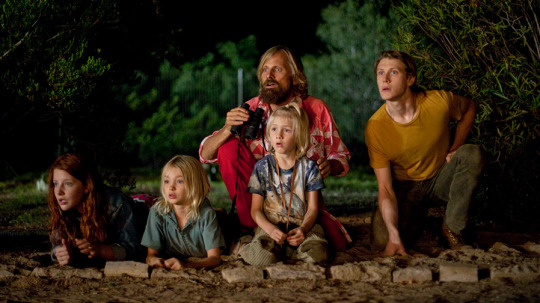
66. Captain Fantastic – Soulful performance from Viggo Mortensen and the occasional touching and insightful moment help buoy this portrayal of family and unconventional parenting whose biggest flaw is having a script and viewpoint that’s too smug and proud of itself for its own good, which makes most of the emotional moments feel cheap and unearned. Wes Anderson could have made a great movie out of this.

65. The Edge of Seventeen – Overcomes (just barely) the unlikability of its main character, the annoying way characters always describe what they’re going through, and its own sheer predictability with good performances, the occasional funny line and a fairly honest and empathetic look at growing up. I’d respect it more if it had the balls to have an unhappy ending. Woody Harrelson gives probably my favorite portrayal of a teacher in a movie.
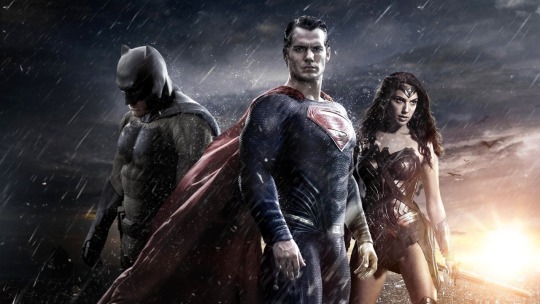
64. Batman v. Superman: Dawn of Justice – Oh, boy, here we go. For the record, this review is of the extended cut of the film.
I firmly believe that you can make or break a movie in editing. No matter how good the writing, acting, directing, and cinematography are, if a film is poorly edited, it becomes confusing at best, and a complete chore to watch at worst. Such was the case with the theatrical cut of the highly-anticipated (not by me, of course) “Batman v. Superman: Dawn of Justice”, a film that despite being two-and-a-half hours long, felt like a rushed and confusing mess. I’m not saying that the extended cut is some sort of masterpiece, but this 3-hour version is what Zack Snyder intended the finished product to be before Warner Bros. got their stupid fucking fingers on it. Characters are given more scenes to be fleshed out, subplots are better developed, and the pacing is significantly improved, amounting to a much more coherent and downright better film. If you saw the theatrical version and are really on the fence about the film, I recommend watching the extended cut.
The movie itself is still fundamentally flawed in some aspects. It’s still a film constrained by the pressure to set up an entire cinematic universe, which makes the story itself suffer. It probably should have been solely about the personal grudge between Batman and Superman and the consequences it takes on both of them, and them eventually teaming up together when they realize they’re not so different and both want the same thing. The actual movie tries to do that, have Lex Luthor try to destroy both of them, introduce Wonder Woman, set up Wonder Woman’s origin story, set-up three other Justice League members’ origin stories, set up the Justice League movie itself, have an investigative Lois Lane subplot, hint at a future bad guy, and create a giant Frankenstein monster for the third act, among other things. The movie does keep most of these plates spinning, but some of them do fall. It’s an ambitious undertaking, but we’re still left with expensive broken china.
The writing is pretty hackneyed, too. If you can explain Lex Luthor’s motivation for hating Superman to me without citing a comic book or saying “it’s just what he does”, please do. They hint at some biblical reason for it (the Christ allegories and symbolism are even less subtle here as they were in “Man of Steel”, to give you an idea), but it came across as Lex hating him for no particular reason and trying to quote scripture to justify it. There are like three extended dream sequences in the movie, which feels like two too many. And then there’s that awful flow-breaking scene where they set-up The Flash, Cyborg, and Aquaman. I’m reminded of an anecdote where during the making of “Man of Steel”, Zack Snyder wanted to include an after-credits scene but producer Christopher Nolan opposed, telling him “A real movie wouldn’t do that.” This story is probably bullshit, but I think it’s funny that Snyder made an after-credits scene and just crowbarred it into the middle of the movie.
“Batman v. Superman” attempts (and actually succeeds for a while) to really create a sense of consequence in a comic book movie, with the whole world, particularly Batman, being concerned about Superman’s presence on Earth after the destruction caused in “Man of Steel”. But it’s all kind of thrown out the window when that conflict is immediately dropped after the “MARTHA” scene so they could team up to fight the aforementioned Frankenstein monster. The “MARTHA” scene has become kind of infamous, but I was actually fine with it (even if it could have been better written) until Batman says “Don’t worry. Martha’s not dying tonight”, which got a good howl out of me. It was at the very least an interesting movie until it became the typical third-act destruction fest that has characterized so many superhero flicks, with even a few tonally jarring quips thrown in for good measure. The actual fight between Batman and Superman only lasts for like 5 minutes, despite so much buildup. While fun, it feels really schlocky, especially when Batman rips a sink out of a bathroom wall and starts beating Superman over the head with it. Why they started fighting in the first place instead of talking it out like Superman originally intended is beyond me, as well. Zack Snyder’s penchant for outstanding visuals is never in question (he does handheld camerawork better than pretty much anyone) but his grasp on storytelling has always been a bit iffy, even if this is arguably his best work.
If you’re a comic book fan and weren’t a fan of the characterization in this film, the extended cut won’t change your mind on that. Superman is still kind of a dick, Lex Luthor is still a Jolly Rancher-sucking autist, and Batman still kills people. It (mostly) makes sense in the context in the film, and I personally didn’t care too much, but I know some comic book fans who won’t forgive it. Last but not least, I want to mention what is probably the most annoying product placement I’ve seen in a movie this year. It’s not as gratuitous as a TMNT or Transformers flick, but at least those films didn’t take themselves seriously. There is nothing that can ruin a good, serious scene like a really out-of-place product placement. I was enjoying the scene with Clark Kent and Lois Lane in the bathtub until the camera turned to the bottle of Olay and stayed there for like a solid 2 seconds. The scene I was most looking forward to in the movie (the “Man of Steel” destruction of Metropolis as seen through Bruce Wayne’s eyes, which was really well done) was really hurt by the fact that right before the movie started they showed an ad for the Jeep used in the scene, using footage from the movie. There’s also a scene where Lex Luthor tries to force-feed Holly Hunter a Jolly Rancher. I understand that the movie’s titanic budget has to come from somewhere, but it’s shit like this that really pulls me out of the movie.
The cast is strong, particularly Jeremy Irons’ Alfred and Ben Affleck, who exceeds all expectations as Batman, even if he looks a bit silly in the suit. If nothing else, I’m really looking forward to his solo Batfleck film. Gal Gadot is nothing special, but at least she isn’t terrible. Henry Cavill is solid and likable even when the script lets him down, as is Amy Adams (not to politicize things, but I feel like this movie is getting no credit whatsoever for actually having a female love-interest who is like ten years older than her male counterpart, as opposed to the typical older-male-younger-female one). I like how they try to make Laurence Fishburne’s newspaper editor like a reverse J. Jonah Jameson from Spider-Man, constantly telling Clark Kent to report on some local sports team and admonishing him for writing about a vigilante dressed up as a bat beating the shit out of criminals and branding them.
I could go on, but at least BvS feels like an actual movie, instead of the really long trailer that was “Man of Steel”. Its (many) flaws aside, Zack Snyder is to be commended for using such a massive budget to at least try and do something different and ambitious than typical superhero films, and the fact that he succeeds as much as he does despite so many expectations and so much pressure is to be lauded. His cast is good, his action scenes are brutal and weighty (I loved that “Arkham” style warehouse fight between Batman and a group of armed thugs), his heart is in the right place, and he really, honestly dares to be different. If he had a better script and a not-terrible studio to back him up, “Batman v. Superman: Dawn of Justice” would be appreciated for what it is, and not the kind of movie that inspires actual news articles about RottenTomatoes.

63. Billy Lynn’s Long Halftime Walk – Uneven but occasionally powerful and refreshingly biting look at America’s oft-hypocritical worship of its soldiers and what battle can really do to their psyche, with lead actor and newcomer Joe Alwyn deftly carrying the movie on his shoulders. Let down by a weak script and most of the supporting characters being one-dimensional caricatures, however intentional it may be. The weirdest cast ever assembled for a drama (Garrett Hedlund, Chris Tucker, Steve Martin, Kristen Stewart, and Vin Diesel) works surprisingly well, except for the sadly out-of-place Martin. Didn’t get to see it in the original 4K, 120fps format, but at least I don’t get a headache out of it.
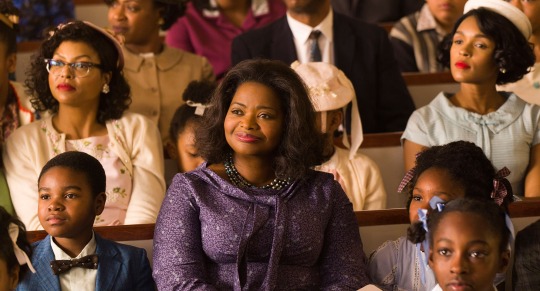
62. Hidden Figures – Typical inspirational historical drama. Sugary and as clichéd as it gets, but solid enough that it works. Elevated by strong performances from the three leading women, made amusing by how every other line spoken by any of them is an Obama-esque crowd-pleasing “Mmhmm” moment, and almost ruined by the presence of Bazinga as a racist, sexist strawman who is just there to be continually outsmarted and embarrassed by the smart, black lady. Probably going to become a staple in high school math/physics classes with lazy teachers. Thumbs up for the Oscar-bait title.

61. 13 Hours: The Secret Soldiers of Benghazi – I let out a good chortle when I heard that there would be a movie about the 2012 Benghazi attack starring Jim from “The Office” and directed by none other than Michael Bay, a man whose approach to maturity and good taste generally amounts to a passing laugh and cocaine-sneeze. It was to my pleasant surprise (and admitted slight disappointment) that “13 Hours” turned out to be not only a solid military thriller but also Bay’s most restrained and mature movie. Don’t get me wrong; there’s still plenty of military hardware porn, explosions, and tastefully lit shots of a shirtless John Krasinski (hnnng). However, it also doesn’t include the obnoxious humor and out-of-place product placement that characterize most of his films (although there is a really unnecessary scene in a McDonald’s drive-through), and it actually takes itself fairly seriously, which is surprising coming from the guy who directed a film about two Miami cops who single-handedly invade Cuba.
It presents an account of what happened that night at the U.S. embassy and nearby CIA station as seen through the perspective of the security contractors stationed there, and it avoids politicizing the matter. There’s an annoying CIA chief strawman who refuses to let the contractors go in early to rescue the ambassador, but that’s pretty much the extent of it. The rest is a tense military action film, along with the expected jingoistic hero worship that these types of films have to include by law or something, though thankfully it’s not as bad here. Bay spends a decent amount of time setting up the location, the characters and the situation, before tits go inevitably up. The characters are fairly thin, their non-action scenes amounting to the usual dick-swinging soldier banter and some phone calls to their wholesome, attractive families back home, but the actors are good and convincing enough to make you care about them.
The action scenes are the reasons to see this, characterized by strong sound design and the aforementioned hardware porn that I admittedly enjoy, as well as some great shots, like the slo-motion one of a soldier surrounded by sparks. I also liked the atmosphere of the film, as the contractors slowly move through the ghostly streets of Benghazi, one of them remarking “It’s like we’re in a horror movie”, as some residents nearby are casually watching a soccer match while ignoring the gunfights outside their homes, as if it’s just another weekday evening.
The writing is pretty weak. It gets the needed information across, but the characterization is thin, the dialogue ranges from corny to boring, and there really isn’t enough plot to make this movie as long as it is.
Nontheless, it’s a solid action-thriller. I’ve defended Michael Bay for a long time now (mainly because he made “The Rock”, and I don’t see any other fucking director that made “The Rock”), but between this and 2013’s “Pain & Gain” he shows how much better he can be with smaller budgets and when not constrained by a plot involving giant robots punching each other and making racial wisecracks.
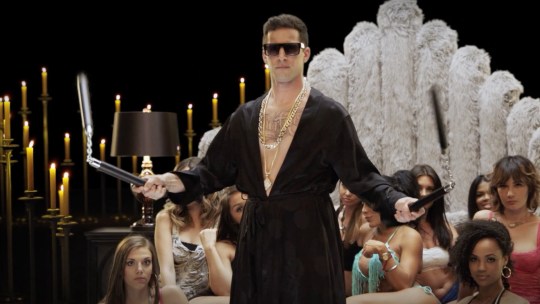
60. Popstar: Never Stop Never Stopping – Imagine “Walk Hard: The Dewey Cox Story”, but not as good, and you get a good idea of what “Popstar” is like. The humor was pretty hit-or-miss and definitely favored quantity over quality when it came to the jokes, as can be expected from a movie made by SNL alumni, but it kept me entertained and made me laugh enough to warrant a recommendation. Funniest bits were the TMZ parodies, Justin Timberlake, and the “Equal Rights” music video.
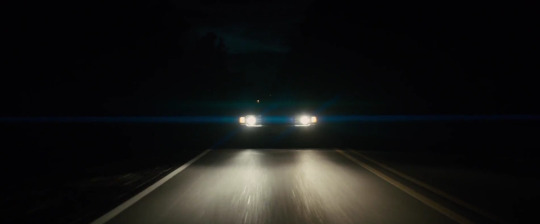
59. Midnight Special – I like Jeff Nichols as a filmmaker. It’s partly because Michael Shannon is in all of his films, and I’ll watch anything that man does at this point, but Nichols has shown himself to be a nuanced and compelling storyteller with an excellent command of both atmosphere and tone. It’s this skilled storytelling and another strong performance from Shannon that make Midnight Special worth watching, even if it’s all in service of a story that becomes pretty dumb by the time we find out what’s going on.
The basic plot is that of a father who runs away from a religious compound with his son and is soon hunted by a number of groups because of some mysterious power that his son possesses. The opening scene where they and a helping friend of the father hurriedly leave a motel room and drive away into the night is excellent and expertly sets up a low-key but involving sci-fi thriller tone. Unfortunately, the more the movie goes on, the more we find out what the son’s powers are and what his “purpose” is, and without spoiling anything, it lost me pretty quickly after the late-second act revelation. The strong cast led by Shannon and Nichols’ direction kept the movie compelling enough to get me to the finish line, but this is definitely a case of a screenplay being too ambitious for its own good.
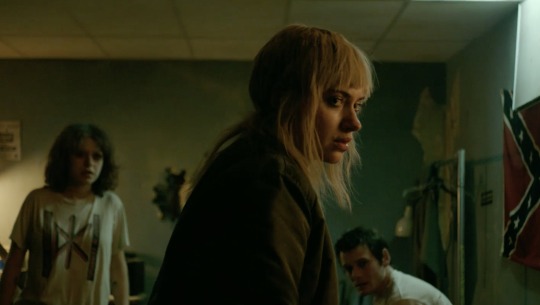
58. Green Room – Punk rockers vs. neo-Nazis is a premise more fitting of a sillier movie, in my opinion. Writer/director Jeremy Saulnier (who made 2014’s underrated gem “Blue Ruin”) probably knew this, and subverts it by making “Green Room” as grim and unpleasant as he possibly could. Going off of a theme from “Blue Ruin”, the deaths in this movie are often bloody, realistically brutal, and purposely sudden and anticlimactic, simultaneously being a violent movie but also anti-violence. Saulnier’s technical aptitude and the talents of the cast are never in question, and the movie itself is quite gripping and well-paced. I don’t think “Green Room” is as good or thematically rich as “Blue Ruin”, and the ending is a bit of a letdown, but it’s still a well-made and clever genre flick, and if you enjoy feeling like shit and averting your eyes from the screen then it’s the movie for you.
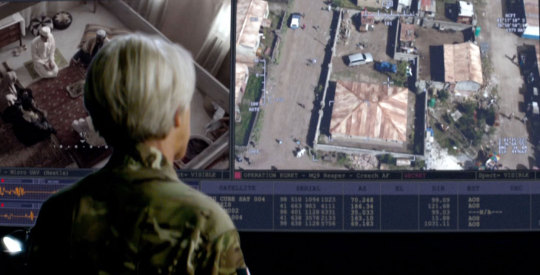
57. Eye in the Sky – A government joint-operation to kill some high-ranking terrorists in Kenya via a drone strike is halted when a little local girl enters the kill-radius. The story is told from the perspective of a ground recon team trying to get her out, the drone pilots, and the military brass and government officials who argue about whether the strike is justified and should be carried out. It has a good setup and a pretty powerful climax, but drags quite a bit in the middle portion where those in charge of the operation keep referring up to their superiors to figure out if they can/should/will fire the missile. The cast, in particular the late, great Alan Rickman as a weary general, are good enough to get you through the duller bits of the movie, and it’s really nice to see Barkhad Abdi in a movie again. While it could have trimmed some of its excess fat, “Eye in the Sky” is a tense, compelling thriller, and a much more mature and responsible examination of the consequences of drone warfare than “London Has Fallen”, albeit much less entertaining.
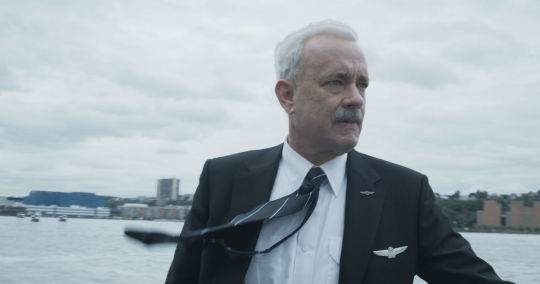
56. Sully – You’ve got to give Clint Eastwood credit. For a guy in his mid 80’s, he sure is prolific these days, regularly cranking out solid movies every year or two. In retelling the events of the “Miracle on the Hudson” passenger plane water landing from a years beack “Sully” continues that tradition by being good. Not great, but good. Tom Hanks makes for a fine lead, Aaron Eckhart is decent as Hanks’ co-pilot and friend (albeit constantly overshadowed by his own glorious mustache), just about everything else is meh. The highlight of the movie is the water landing itself, shown 3 times at different points from the perspectives of an air traffic controller, the passengers, and finally the cockpit. These scenes are intense and pretty harrowing, dodgy CGI aside. The rest of the movie is either the lead-up to the flight, or the aftermath where Captain Sully deals with the mental trauma from the incident and contends with a federal investigative committee that easily wins the award for “Most Obvious Strawmen of the Year”. Whatever. The film is well-made and compelling enough. As I said before, it’s good. It’s the definition of a 7/10 movie. If you’re old, like the audience during my theater showing was, you’ll probably love it. Everyone else will probably just like it. If you’re expecting something along the lines of Eastwood’s “Unforgiven” or “Letters from Iwo Jima”, you’ll be disappointed, but if you just want a solid, likable movie, this won’t Sully your expectations…I’m sorry for that one.
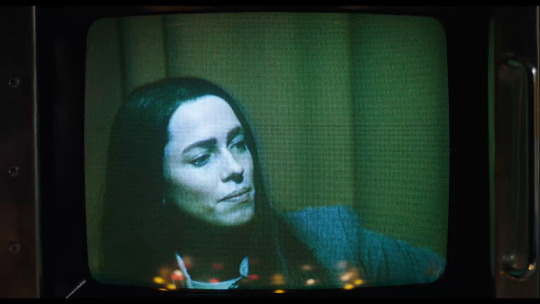
55. Christine – An amazing, simultaneously magnetic but also hard-to-watch performance by Rebecca Hall as 1970’s reporter Christine Chubbuck, and a very raw portrayal of depression, but ultimately feels pointless as it says nothing about Chubbuck or her mental state, as if the film is keeping her at a distance when it should be holding us down face-first into what she was truly feeling, making the ordeal feel kind of exploitative, when you think about it. If you know her story, the scene you spend the whole movie anticipating is done excellently, however.
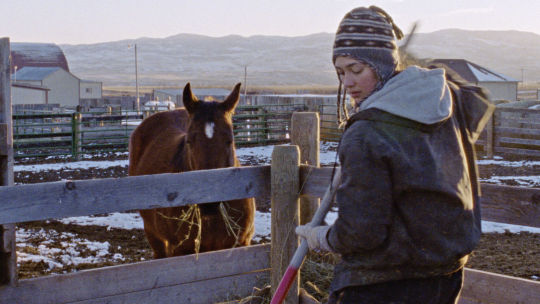
54. Certain Women – MINIMALISM. It’s either your type of thing or it isn’t. “Certain Women” is three loosely-connected stories about women who live in Montana, and it’s as grounded and un-flashy as a film can get without being a home movie. It’s one of those films that’s about normal people and their everyday problems, and makes it all seem profound. To me, it worked well for the most part. I was engaged by the nicely composed cinematography and the good performances. The three stories vary in quality. Laura Dern plays a small-town lawyer who gets caught up in a hostage situation, and this is the most straightforward of the three, but also quite engaging. Michelle Williams plays a mother who wants to build her dream home in the woods but faces ambivalence from everyone in her life, and hers is the weakest story, if only because it feels so short and anticlimactic (even by this movie’s standards).
The third story is surprisingly the best, with a ranch hand played by newcomer Lily Gladstone who forms a bond with a young law school graduate played by Kristen Stewart, and it’s an affecting and nuanced look at loneliness. Kelly Reichardt’s direction is modest and very low-key, but it’s empathetic and creates a good sense of atmosphere. This movie is also slower than watching paint dry at half-speed, lacks any overt drama and is very light on plot, so it’s one of those movies you’ll either completely love or won’t care for at all. I liked it, because I’m an edgy contrarian, and because I like a movie that gives its characters breathing room and trusts the audience to be smart enough to get their own thematic value out of it, so it’s worth your while if you’re not feeling too sleepy. Plus, there’s an adorable corgi in it, so automatic recommendation from me.
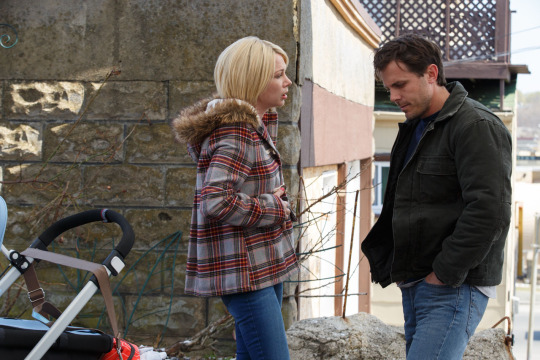
53. Manchester by the Sea – Reading the reviews and seeing all the award nominations, you’d think this mostly plotless exploration of grief is the desperately-needed salvation of cinema. When the credits rolled, however, all that hype ended up giving me was a resounding “Wait, that’s it?”.
The film is about a Boston janitor with a tragic past whose brother dies, and he goes back to his coastal New England hometown to handle his brother’s affairs and break the news to his son. As the janitor, Casey Affleck delivers one of the best portrayals of grief I’ve ever seen. Even before you know his story, his eyes and demeanor subtly hide an ocean of pain and heartbreak, and he pulls it off so naturally you often forget you’re watching an actor. Equally as good (and possibly better) is Michelle Williams, who plays his ex-wife. The filmmaking crime of the century is only putting her in the movie for like 5-10 minutes, where focusing more on her and Affleck’s relationship would have made the movie infinitely better, in my opinion. The guy who plays Affleck’s nephew is alright, given that his and Affleck’s relationship is the core of the movie, but nothing to write home about other than one really good breakdown scene. Everyone else ranges from “passable” to “clearly acting for the first time” to “distracting cameo from Matthew Broderick”.
I don’t wish to imply that the movie fails in any major way. I wasn’t a fan of how often the movie tried to be funny (“funny” in that New England way where characters swear a lot), and there is a glaring overuse of music, but it wasn’t a deal-breaker. I suppose that outside of a small handful of powerful scenes and moments, “Manchester by the Sea” felt like it was missing that emotional gut-punch it aimed for. It peaks halfway through in a flashback where we see what made Affleck’s character the way he is, and the movie only comes close to matching it during the last scene between Affleck and Williams. Don’t get me wrong; I understand the intention of making the film understated, so as to show a realistic depiction of grief, where people kind of just continue going about life and trying to not think about it. However, it goes a bit too far in this direction, to the point where I didn’t care for the mundanity of their lives and wanted some crying and goddamn emotion. This may be an over-simplification of how I feel, but basically, the movie is 10/10 when Affleck and Williams are onscreen together, an 8/10 when it’s just Affleck, and a 5/10 or a 6/10 when it’s any other combination of actors.
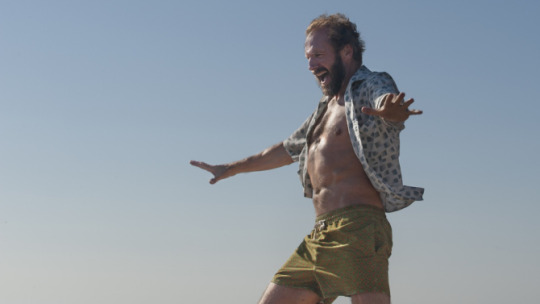
52. A Bigger Splash – Seems like it’s going to be a mature meditation on romance and desire until Ralph Fiennes shows up 5 minutes in, steals the entire fucking movie away from both the director and the rest of the cast, rubs his dick on the print, then sets it on fire while giggling to himself and dancing around naked. One of the best performances in a career filled with great performances. Movie goes downhill significantly in the last 30 or so minutes.

51. The Love Witch – Clever satire of gender dynamics as seen through the eyes of a love-addicted femme fatale witch. PERFECTLY nails the old-school Technicolor horror/sexploitation vibe. The art design, camerawork, hair/makeup, and even the way the actors behave is spot-on. Bravo to director Anna Biller and all involved as far as the technical aspects go. Story is at first detrimentally slow and the movie is far too long, but it picks up in the second half. Feels a bit too written, as if the characters occasionally stop being themselves and become mouthpieces for the writer/director.

50. Hardcore Henry – Let it not be said that there is no innovative filmmaking these days. Russian musician and music video director Ilya Naishuller was given a few million dollars to make a balls-to-the-wall action film filmed entirely from the first-person perspective of the main character. The most impressive thing about the stupidly-titled “Hardcore Henry” is how much mileage it manages to get out of its first-person gimmick, and how surprisingly well-made it is. Actual stunts are performed, effects are mostly practical (aside from a few bits of awful CGI), and you always feel like you’re in the body of the main character. The action scenes are fun and inventive, there’s a good deal of humor (I liked the bit with the overlapping subtitles), and Sharlto Copley gives a great performance as several incarnations of the same man with different personalities and looks. The plot is completely shit, and gets a bit too bogged down with exposition at times, but it’s never too intrusive. I suppose the biggest concern there is with this movie is if you can handle the filming technique, because the constant movement of the camera, especially during the action scenes, can give you motion sickness. I got a headache and a bit of nausea while watching it, but it could have been from the McDonald’s I had just before seeing it, so I’ll give it the benefit of the doubt. I think that it works much better on a small screen instead of a movie theater either way, and even while on the verge of throwing up, I had a good deal of fun with “Hardcore Henry”. If you’ve ever used a VR headset while on meth, it should give you a good idea of the experience.
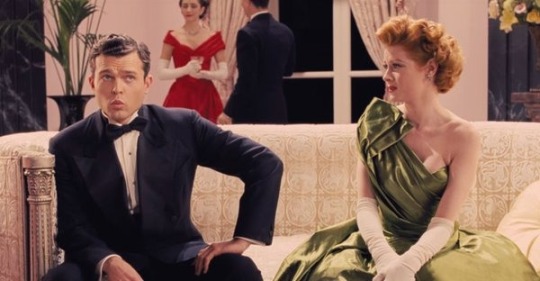
49. Hail, Caesar! – The Coen Brothers are my favorite filmmakers. So strong is their output that even their “bad” movies are good movies by any other standard. I don’t wish to imply that “Hail, Caesar!” is one of their “bad” ones, but it’s definitely on the lower end of their spectrum. The promotional material led me to believe that it would be a comic thriller about a 1950’s Hollywood fixer (a “problem solver” for studios) who teams up with a number of colorful showbiz people to rescue a kidnapped leading man. While the basic plot is there, the movie feels more like a leisurely series of vignettes about the colorful characters, loosely-connected by the fixer asking them for their help. It’s all amusing, colorful, and beautifully shot by eternal Oscars bridesmaid Roger Deakins, but it feels like it’s missing any sort of narrative thrust or stakes. The Coens don’t seem to be going for that sort of film, and it feels intentionally meandering and light, so the film is better if you go in expecting it. The writing is entertaining, but while the film is certainly hilarious in parts and never boring, some comedic bits feel stretched out for far too long (such as the scene with the religious leaders), which is unusual for the Coens.
The whole endeavor is less about plot and more about being a fun tribute-by-way-of-pisstake to Old Hollywood. It reminds me a bit of their earlier work “Barton Fink”, albeit broader, sillier, less existential, and much less cynical. We see old-fashioned editing rooms, grand movie sets, a wonderful musical number, Communism, etc. The Coen Brothers made a film that feels nostalgic towards a simpler era of filmmaking, while still acknowledging that even back then they made crap films. The biggest selling point in the movie is its’ all-star cast. I can’t remember the last time a movie had this many big-name actors attached to it. Sadly, due to the light nature of the story, a lot of them feel like glorified cameos, even if there isn’t a weak link among them. George Clooney is in top-form in the role of the kidnapped actor, the type of buffoon the Coens always seem to make him play. Channing Tatum is great as a tap-dancing musical star. Completely stealing the show is up-and-comer Aldren Ehrenreich, who plays a dopey but sweet cowboy actor, and who is so naturally funny, likable and charismatic here that I don’t have a single doubt about him becoming huge in the near future.
It just goes to show that even a lesser Coen Bros. film is still vastly better than the best work by most directors. While slow and kind of pointless overall, “Hail, Caesar!” is still a funny, gorgeous, and charming homage to the Hollywood Golden Age, one that rewards attention and repeated viewings, and welcomes them as well.
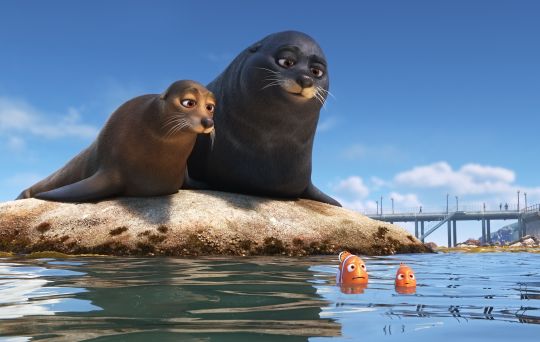
48. Finding Dory – Not on par with “WALL-E” or “Up”, but entertaining and nicely emotional. Feels like a welcome return to form for Pixar after so many years of disappointments. Bonus points for being the good kind of sequel, one that not only works on its own but actually adds new dimension to the original. Kind of disappointing, because before seeing the movie I was all ready to say “Finding Dory? More like FOUND IT BORING”. Nice message about family and taking care of a family member with special needs. Looking forward to “Finding Marlin”, where we see Marlin as an alcoholic going through a midlife crisis as he tries to singlehandedly raise a crippled son and his mentally handicapped friend.

47. Deadpool – One of my biggest pet peeves in movies is characters breaking the fourth-wall. I don’t mind a film being cheeky, but a movie occasionally pausing itself to acknowledge that it’s a movie annoys me to no end. I say this because “Deadpool” actually does fourth-wall breaking right, making it a key part of the humor and tone and story rather than an occasional “look at how clever and ironic we are” moment.
One would think because of this that “Deadpool” is just an endless series of self-referential jokes. It mostly is, but thankfully there’s an actual story, a bicycle for all the colorful tassels to hang on. Don’t get me wrong; the story is generic as hell. It’s still your typical superhero origin story, albeit one helped greatly by the nonlinear structure, alluding to Deadpool as an unreliable narrator. Also helping is a surprisingly engaging romance aspect, thanks to Ryan Reynolds’ and Morena Baccarin’s great chemistry and that the romance is a key part of the main character’s motivations (and that the girl feels like an actual character, not just a crowbarred-in love interest like almost every other comic book movie). One of the best scenes in the film is a montage of them “celebrating” various holidays.
Reynolds is perfectly cast as Wade Wilson, a role that his whole career since “Van Wilder” has been building towards. He effortlessly captures the character’s smarminess and gallows humor, but also makes him just likable enough to root for. Baccarin shows enough personality and comic timing that I certainly won’t mind seeing her having a bigger role in the sequel. The action sequences are the highlights. Tim Miller (in his directing debut) shows a clear aptitude for this, making the fight scenes bloody, funny, and visually creative, doing more with $60 million than most directors can do with $200 million.
Your enjoyment of “Deadpool” will come from whether you like its sense of humor. Given the sheer amount of jokes the film flings at the wall, a number of them are going to fall flat. However, to me a lot of them did land, and the movie is quite funny despite being a bit too in love with itself, and any comedy film that doesn’t give away its best jokes in the trailer (especially with a marketing campaign like this film had) is worthy of a recommendation in my eyes.
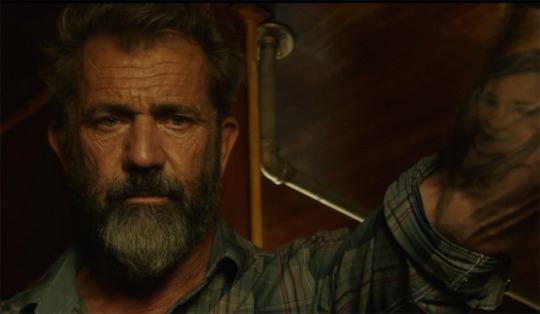
46. Blood Father – This is the best Liam Neeson movie that Liam Neeson never made. The action is tense and hard-hitting, the cast is good, and the movie is a very lean and efficient 88 minutes. However, there’s some distractingly bad editing at times, the plot is typical Liam Neeson fare (daughter is in trouble with criminals and seeks out her estranged ex-con dad to help out) and the dialogue is pretty wonky and overly reliant on swearing. Also, the girl is fairly annoying, but I suppose it suits her character so I won’t judge her too much for it. What makes the movie work is Mel Gibson’s performance. Looking increasingly like a shredded, captivity-era Saddam Hussein, Gibson is a volcano almost constantly on the verge of eruption. He plays a pissed-off man better than anyone, but he also showcases a good deal of humor and heart, able to convey more with his demeanor than most actors can with an entire monologue. Plus, watching him bite a guy’s ear off before head-butting him repeatedly is great fun. While Gibson is definitely better than the film’s B-movie material, he sells the hell out of it, elevating everything around him and making up for a lot of the movie’s flaws (you get the feeling it’d be much better if he directed it, as well). “Blood Father” is not quite the Mel Gibson renaissance-marking comeback I keep hoping for, but it’s good enough to recommend. Here’s hoping we don’t have to wait another few years to be reminded how great of an actor he is. Can’t quell the Mel.
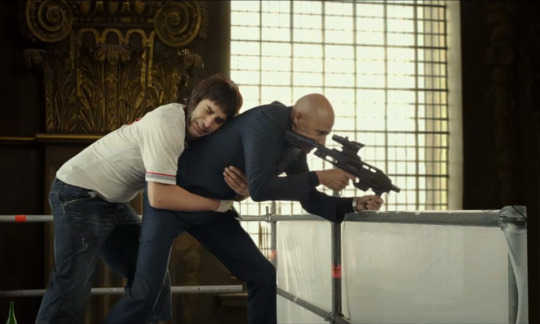
45. The Brothers Grimsby (AKA Grimsby) - It’s been a while since we’ve gotten a comedy from Sacha Baron Cohen. His stuff other than “Borat” has gotten a mixed reception, but I’ve always felt that that as a comic he has excellent timing and creativity, and even when not doing his famous “interacting with real people while in character” routine, the guy knows how to put together a joke. In a comedy world filled increasingly with endless cameos and cringe-worthy improv humor, it’s relieving to see a comedian that can still write a solid gag and perform it well.
Cohen plays Nobby, a trashy but kind-hearted English football hooligan who lives in Grimsby, a town so squalid that on a sign it says that its sister city is Chernobyl. He’s spent decades searching for his long-lost younger brother Sebastian (played by Mark Strong), and upon finally finding him he discovers that Sebastian is a highly-trained secret agent who is involved in stopping an elaborate terror attack. Naturally, shenanigans ensue which results in the two brothers teaming together to save the world. The plot is basically “What if James Bond had a fuckup brother?”
Some of the humor is as gross-out as it can get, getting plenty of use out of genitals and bodily fluids (there’s one sequence involving elephants that I don’t think I’ll ever forget). Quite a bit of the humor is based around English class differences, which may go over the head of American audiences, but I quite enjoyed. And some is just tastelessness and over-the-top comedic violence. Sometimes it doesn’t work, but I found myself surprised at how much did. There’s a good deal of set-ups and payoffs to the jokes, which I found refreshing, like someone actually spent time to craft the comedy in this film. I’ll say that I laughed pretty often, and I was never less than amused. Strong and Cohen have excellent chemistry together, and the film is at its best when it focuses on the two and their exchanges, with Strong proving to be an excellent straight-man to Cohen’s ridiculousness. It even has a nice little subplot about the two brothers bonding and coming to terms with why they were initially separated that even pays off during the climax.
The movie is a little over 80-minutes and moves at such a fast pace that even if a certain gag doesn’t work, it quickly moves past it. The trade-off to this is that when a gag does work, it’s not given much time to play out. I full-heartedly believe that brevity is the soul of wit, and it’s not a huge issue, but I do wish some of the jokes had a bit of breathing space. Probably the movie’s biggest sin is completely wasting its supporting cast. Penelope Cruz, Isla Fisher, Rebel Wilson, and Ian McShane all feel like bit players who are there just for plot purposes. Maybe that was intentional, to play the film like a straight-faced James Bond film with Cohen there to single-handedly derail it, but why cast talented, well-known actors in such useless bit parts?
I still recommend the film for being genuinely, unapologetically funny, and while a lot of its jokes are in bad taste, they never feel mean-spirited or overly edgy. They come from Cohen’s desire to shock you into laughing, but it feels self-aware and innocent enough that you’re more amused and bewildered rather than offended. Still, if gags about AIDS, incest, bestiality, casual gun violence, lower-class scum, and things being shoved into asses don’t sit well with you, then “The Brothers Grimsby” is not the bland, PG-13, all-inclusive safe-space you want, you precious snowflake.

44. Operation Avalanche – Starts off slowly and ploddingly but before long, it overcomes its’ potentially-gimmicky premise and occasionally unconvincing façade to become a surprisingly engaging and creative foray into “historical” found-footage bolstered by writer/director/star Matt Johnson’s deft storytelling and clear passion for filmmaking, with an unexpectedly excellent car chase to boot.
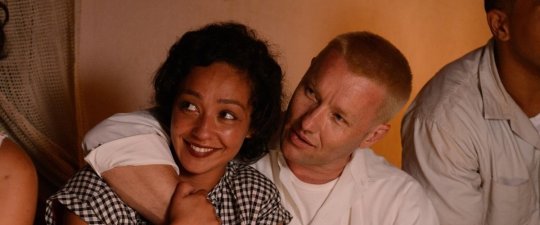
43. Loving – Jeff Nichols’ “Loving” is an account of Richard and Mildred Loving, an interracial couple who were arrested and then exiled for being married in 1950’s Virginia, and whose case to return home eventually went all the way to the Supreme Court. Given the material and the convenient title, you’d think this was blatant Oscar-bait all the way through, but for the most part it’s not. Jeff Nichols’ empathetic direction and the strong, restrained performances by Joel Edgerton and Ruth Negga as the two leads make this film feel human instead of exploitative. Nichols makes an interesting choice to keep the movie very personal and focused on the couple, with the broader Civil Rights Movement only briefly mentioned. I actually liked this approach as it makes you feel the pain and struggle and love of the characters first, and then by extension see how damaging prejudices (both institutional and personal) can be to people.
The film doesn’t completely escape Oscar-bait trappings, however. It still has the comedy-actor-playing-a-dramatic-role in the form of Nick Kroll as the ACLU lawyer assigned to the Lovings. He’s not bad or anything, but he feels a bit distracting and the role doesn’t amount to much. The music is fine, but it still has those corny inspirational cues at moments of triumph and perseverance, places where I think silence would have been much more effective. My biggest complaint is that it’s a Jeff Nichols movie and Michael Shannon is only in it for one scene. It's an important and good one, but you really wish he’d be in the movie more or maybe that’s just me because I LOVE MICHAEL SHANNON, HOLY SHIT. I've come to the conclusion that the quality of a Jeff Nichols film is often in direct proportion to how much Michael Shannon is in it (seriously, go see "Take Shelter" if you haven't already).
The best part of “Loving” is the two leads, who share a quiet but powerful chemistry, both of them reserved people whose love for each other you can feel in the littlest gestures and who don’t need any obvious histrionics or even words to show their feelings to the audience. It’s the solid core that makes the movie good, elegantly guided by Jeff Nichols’ confident and mature direction, even if the rest of it isn’t all that remarkable. Not quite a “Loving” for me, but eaily a “Liking”.
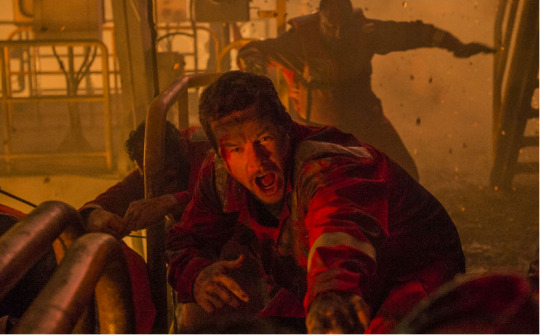
42. Deepwater Horizon - I’ve liked Peter Berg as a director ever since his underrated action-comedy “The Rundown”, starring The Rock back when he was still billed as “The Rock”. He shows an aptitude for action, pacing, and getting good performances out of his actors, but lately, he’s had a really bad case of hero worship. This, “Patriot’s Day” and “Lone Survivor” all have a frankly fetishistic view of real-life bravery, all ending in a text commending the bravery of those involved and including the names of victims, etc. This always felt like a cheap trick to me, one meant to elicit tears and nods of approval from middle-aged audience members who don’t go to the movies that often, rather than properly characterize his heroes. He gets around this somewhat by casting good actors who are likable enough that we care for them in spite of the weak writing and schlocky sense of patriotism. It all just feels weirdly exploitative of the real-life tragedies that the films depict.
As for the movie itself, it’s quite good. It starts with the prerequisite buildup on the Deepwater Horizon oil rig, showing negligence on the part of some of the management and the BP executives (read: strawmen), while showing the intelligence on display by the regular, blue-collar engineers and oil rig workers. I don’t deny that things were actually like this (truthfully, I don’t care enough to look it up), but it does feel pretty clichéd in movie form. Then the disaster hits, and there’s a solid 40-or-so minutes of the rig blowing up while the crew scramble to try to contain the situation and evacuate. This part is great. Berg’s technical skill is on full display, helping you follow the characters and what’s going on despite a lot of them speaking in mostly technical terms and the setting feeling like being trapped in a maze that’s on fire. It’s fantastically gripping, edge-of-your-seat stuff, helped by the theater-shaking sound design and convincing visual effects. The film ends with some tearful family reunions and heart-wrenching breakdowns when the survivors get back home. I’ll say that if I walked out of the film RIGHT after the screen faded to black, I would have a higher opinion about it.
If you like or at least don’t mind the hero-worship stuff, I’ll say that Deepwater Horizon is one of the year’s best-crafted thrillers, a disaster movie where the disaster actually feels scary and real as opposed to the dumb fun of something like “San Andreas”. I’m not against paying respects to the dead or to the bravery involved, but I think it should be done within the context of the film and the script, not forcing the audience to stay an extra five-minutes as some sort of memorial service that we paid money to attend.

41. Rams – This film is about a pair of Icelandic brothers who own neighboring sheep farms. They haven’t spoken to each other for 40 years due to implied but never explicitly-stated petty squabbles and stubborn jealousy, but are forced to work together to save their sheep when their flocks suffer from an outbreak of scrapie, a fatal degenerative disease that affects sheep and goats. This film is very affecting, low-key filmmaking, deftly handling heartbreaking drama, touching bonding, and even some surprisingly funny (albeit-bleak) comedy such as a scene where one character transports another to a hospital. It makes great use of the “show, don’t tell” filmmaking rule. Many scenes have little to no dialogue, but all serve a purpose in terms of plot or characterization or insight. The plot of sheep farmers trying to protect their flock may seem like a hard-to-relate-to storyline, but the film has universal themes of family and loss, and its observant and sympathetic storytelling makes the film accessible to anyone, even if they aren’t familiar with sheep mating procedures.

40. Kubo and the Two Strings - Laika has always been an overlooked animation studio, most known for making the wonderfully creepy “Coraline”, but finding little success in terms of box office even while their films are all quite good. Take “Kubo and the Two Strings”, a flawed but highly original and absolutely stunningly animated film that only managed to make a little over its production budget back, while “Zootopia” made over a billion dollars. Such is life.
The film itself is about a one-eyed boy named Kubo who is hunted by a vengeful demon and must team up with a magical monkey statue and a beetle-man to find some mystical MacGuffins that can help defeat it. It starts out very well, showing the boy’s daily routine of using his magic guitar and origami to tell stories to the local villagers. After shit goes inevitably down, it’s still quite compelling for a while, bringing a melancholy flavor to the boy’s journey and his interaction with his two companions. The problem is that the actual plot is pretty uninteresting, especially after the predictable late second-act plot twist, and while I can appreciate that the conflict resolution in the third act doesn’t just end by one character beating up another, the actual manner in which it’s resolved is pretty dumb.
The reason to see “Kubo and the Two Strings” is its gorgeous stop-motion animation. I had to smack my mouth a few times to remind myself that I wasn’t looking at high-quality CGI. It’s reassuring to learn that Laika is owned by the billionaire former CEO of Nike, so the studio isn’t exactly hurting for cash and can continue to focus on making their original and creative and beautiful movies without needing to dumb them down for most audiences, but it’s still a little depressing when good, accessible films fail to find their audience. While flawed (and nowhere near as good as “Coraline”), “Kubo and the Two Strings” is worth checking out if you love stop-motion animation as much as I do and you’re just waiting for the next Aardman film to come out.
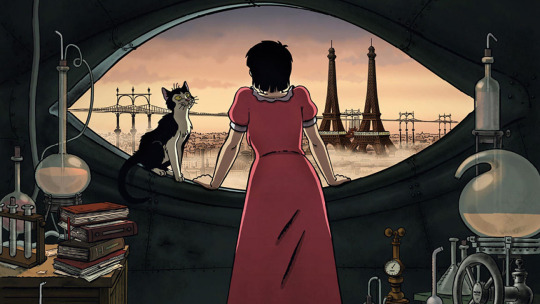
39. April and the Extraordinary World - In an industry almost completely dominated by 3D CGI-animated films, it’s somewhat refreshing to come across a traditionally-animated 2D film. “April and the Extraordinary World” is a French film set in an alternate-history 1940’s where the world’s foremost scientists of the past several decades have gone missing, causing crucial technological innovation to not happen and for the world to continue relying on coal and eventually wood-burning steam power. In a world on the brink of war for resources, April is a young French woman whose parents are two of the missing scientists, and we follow her and her talking cat Darwin as they attempt to solve the mystery behind the disappearances.
I want to start off by mentioning the art style. The characters are the simple but expressive beady-eyed 2D people you’d expect from European animation, but the design of the bleak steampunk world and the technology is amazing. However, and this is what I really like about the film, while it shows how cool-looking steampunk technology can be, it also criticizes it for being completely retarded and impractical and damaging to both the environment and to people, cosplayers be damned (Europe is completely treeless and characters have to wear gas masks if they’re outdoors for too long). The characters (especially the talking cat) are spunky, entertaining, and even have their fair share of depth. The film carries a nice message about using science and optimism instead of violence and negativity to solve the world’s problems. This feels more like the film that “Tomorrowland” should have been, before it got Lindelof’d.
However, it does have kind of the same problem that “Tomorrowland” did, in that the third act gets pretty stupid. It’s certainly not as bad or as nonsensical as it was in that film, and while the plot twist and eventual revelation are actually built towards instead of just dumped on us, it does get rather silly and I sort of lost interest. Without spoiling too much, it does end up relying on that tiresome “in order to save humanity, we have to destroy it” sci-fi cliché that was dumb even back when “The Terminator” did it.
Still, on the whole, I was surprised by how much I liked “April and the Extraordinary World”. While it certainly loses some steam near the end (pun originally unintended), it’s still engaging and surprisingly entertaining enough for the duration of its running time to warrant a recommendation.
Note: If you can, see the French-dubbed version. The English voice actors are good, but the movie and lip-sync feel off by not being in their original language. For the record, this is the only time I’ll ever say that something (other than bread) is improved by being French.

38. Mascots – To me, a mark of a good comedy is if it makes me laugh a lot. By that criteria, Christopher Guest’s latest mockumentary about a professional mascot competition and its participants is a good comedy. There’s not much to say about this film if you’re familiar with Guest’s other improv-heavy comedy films, and structurally it’s very similar to “Best in Show”. It’s not as good as that gem, partly because it feels like a more manufactured scenario, a parody of a part of culture and a competition that doesn’t feel real in the first place (as opposed to the biting satire of the very real world of professional dog-shows), and partly because Fred Willard is only in this for like 5-10 minutes instead of 40-45. Guest regulars Eugene Levy and Catherine O’Hara’s absences are also felt.
Still, what I like about Guest’s style of comedy that I despise about the Judd Apatow/SNL style of improv is the timing. He knows how to edit his jokes and his characters to keep them funny, and he knows when to let a joke go, as opposed to letting it linger and rot. The fact that he doesn’t write screenplays or hold any rehearsals for himself and his cast pretty much means that he films them performing improv and leaves in whatever is funny. Despite the aforementioned absences, the cast here is still great (with standout performances by Parker Posey, Susan Yeagley, and the guy who fucks from “Silicon Valley”), the movie has plenty of laughs and a surprising amount of poignancy and sweetness, and some of the actual mascot routines in the latter half of the movie are both hilarious and even breathtaking, particularly one involving an expressionist modern-dance about feminism and art in an armadillo costume.
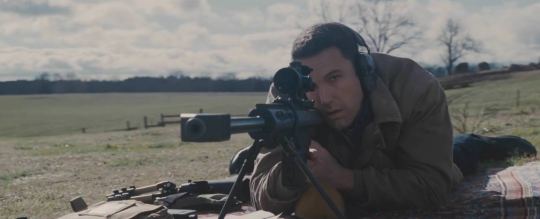
37. The Accountant - One of the most entertainingly uneven films I’ve seen in a long time, “The Accountant” tries to be a character study, a corporate thriller, an operator-style action film, a family drama, a quirky comedy, a PSA about autism, and it even flirts with being an odd-couple romance. It never really comes together in the traditional sense, but I’d be lying if I said it wasn’t a blast watching it try.
The plot is about an autistic accountant who in his secret-life uncooks finances for some of the world’s most dangerous people, and how a seemingly simple assignment in auditing a robotics firm becomes dangerous and blah-blah-blah. This movie has far too much plot and little of it is worth caring about. Where it works surprisingly well is in the character study of the main character, Christian Wolff (who sounds like a name belonging to a character in a cheap erotic novel you can find in airport shops). You see his upbringing, the circumstances that led him to his current career, and his routines in trying to deal with life with high-functioning autism. I (cheekily) said from the start that Ben Affleck is perfect casting for an ass-kicking autist but he’s actually, genuinely, unironically good in a committed and fleshed-out performance that wouldn’t feel out of place in a more serious movie about adults with autism.
In trying to do the other aspects, however, the movie kind of falls apart. The first act is a mostly straightforward setup that you could be forgiven for thinking that it won’t even be a thriller. Wolff’s awkward bluntness around neuro-typicals is played for mild chuckles, because of course it is. Only at the end of it do we see that he’s a badass operator once he’s betrayed and people try to kill him. The second act where a government agent played by J.K. Simmons gives us a 10-minute exposition dump is pretty dull. There’s a hint of some romance between Wolff and a young accountant whose life he saved played by Anna Kendrick, but thankfully it’s never fully realized (“Gosh, I find your lack of social development and the way you cleanly killed the men who attacked me soooo sexy.”)
It’s only in the third act where he goes out to get the people who are after him where the movie becomes a wonderful nirvana of schlock, the “John Wick meets Rain Man” asploitation I hoped it would be. I’m not going to spoil too much, but it has the two funniest plot twists of any film this year, a solid 5 minutes where a caretaker at a home for autistic children gives a PSA about caring for people with disabilities, and a hilarious and completely unnecessary villainous monologue for the ages, courtesy of a paycheck-loving John Lithgow. My only complaint at that point were that there were no accounting-related one-liners in the film, including but not limited to:
- I just depreciated YOUR LIFE
- Don't write me off as a loss just yet
- They must be held accountable
- She's becoming a liability
- He's likes torturing people. He's accrual man
- A character named General Ledger
I don’t know. I chose a dull major, alright?

36. Moonlight – Clichéd dialogue and an annoying tendency to skip over some important/interesting events in the main character’s life, but empathetic performances, a great cast, and a good understanding and balance of the movie’s story and its’ theme of identity. I’m a bit of a tough nut to crack, emotionally speaking, so I feel like the subtle approach from this movie didn’t affect me as much as it did the many people who hail this film as the Second Coming of Christ.
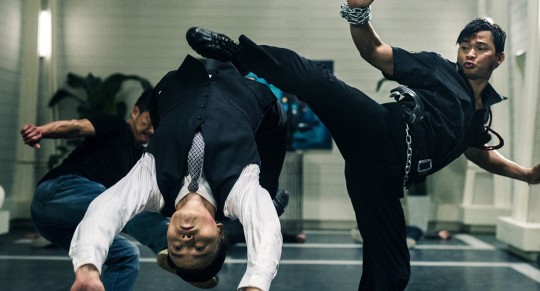
35. Kill Zone 2 – Insane, jaw-dropping, balls-to-the-wall fight scenes that are too often hampered or outright interrupted by that silly and intrusive “plot” nonsense that unfortunately characterizes most post-Jackie Hong Kong kung-fu films. Still, any film that has Tony Jaa doing a flying double knee through a bus windshield and into the driver gets a recommendation from me.
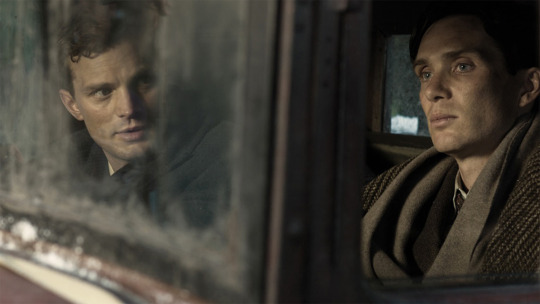
34. Anthropoid – “War is not romantic”.
I’ve always held a soft spot for well-made genre films, and “Anthropoid”, a World War II thriller that, despite a title and poster that look like they belong to some sci-fi horror movie, is certainly that. “Anthropoid” is about a historical real-life mission by the Czech Resistance to assassinate a high-ranking Nazi official in occupied Prague. What I like about this movie is how solemn it is. None of the good guys are clear-eyed heroes who live happily ever after. These are anxious, grimly-professional saboteurs. Most of the resistance members question over whether killing one man is worth the possible consequences it would bring to the Czech people, while the two leads soldier on, determined to follow their orders. Cillian Murphy and the guy from “50 Shades of Grey” (Jamie Dornan) make for a likable pair of leads, and the characters feel human instead of movie-ish. Even during their romances with two local Prague women, it feels less like forced Hollywood trite and more like people trying to comfort each other in a hopelessly bleak environment.
The movie starts slow, but builds well to the more thrilling stuff. Interestingly (minor spoiler), the assassination attempt only occurs halfway through the movie, with the second half being the fallout and repercussions. A more generic movie would have ended with the assassination, before including text commending the bravery of the Czech Resistance and how their mission was successful, but “Anthropoid” instead shows and talks about the horrible things the Nazis did in retaliation, including killing thousands of Czech civilians, before showing what happens to the Resistance members involved in the assassination. I won’t ruin it, but the last half-hour of the movie is pretty devastating stuff.
There’s nothing particularly wrong with Anthropoid, as long as you don’t mind the slow build. It doesn’t really strive for greatness or deep meaning in any way. It’s just a well-made, well-acted, tense, bleak, and morally grey look at an important event in World War II and how it (and war in general) affects people. Bonus points for the cast actually making an effort to speak with Czech accents, instead of the usual historical non-British movie done entirely with British accents.

33. The Siege of Jadotville – Hey, speaking of solid genre flicks starring Jamie Dornan! I love a good war film, so when I heard that when Netflix produced one set during the Congo Crisis of the 1960’s, a refreshing change from the usual “popular” wars like WWII, ‘Nam, and Iraq/Afghanistan, my ears perked up. The plot is about an Irish company of UN peacekeepers who are sent to the tiny town of Jadotville in the resource-rich Congo during a period of upheaval and civil war. Murky politics and other UN operations in the area make things worse, and in retaliation the rebel government and French/Belgian mercenaries send a massive force to attack the isolated Irish troops.
There’s about 40 minutes of setup, in which we see the soldiers (led by Dornan), most of them still teenagers, at home before they get shipped off, we get a broad overview of the political climate in the Congo, including the coup leader and the UN representative sent to assist the central government (played by a shitty hairpiece with a Mark Strong attached to it), as well as the situation that led to tits going up for the peacekeepers. The remaining hour of the movie is the titular week-long siege, with the Irish defending a tactically disadvantaged position with limited food, ammo, and water against a very numerically superior enemy.
All of this is very well-crafted, with good pacing and editing, especially during the battle scenes, which are tense, harrowing, and filmed in a way that you actually get a solid idea of the geography of the siege. History, and even the movie at one point, both say that there were 150 UN troops at Jadotville, but it never seems like there's more than a few dozens of them. It's not a huge issue, but a little distracting.
The characters are pretty thin, with only a handful of the soldiers actually having names, and the writing is nothing special. It’s efficient in the sense that it gets the necessary information across and doesn’t intrude on the story, but it does have the usual clichés you see in a war film. The soldiers are portrayed as brave, noble, and heroic, while the UN leaders and generals are shown as callous, selfish, and incompetent. After some reading into the history, I found that this is not untrue, but it still feels like a conventional audience-pleasing dynamic. To the film’s credit however, it does a nice job of showing how morally grey the conflict was, without really claiming moral superiority for either side, but still makes you care for the UN soldiers at the heart of it. Even the trademark ending text is done tastefully and respectfully.
If you want a compelling, well-crafted war film and have a Netflix subscription, then “The Siege of Jadotville” is worth checking out. Between this and “Anthropoid”, Jamie Dornan has proven himself a capable (and wonderfully mustached) leading man, and in my eyes has done a good job getting his reputation back to “respectable” after “Fifty Shades of Grey” and...oh, there's two sequels to it coming out? Well, here's hoping for more good war films from the lad afterwards.
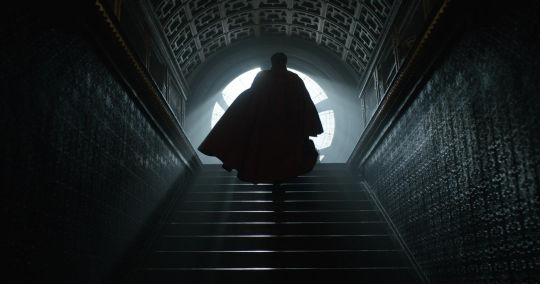
32. Doctor Strange – Same-old shit from Marvel, in terms of writing and story, but at least contains enough beautiful visuals and creativity to take away a good deal of the staleness. Bonus points for having a climax that is the exact opposite of a typical superhero destruction-fest.

31. The Magnificent Seven – At a film festival like TIFF, which is mainly meant for foreign, independent, arthouse films and prestige pictures, “The Magnificent Seven”, a remake of John Sturges’ 1960 original and an unapologetic, old-fashioned Western, stands out. As a genre-film aficionado, that appealed to me enough that I saw this movie even though it would come out in theaters a few weeks later.
And I’m glad I did. “The Magnificent Seven” is just plain, loud, over-the-top fun. If you see the trailer, the movie is exactly what you think it’ll be like. A woman seeks frontier justice against the power-hungry coal baron who terrorizes her town and murdered her husband, and pays a bounty hunter (Denzel Washington, who looks like he was born to play a cowboy in this movie) to go after him. He recruits 6 more outlaws, killers, and warriors to aid him in his quest to protect the honest townsfolk from the evil businessman and his army. Whiskey is drunk, guns are drawn, banter is exchanged, and lots of people get shot and blown up. Antoine Fuqua (an expert in making solid genre flicks) keeps the movie paced well, gives the characters breathing space to flesh out a bit, and makes the action loud, exciting, and well-filmed. No shaky-cam bullshit here, just good, efficient filmmaking with lots of nice Western vistas.
The cast is strong, especially Washington and Chris Pratt (who I worried would be out of place but acquits himself well here), along with solid supporting players. The writing is nothing special, but gets the job done, although there are some unfortunate missed opportunities at character development and payoffs, especially when it comes to Ethan Hawke’s (fabulously named) Goodnight Robicheaux, a former Confederate sharpshooter who hung up his guns. Also, a minor issue, but the film severely overplays how effective a mid-19th century gatling gun is.
There’s nothing altogether remarkable about this remake from a quality standpoint, but in a year filled with failed reboots and sequels and unremarkable superhero films, a good, solid personality-filled Western shoot-em-up about a multicultural team of badasses teaming up against the evil establishment is more than a welcome breath of fresh air.
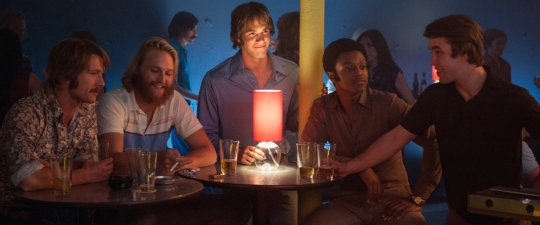
30. Everybody Wants Some!! - Richard Linklater’s spiritual sequel to “Dazed and Confused” feels very much like a Richard Linklater film. There’s not much plot; it’s just about a college freshman baseball player and his team’s escapades over the weekend before the semester starts in the fall of 1980, as they hang out, go party, try to get laid, and attend their first practice. There’s no real structure to this film. It’s meandering in typical Linklater fashion, where the movie is more about the characters, the setting, and the dialogue. If you don’t mind this sort of thing, “Everybody Wants Some!!” is a very enjoyable movie. The characters and performances are on point, the banter is entertaining, the music is great (used especially well during a scene where the characters drive around town singing “Rapper’s Delight”) and even when Linklater waxes philosophical as he sometimes tends to, it feels less pretentious and more like the characters being themselves. When they talk about life, man, they’re often drunk or high or sleep-deprived, which feels like a nice bit of self-awareness from Linklataer. It even gets a bit inspirational at times, as the themes of finding out your identity and place in life and making the most of your short time on this Earth hits home surprisingly well. Funny, charming, and likable in every way that “Boyhood” wasn’t, “Everybody Wants Some!!” marks a welcome return to form for Richard Linklater, which is amazing considering it didn’t even take TWELVE YEARS to make.
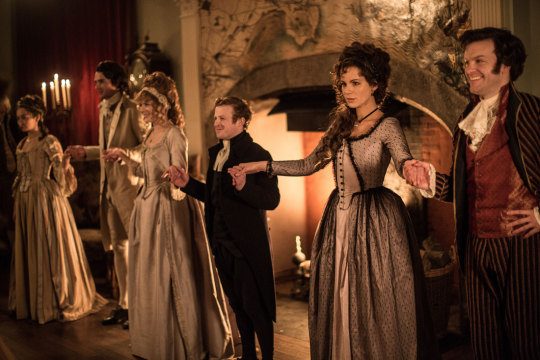
29. Love & Friendship – Not being a big fan of hoity-toity costume dramas and having never read any of Jane Austen’s work, I really didn’t think this Austen adaptation would appeal to me. However, following the initial 10-15 minutes where my brain adjusted to the Regency-era English, I found that I really enjoyed this film. It’s a comedy of manners centered on a widowed socialite (played by the never-better Kate Beckinsale), a cunning and manipulative woman who is well-known as the best flirt in London, and her attempts to get her daughter married to a wealthy suitor as she herself juggles those in her social circles. I found myself loving the barbed interplay between well-written characters. The cast is uniformly excellent, with a strong performance by Beckinsale and a show-stealing turn from Tom Bennett as a wealthy but utterly gormless suitor, the kind of man who keeps talking even when he doesn’t know what he’s talking about, and who is completely enchanted by the “tiny green balls” at dinner (peas). The whole movie is kind of plotless, with very little narrative drive and it feels like important character developments are often skimmed over (two characters have a pleasant conversation in one scene and are married like, 5 minutes later). The whole movie feels very light, albeit very watchable. Watch it for the excellent cast, the lovely sets and costumes, and for the genuinely hilarious writing, but don’t expect to be all that invested in what happens. The whole thing feels like a dinner party with much wittier and politer versions of your extended family, albeit just as catty and spiteful.
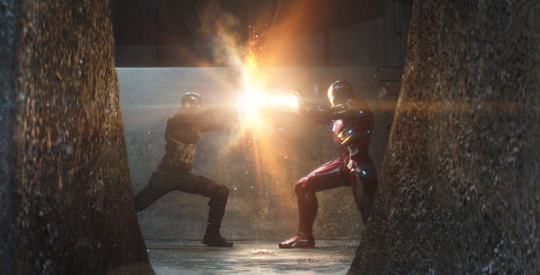
28. Captain America: Civil War - By now most people have acknowledged the problems with the Marvel Cinematic Universe. While most are solid superhero flicks, they all feel kind of safe and sterile, films marked-tested to appeal to as large an audience as possible. While this leaves less room for error, it also limits how good they can become. If all you want is good actors wearing ridiculous costumes punching each other and destroy expensive CGI environments while mumbling groan-worthy quips, the MCU has got you covered. Those of us who want them to approach something like Raimi’s Spider-Man films or Nolan’s first two Batman films are often left wanting. Sometimes it has gotten better than the norm. The first half of “Captain America: The First Avenger” was excellent before it became kind of a rushed mess in the second. Shane Black’s “Iron Man 3” felt like the only genuinely auteur-driven film in the whole MCU (if only because so much of the humor is based on what Black and Downey Jr. accomplished in “Kiss Kiss Bang Bang”). “Captain America: The Winter Soldier” is still the high point of the MCU, a terrific and surprisingly character-driven action thriller that barely felt like a superhero flick. The point I’m laboriously trying to get to is that while “Civil War” for the most part takes itself seriously and actually approaches “Winter Soldier” levels of greatness, it can’t help but fall back on the lame, quippy, fanboy-masturbating sameness that has defined this cinematic universe since Joss Whedon first got involved with the franchise.
The plot is that a mysterious man frames Captain America’s friend Bucky for a terrorist attack, while Tony Stark feels guilty about collateral damage caused by the Avengers’ various battles and wants to sign some UN accord to make the Avengers government regulated, and tries to hunt Cap down when he goes rogue to try and protect Bucky. It’s pretty convoluted stuff if you’re not already caught up on the franchise, but not too difficult to follow. My main concern going into this film was that it’d be more of an “Avengers” film than a “Captain America” film. Cap’s films have a good track record, while the two Avengers movies are kinda crap. Thankfully, the heavy focus is on Cap and his efforts to protect Bucky from an increasingly hostile and angry Tony Stark. Despite what the marketing tries to say, the whole UN accord business feels minor at best, only there for a #WhoseSideAreYouOn hashtag to appease the autists who want their precious comic-book to be faithfully adapted. The story is surprisingly engaging, and while the aforementioned mysterious man is the real villain and does an effective job, the role of antagonist is actually filled really well by Iron Man. The characters are given enough room that pretty much everyone in the ensemble gets a moment to shine, the pacing is good, and (despite the Russo Brothers’ annoying use of shaky-cam and fast editing) the action scenes are solid and actually serve a purpose. It was almost a great “Captain America” film. And then Spider-Man shows up.
Spider-Man was added to this film halfway through filming due to Marvel striking a deal with Sony Pictures for the rights to the character, and his crowbarring into the movie is really obvious. There’s a whole half-hour of the movie that he’s in, where from introduction to the big punch-up at the airport to his exit, it feels like a completely different film, filled with the aforementioned light-hearted quippy humor that pretty much completely dissolves all tension, momentum, and conflict that movie had done a pretty good job building up to that point. It’s not bad in and of itself, but it feels like it suddenly became an “Avengers” movie, a big-budget re-enactment of a 10-year-old boy playing with his action figures. The only reason I don’t despise this part of the movie is because it at least has a few genuinely funny moments (most of them courtesy of Paul Rudd’s Ant-Man). The film recovers fairly well from this, and actually serves up a strong and pretty emotional climax that isn’t just wanton CGI destruction, but it still left a bad taste in my mouth, like I was bukkake’d by neo-nerd hipsters while sleeping and managed to clean myself off but the stains on my soul remained.
Look, I’ve said a bunch of negative (and some disgusting) things about this movie and the MCU in general, but “Civil War” is overall a good movie. The character work is strong, it’s occasionally funny, the cast is mostly terrific, and it’s definitely in the upper-echelon of this franchise. But the things that hold this series back (the sameness, the dull visuals, the lack of stakes, circlejerking, etc.) hold this movie back as well. Who knows? Once they’re done with this phase of the MCU, they can actually start to experiment and not just make the same kind of movie over and over, because let’s face it; people will come see these anyway. Hell, give me a She-Hulk movie directed by David Lynch, or a blaxploitation-style origin story about Nick Fury starring Michael Jai White, or a musical romantic-comedy about Squirrel Girl directed by George Miller. I don’t know. I’d rather see any of those than ANOTHER GODDAMN SPIDER-MAN REBOOT.
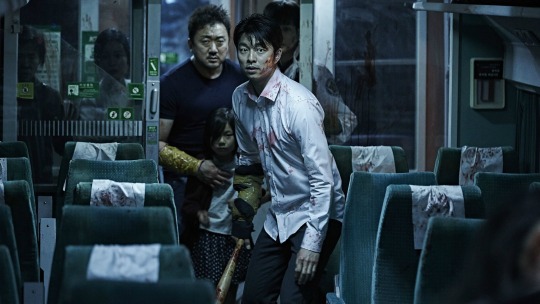
27. Train to Busan – Pretty much what you’d expect, plot and character-wise, from a zombie movie, but damned if South Korea doesn’t possess some of the finest film directors in the world, and Yeon Sang-Ho brings his A-game to revitalize an appropriately undead genre. Great cast, intense and creative set-pieces, and a nicely emotional focus on character. I’m not Korean, so I’m not sure if there’s any satire or message involved (the film does seem like a pretty accurate depiction of South Korea when StarCraft II servers go down). Somewhat dragged down by iffy CGI and the hair-pulling stupidity and dickheadedness of main human antagonist, who makes “The Walking Dead” Season 2-era Shane seem like a rational and believable fellow.
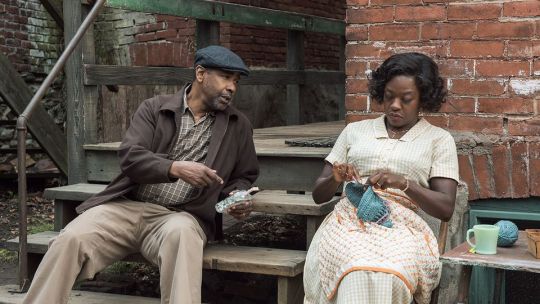
26. Fences – Little more than a filmed play, but a well-filmed one bolstered by good writing and knockout performances from Denzel Washington and Viola Davis. About 20 minutes too long.
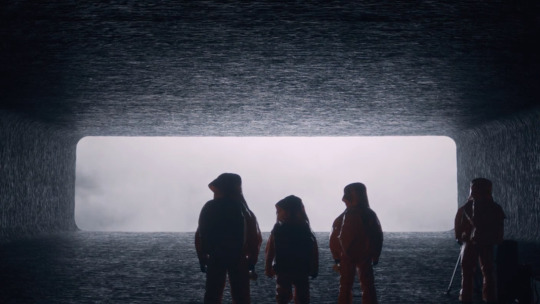
25. Arrival - Canadian director Denis Villeneuve has been making quite the reputation for himself in recent years for his mature and well-crafted thrillers. While I find his movies just a touch overrated, I do admire a lot in them, from the technical craft to his ability to command strong performances out of all of his actors. This year’s “Arrival” continues that trend, marking his most mature film to date and one of the extremely rare mainstream hard science-fiction movies to come out these days. This is not a movie about laser battles and space explosions and sticking your tongue down the throats of hot human-looking alien babes (I’m excited for “Mass Effect: Andromeda”, alright?), but about communication.
Several banana-shaped alien spacecraft touch down at random points around the earth without any apparent motive or pattern, and countries around the globe bring experts together to try and communicate with them. The plot centers around linguistics professor Amy Adams, who is brought in by the military along with a physicist played by Jeremy Renner to head into the alien craft in America to try and set up communications with the aliens. It’s a neat perspective to see one of these alien contact movies from someone trying to understand them rather than fight them, and Amy Adams turns in another strong performance as a woman who is experiencing a personal crisis while being at the very center of a worldwide phenomenon. The rest of the cast is good too, but this is her movie to command, and she does so with ease.
While Villeneuve no longer has Roger Deakins as director of photography to rely on, he and his new DP Bradford Young make this a very strikingly beautiful movie, filled with bleak subdued colors but with an astonishing sense of scale. The scene where Amy Adams enters the alien craft for the first time is outstanding, with the camera work, lighting, and environment doing a genuinely amazing job conveying how…well, alien the ship feels. I also like the design of the aliens themselves (a sort-of cross between the facehuggers from “Alien” and the Reapers from “Mass Effect”), a refreshing change from the humanoid aliens you typically see in sci-fi.
The plot is surprisingly brainy, primarily concerned with the process of establishing of communication and later a very different perception of time and choice from how we typically perceive them. It’s not too difficult to wrap your head around this stuff, but you do have to pay attention, because this isn’t a movie that dumbs itself down or holds your hand.
As much as I admire and enjoyed the movie, I do have a criticism, and it’s that the whole thing feels…cold. I don’t just mean the color palette or the really strong air conditioning in the theater where I watched it. I mean emotionally cold. I’ve heard a lot of people praise how emotional the film is, but it didn’t really affect me all that much. Even the scenes with Amy Adams and her daughter, no matter how Malick-y they’re shot, felt mostly like salad dressing to try and make the audience connect with the main character. Even when you (no-spoiler) find out the plot significance of these scenes, I liked it much more on an intellectual level than on a gut-level. Also, and this part is hard to explain without spoilers, but there’s a love story that’s pretty crucial to the theoretical concepts later in the film that feels comically underdeveloped, like we’re supposed to believe these people fall in love despite working with each other for a few days and rarely talking about anything other than work (and because they’re attractive movie stars, of course). Plus, there are quite a few annoyingly clichéd characters, like the fear-mongering radio talk show host, the weary and no-nonsense military man, and a Chinese officer named General Shang who apparently rules the entire country of China without answering to anybody.
Despite these niggles, I still liked “Arrival” a lot. It attempts (and in my mind strongly succeeds) to present a realistic scenario of what alien contact would be like in today’s political and cultural climate, and again, it’s really refreshing to see a science-fiction film where science, communication and peace are used for conflict resolution as opposed to violence. It’s really ambitious on both a thematic level and a technical one (the special effects in this movie are some of the most seamless and believable I’ve ever seen), and even the problems I have with the writing don’t distract from Denis Villeneuve’s directorial talent. Here’s hoping he doesn’t screw up the new “Blade Runner”.

24. Shin Godzilla – Lacks the awe-inspiring visuals and sense of scale of Gareth Edwards’ “Godzilla” (which I forgive because this had like 1/10th the budget), but makes up for it with a richer story and sense of humanity. Whereas that film is about our powerlessness at the hands of giant monsters, this one is more about working together to overcome it. What begins as a bureaucratic farce eventually gives way to the Japanese government putting aside any squabbles and politics to focus on saving the lives of its citizens from a giant, rampaging lizard. It’s kind of inspiring to see a movie like this where a government tries to prevent destruction instead of causing it (with a not-so-subtle pisstake of the Americans, whose contribution to the efforts amounts to little more than bombing and almost nuking Tokyo). Plus, Godzilla himself is awesome here, looking and acting like a genuine monster, and pulled off with a nice mix of practical and digital effects (other than his initial form where he looks like a retarded CGI iguana with googly eyes). Kickass soundtrack, as well.

23. War on Everyone – “I’ve always wondered; if you hit a mime (with a car), does he make a sound?” Michael Peña’s character wonders out loud at the start of the movie, right before he and his partner (and driver) find out. Within one minute of the movie, you already know if it’s for you or not. “War on Everyone” is about two cops (Peña and Alexander Skarsgård) who are as corrupt as they come. They regularly blackmail and beat up suspects, take bribes, and drink on the job. They never really try to justify this behavior. Their attitude can be best summed up by a line Skarsgård says before getting into the driver’s seat of a car while piss-drunk; “Let’s go fuck some scumbags.” There’s some plot about their investigation into a robbery/murder orchestrated by the guy from those shitty “Divergent” movies who looks like discount-Toby Kebbell, but the plot feels like an afterthought. It’s more so about the two characters and their antics and their musings on life, greatly enlivened by the excellent performances and chemistry of the two leads, as well as the cracking, pitch-black funny script from writer/director John Michael McDonagh (who also made the fantastic Irish gems “Calvary” and “The Guard”). This feels like if McDonagh made a Shane Black film. It’s not a powerful meditation on faith and morality like “Calvary” and it’s not a great character-study like “The Guard”, but “War on Everyone” shows that even a lower-tier McDonagh film is still as hilarious and biting as they come, and it even comes with a bit of heart and soul. Still, definitely not recommended to the easily-offended. It feels kind of pointless, but I could listen to McDonagh characters talk shit to each other all day.
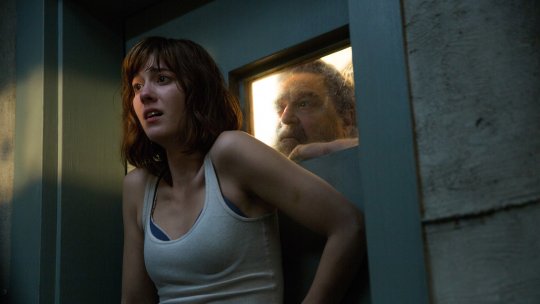
22. 10 Cloverfield Lane - I will try to be as spoiler-free as possible in this review. Honestly, if you STILL haven’t seen it and want to, just go watch it and know that it definitely comes recommended.
I’ll admit it; even though I wasn’t a huge fan of the shaky-cam monster-athon that was “Cloverfield”, the mysterious and vague trailer for “10 Cloverfield Lane” got me properly hyped up as I tried to figure out the connection between the two movies. In an unusual twist, most of the movie is only tangentially a work of science-fiction. The plot is about a young woman named Michelle who runs away from home as some vague disaster occurs. She’s knocked out, and wakes up in an underground survival shelter run by a paranoid survivalist named Howard, along with a young guy named Emmett. Howard says that there has been a massive attack, but Michelle is skeptical and is unsure if Howard is trustworthy or crazy.
The bulk of the film is in the bunker, as the trio try to cope with the various realities of living in a survival shelter, including each other. This entire section is excellent. Deftly alternating between lighthearted bonding, uncomfortable comedy, and pressure-cooker intensity, debut director Dan Trachtenberg shows he is an expert when it comes to tone, pacing, and atmosphere, further enlivened by Bear McCreary’s terrific score. Even better is the main trio of actors, all of whom play off of each other well and really flesh out their characters. The guy who plays Emmett displays a dopey likability that suits the character well, while Mary Elizabeth Winstead makes Michelle much more intelligent, tough and compelling than your average "horror" protagonist (I use that term broadly). Powerfully commanding the whole movie is John Goodman, who easily makes Howard sympathetic at times and genuinely terrifying at others. This is a brilliantly batshit performance by one of our very best character actors, and even if the rest of the production wasn’t up to par (which it definitely is), he alone would make this film worth watching.
The reason this movie isn’t higher on my list is because of the last 10-or-so minutes. Without going into detail (and the trailer gives this away anyway), Michelle leaves the bunker by the end. It’s like the entire film gets wrapped up and ends satisfyingly, but then it goes on for another 10 minutes that feels like a completely different movie with a whiplash-inducing change in tone. It’s all still skillfully made and well-acted, but the effect just feels bizarre if you’re watching it for the first time. At first I thought the sequence was there to connect it to the first “Cloverfield” and make it a semi-sequel, but it’s too vague for me to buy it.
Maybe it is all some continuous “Cloverfield” universe, or better yet, it’s an anthology film series in the vain of “The Twilight Zone” or “Black Mirror”, one where talented up-and-coming directors make unique sci-fi thrillers. If that’s the case, it’s best not to read too much into the ending, and to just try and accept the movie as a standalone despite the jarring tonal shift at the end. One thing I actually quite liked about the ending is that it satisfyingly concludes Michelle’s character arc, making her a surprisingly well-developed protagonist that has actually grown by the end. Maybe if I watch this again (and I do plan to), I’ll like it more and probably give it a higher spot on the list, but even on a first impression, “10 Cloverfield Lane” is an engaging and balls-tighteningly tense thriller with a top-notch cast and production working at the top of their game. John Goodman is so good, man.

21. London Has Fallen – Holy hell, where do I even begin? Rare is the movie where I honestly cannot tell if it’s trying to be a comedy or not. It has a serious post-9/11 depiction of terrorism, but it treats all the bad guys like cannon fodder to be disposed of in spectacular ways. It has some lines about the consequences of U.S. foreign policy in the Middle East, but these lines are throwaway at best and never brought up again. It tries to somewhat humanize its villains, but it also has Gerard Butler executing a wheel-chair bound terrorist before going on a tirade about how they’ll never win and that America will still be standing in a thousand years (not sure if the Third Reich comparison is intentional).
The action scenes are competently shot/staged, if unremarkable (despite a fun CGI-assisted long-take shootout). The script feels like it was either written in a weekend or improvised on the spot by Butler and company. In fact, I feel like this wasn’t originally written as a sequel to “Olympus Has Fallen”. None of the previous movie’s events are referenced, and all the recurring cast members (save for Butler and Aaron Eckhart) feel like glorified crowbarred-in cameos. It’s absurd to have a White House cabinet of Oscar winners/nominees and give them all a collective 5 minutes of screen-time. I’m pretty sure Oscar-winner Melissa Leo doesn’t even have any lines. I’m sure the paycheck was nice, at least. The first 15 minutes or so are fairly boring, even if things pick up considerably afterwards.
The one indisputable quality this movie has is Gerard Butler. Butler gives a genuinely jaw-dropping performance as bloodthirsty and very likely insane Secret Service agent Mike Banning (our hero, naturally). Mike Banning is the type of guy who reacts to getting shot in the shoulder and the birth of his child with roughly the same facial expression. Mike Banning is the type of guy who despite being very proficient with and usually having convenient access to firearms, frequently elects to brutally stab the bad guys numerous times with a combat knife. (“Was that really necessary?” President Aaron Eckhart asks after Banning slowly stabs a terrorist in the ribs to death while making his brother listen via walkie-talkie. “No”, Banning bluntly admits.) Even from the peaceful initial scenes of him accompanying the President on a jog or talking to his wife, you can tell something is very off about him. We as the audience are of course expecting/awaiting shit to hit the fan, but Butler is nearly trembling with anticipation to start murdering terrorists during these scenes. Butler makes almost every bit of dialogue sound like a badass one-liner, on one occasion offering the President a glass of water while saying “I don’t know about you, but I’m thirsty as fuck”, spewing the word “fuck” out of the side of his mouth like a shotgun blast. Even on the off-chance that the movie isn’t taking the piss, Butler most definitely is. I’m not being ironic when I say that this is one of the great comic performances of our time, and the success of the movie (for me) is due to the movie being centered around Butler and his hilariously absurd machoism.
The director of this movie is an Iranian who escaped his war-torn home to Sweden as a boy. This, coupled with Butler’s performance, Butler and Eckhart’s borderline-homoerotic bromance, the ridiculous one-liners and speeches, and an indefensibly heroic portrayal of drone-warfare, makes me feel like “London Has Fallen” is really one big satire of U.S. foreign policy subtly disguised as a stupid, offensive action movie, something conservative idiots will applaud, liberal idiots will condemn, and fun, smart, attractive people will appreciate and enjoy for what it is. I saw this and “Gods of Egypt” with a few friends as a sort of once-in-a-lifetime Gerard Butler double-feature, and I had a grand time.
I felt like I could smell this movie, and I like that. Watching “London Has Fallen” is like sex; You wouldn’t want someone walking in on you during, and you’ll probably want to take a shower afterwards, but once you get past the initial foreplay, it’s a great time from start to raucous, bloody finish.
Wow, that metaphor got gross in a hurry.
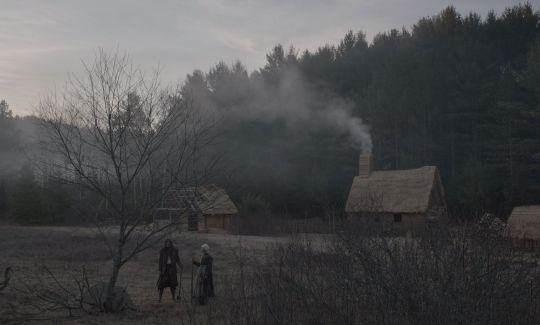
20. The Witch – I put off watching “The Witch” because every time in the past few years that people heralded the newest “great, modern horror film” (It Follows, The Babadook, etc.), I found them to be massively overrated and even a bit disappointing, even despite their good qualities. After finally seeing it, I can safely say that it’s definitely one of the best horror films in years (which isn’t saying much, but still).
The story is of an early 17th century Puritan family who get exiled from their village and set up a farm in an isolated area near the woods. Strange supernatural things start happening to them, and the movie becomes the gradual degradation of their mental states, as they start to blame and fight amongst each other, not unlike my beloved “The Thing”.
This is a very atmospheric, slow-burning kind of horror. The emphasis is on creeping dread rather than murdering attractive 20-something teenagers. For a first-time filmmaker, director Robert Eggers shows an excellent grasp of pacing, tone, and visual storytelling. Once you get used to the historical Ye Olde English manner in which the characters speak (subtitles are recommended), the writing is surprisingly quite good, with well-defined characters with clear conflicts and motivations. The acting ensemble is terrific. The whole movie is pretty much just two parents, a teenage daughter, an adolescent boy, and two young children, and they are all fantastic. Seriously, as someone who despises children (both in real life and in film), this is some of the best child-acting I’ve ever seen.
My problem with the movie is that (and this is kind of a spoiler, but it happens early in the film) I was hoping that it wouldn’t be clear whether or not the supernatural stuff is actually happening, or if the family is just losing their minds because of some clever metaphor or allegory. But no, it’s revealed pretty early on that it is actually supernatural stuff, which takes away some of the surprise and the suspense. The music is the kind of discordant “unnerving” string-heavy stuff you’d expect in a horror movie, and I often felt that silence would be much more effective during the scenes it’s used in. Also, without giving away anything, the ending is pretty silly. It wraps up the story and the character arc of the lead character (the teenage daughter), but the manner in which it does it felt kind of over-the-top. You know what, though? I honestly thought we would get some shitty, cop-out, cut-to-black ending 5 minutes earlier, so it’s not that big of a deal. I’ll take a retarded ending over a non-ending any day of the week.
“The Witch” is a horror movie for those who don’t like horror movies, and one that treats its audience with intelligence and respect, and (the last few minutes notwithstanding) is actually satisfying and builds well to its climax. As someone who doesn’t care much for horror movies, I would say that “The Witch” lives up to the hype, and is well-worth checking out. Also, best (and surprisingly similar) use of a goat since Sam Raimi’s “Drag Me to Hell”.

19. Nocturnal Animals – A problem a lot of movies have for me in particular is when they’re tonally or stylistically inconsistent, feeling like two separate movies at odds with each other. Tom Ford’s “Nocturnal Animals” is a rare example of a movie with strikingly different stories complementing each other and actually improving the end product. The film is about a LA art exhibitor played by Amy Adams, who has an unhappy personal life despite her successful professional life. One day, her long-estranged ex-husband sends her a copy of his upcoming novel, a violent thriller about a family man terrorized by hillbillies in West Texas. The movie cuts between the novel’s story, Adams’ current life, and her past relationship with the ex-husband.
Tom Ford showed with his debut “A Serious Man” that he was great at filming and telling a story about people in rich houses being sad, as he does here, but also displays an uncanny talent at filming a gritty desert-set revenge tale. The parallels between the real life story and the novel are very finely drawn, and while I found the novel sections much more gripping than the Amy Adams story, the seemingly-disparate styles and tones never clash and instead fit really well with each other, creating a movie that is more than the sum of its parts. For a fashion designer, it’s surprising how good of a writer and director Tom Ford is, and he shows that “A Single Man” wasn’t just beginner’s luck.
Also helping the movie is the fantastic cast. Jake Gyllenhaal gives one of his best performances as both the ex-husband and the protagonist of the novel story, and Amy Adams shows incredible nuance and subtlety, reminding us why she is one of the best actresses working today. Michael Shannon steals the show for me (yes, I love him and I’m biased, shut up) as a shady detective in the novel’s story. All the supporting players are great as well, even if their roles aren’t as meaty.
My main complaints are that the dialogue is sometimes silly, some of the supporting characters are pretty one-dimensional and cartoonish (Amy Adam’s current-day husband played by Armie Hammer is a distant businessman who has to go away to New York to “make that very important sale”), and that the editing is a little wonky and overdone at some minor points. I initially had mixed-feelings about the ending, feeling that it was a bit anticlimactic and expected more to happen, but after thinking about it and how it ties to the movie’s themes and character relationships, I like it a lot more in retrospect. Unlike the movie, I can’t think of a good way to wrap this review up, but I’ll say that “Nocturnal Animals” is engaging, unique, and worth checking out, so let’s move on.

18. The Wailing – Its imposing length and frustrating lack of resolution/clarity can be hard to overcome for some people, but this South Korean supernatural horror flick is (in terms of acting, writing, directing, pacing, editing, themes, and just plain scariness and dread) the best and most effective horror film in quite a while. Like a bloodier and more emotionally tormenting version of “The Witch”.

17. La La Land – Before some of you call for my beheading for placing “La La Land” this “low” on my list, let me begin by saying that I still enjoyed the damn thing. From a purely technical perspective, “La La Land” is hands-down one of the best films of the year. Damien Chazelle’s immaculate direction perfectly captures the nostalgic sense one gets from watching old Hollywood musicals. This, coupled with terrific musical numbers and game actors makes “La La Land” an easy movie to enjoy. The story, however, is where the movie is a bit shaky.
The plot is about a down-on-their-luck aspiring actress and jazz pianist who fall in love while pursuing their dreams, and struggle to deal with the reality of keeping their relationship together while their paths go in different directions. The movie goes for a contrast between a magical, cheery Hollywood musical and a more grounded, dramatic approach, but for most of the movie it doesn’t quite gel as well as one would hope. I loved the first half of the movie, where it’s an extravagant musical about aspiring artists, but halfway through, it kind of jarringly becomes a relationship drama, with hardly any musical numbers, and this part seriously drags. It’s only near the end where Emma Stone sings her big “Give me an Oscar, goddammit” number that I even remembered this movie was supposed to be a musical. It’s like the movie takes two different approaches to its material, whereas one middle-ground approach (keep the big musical bits throughout but make them gradually more dramatic) would have made the movie a lot better, in my opinion. It doesn’t help that the two lead characters just aren’t very interesting. Don’t get me wrong; Emma Stone and Ryan Gosling try their damnedest here, but it feels more like two likable actors playing parts instead of real people with flaws and humanity, a feeling exacerbated by them not even having that good a chemistry.
If you can put up with an uneven viewing experience long enough, the film rewards you with one of the best endings I’ve seen in years, one where the themes, motivations, and songs are meshed together in a perfectly bittersweet sequence that actually makes up for a lot of the film’s flaws, and the one point in the film where the aforementioned contrast between fantasy and reality is perfectly in sync with the filmmaking style. It’s here where it stops being a movie about struggling artists and becomes something grander; a film about following your dreams but realizing that life never really works out the way you intend. This and the opening single-take number are ones for the ages, and make the film worth watching all by themselves. To put it in a one-sentence review, “La La Land” is still a case of a movie musical being really good in the first half but fizzling out in the second (something which happened in every one I’ve ever seen besides the “South Park” movie), but at least it recovers well enough to leave a positive impression.
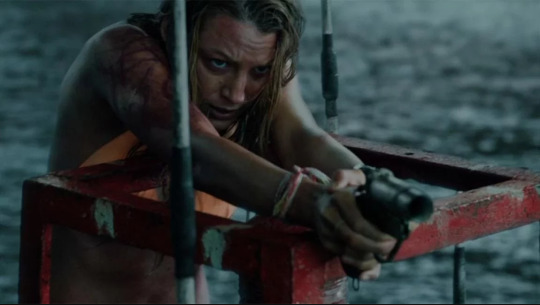
16. The Shallows – I’m as surprised as you that this “hot-girl-gets-attacked-by-shark” film is this high up on my list, but here we are. Blake Lively plays said hot girl, a medical student who travels to an isolated beach in Mexico as a sort of spiritual journey/tribute to her deceased mother, and before long gets shark’d and stranded a few hundred feet from shore on some rocks during low-tide. I thought this would be the sort of cheeky, “Piranha 3D”-esque exploitation flick, but “The Shallows” actually has enough confidence to take itself fairly seriously. The main character has intelligence and some depth and even an arc (as obvious as it may be), and she’s buoyed by Lively’s terrific and believable performance. The shark is intimidating and scary, even when it’s not onscreen. The film has a good sense of progression, gradually escalating the threat level before arriving at the admittedly over-the-top but highly entertaining finale. It has a scene of the main character performing surgery on herself, which for some morbid reason I’ve always enjoyed seeing in movies and shows. And to top it all off, there’s a seagull that befriends the main character as she’s stranded, played by an actual trained seagull whose reactions (and lack thereof) are hilarious and his role in the plot surprisingly affecting. This seems like a stupid thing to harp on about, but if there was an Oscar for Best Performance by an Animal, Sully the Seagull’s performance as Steven Seagull would easily take home the prize.
There are a few issues, like how the main character tends to speak too much to herself (i.e. the audience) about her situation, and while I didn’t hate the very end of the movie, I do wish the film had ended a minute or two earlier right when it had a perfect moment to do so, instead of going on with an epilogue. However, given the expectations I had going in, director Jaume Collet-Serra uses Blake Lively’s good looks and strong acting ability, the beautiful camerawork and setting, his storytelling skills, and an adorable seagull to blow those expectations completely out of the water (har-har).
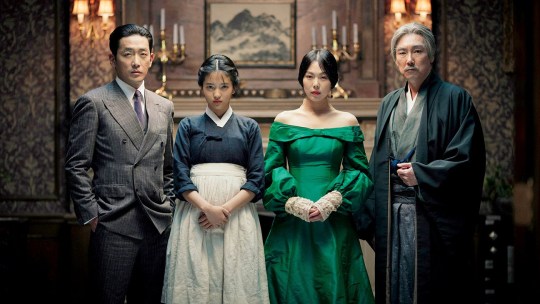
15. The Handmaiden – Gorgeously filmed, lurid, and thoroughly entertaining Korean erotic thriller with strong performances, writing, and a wonderfully dark sense of humor (an attempted hanging scene yielded one of the year’s biggest laughs for me). Strikes a good balance between artful grace and trashy pulp.
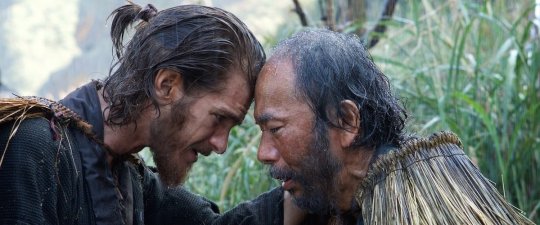
14. Silence – Of the 2016 films in which an accented and deeply religious Andrew Garfield has his faith tested by horrific violence committed by the Japanese, I like “Hacksaw Ridge” more, but this is still a powerful and deeply personal look at faith from Martin Scorsese. A challenging movie, but rewarding if you put in the effort to understand it thematically. A bit overlong and repetitive in the middle portion (though this is probably intentional), and I feel like the movie would be better if Garfield and Adam Driver switched roles, but from the moment Liam Neeson comes back into the movie, it’s outstanding to the end.

13. The Dressmaker – In the early ‘50s, a bus rolls into a tiny, rural Australian town that looks like something out of a Western. Out steps Kate Winslet, accompanied by a Morricone-esque guitar and violin, immaculately dressed and carrying a sewing machine in her case, who proceeds to light up a cigarette and say “I’m back, you bastards.”
Two minutes in and you already know you’re in for a fun movie. Winslet plays a dressmaker who returns to her hometown after being banished as a child to care for her cantankerous mother (Judy Davis), and before long, dredges up a lot of bad blood among the townsfolk that hurt and humiliated her years ago. To say any more would be to spoil the wonderful weirdness that emanates from this film. “The Dressmaker” blends family melodrama, Western, comedy that ranges from the dark to the surreal to the slapstick, campiness, tragedy, romance, and revenge. It’s a mess, sure, but it struts along with such confidence in itself and its source material that all these seemingly disparate elements miraculously work together, for the most part. It helps that Winslet and Davis are so excellent that they deftly maneuver through all these tones and keep you engaged in what’s happening. It’s tough to say what kind of person I’d recommend this to, but I’ll say this; If you’ve always wanted an Australian Western version of “Twin Peaks” where the protagonist is a female couturier instead of a male gunslinger, then “The Dressmaker” will quench that extremely particular thirst.
A note on why I consider Kate Winslet to be one the best actors in the business: SHE IS A FOREIGN ACTOR THAT NAILS A PERFECT AUSTRALIAN ACCENT.

12. 20th Century Women – Mike Mills somewhat tones down the quirkiness from “Beginners”, but still delivers a personal, heartfelt, and funny portrayal of humanity, here subverting the typical coming-of-age story of his teenage boy self-insert protagonist by focusing the film on the women in his life and how their feminist strength and independence help shape him as he grows up. Fantastic performances from Annette Bening and Greta “Love of my Life” Gerwig.

11. Moana – Beautiful visuals, wonderful music, top-notch voice acting, and a compelling and even touching story. I was pleasantly surprised by how long the movie took to set up the characters and their relationships and individual personalities before diving into the adventure. Even the stuff I normally find annoying in Disney movies (needless action scenes, cute animal sidekicks, hip modern references) are toned down here. Maui (voiced by The Rock, who has more charisma than the ocean has water, and a nice singing voice to boot) is extremely entertaining, but Moana is surprisingly a compelling character herself, someone who has aspirations and flaws and a sense of agency, as opposed to the usual dull Disney heroines who unwillingly fall into their fate before falling in love with Prince Flawless McGeneric. Great, empowering message (especially for young girls) about forging your own path in life. A million bonus points for not giving Moana a forced love interest. Another million points for Jemaine Clement as a giant, singing crab. Best animated film of 2016 by a wide margin. Disney’s best non-Pixar movie since “Lilo & Stitch”. Probably my favorite Disney Princess movie. I don’t care what anyone says; “Moana” was fucking lit.

10. Eddie the Eagle – One thing I’ve noticed about myself lately is how sick I am of “irony”. Not in the dramatic sense, but in the “replacing sincerity and any genuine feeling with some detached sense of humor” sense. I think it was the inexplicable but somehow expected rise in popularity of a meme involving a dead gorilla that did it for me. But my point is, lately I’ve been finding myself watching movies otherwise labeled as “corny” or “cheesy” by jaded, cynical and emotionally detached people, who do so just because said movies believe in their own stories without shame or self-referential humor. Well, fuck those people. They can rot in hell along with their precious gorilla.
“Eddie the Eagle” is about Michael “Eddie” Edwards, a British skier who despite having very little experience and natural talent managed through sheer determination and willpower to accomplish his dream of competing in the 1988 Winter Olympics. Eddie comes from a working class family with a loving, supportive mother and a stern, disapproving father. Despite being a talented skier, he is rejected by Olympic board members due to his uncouth and dopey nature. He realizes that he still has a chance of making it onto the Olympic team as a ski-jumper, since the British have not competed in the sport in several decades, so he runs away to Europe to start training, where he meets an alcoholic former ski-jumper-turned-snow-groomer that helps him train.
This film has pretty much every inspirational sports cliché imaginable, from the plucky loser underdog, to the grumpy mentor, to the uplifting synthesizer music, to the late moments where the protagonist is at his lowest point and wants to give up, and so on. In many cases these would be negatives. However, the movie embraces these clichés instead of trying to shy away from them, and in doing so it feels so sincere and full of heart that it actually works. You acknowledge the unoriginality, but you find yourself rooting for Eddie to succeed so much that you just don’t care. Dexter Fletcher’s direction is spirited and full of energy, the aforementioned synth music by Matthew Margeson is wonderful, and the two lead performances by Taron Egerton as Eddie and Hugh Jackman as his mentor are excellent. The movie isn’t all that historically accurate. The real Eddie Edwards himself said that “only about 5%” of the film is true, and even the tagline is “Inspired by a dream come true”, rather than “Based on a true story”. But as a Huffington Post critic said, “You can't believe most of it, but you can believe in it. That's a subtle but important difference.”
But do you want to know why this movie is so high up on my list? So many movies over the years have been praised as “emotional” and “tear-jerking” and to me ended up feeling manipulative and artificial (*cough*Room*cough*). “Eddie the Eagle”, however, with all its sincerity and heart and feel-good splendor, touched me so much that I actually cried at the end. I can count the movies that made me genuinely cry on one hand, and this is the only one that has ever made me cry tears of joy instead of sadness. If the ending scene at the airport doesn’t melt your heart, then congratulations on not having one.

9. Hunt for the Wilderpeople - Due to my continual disappointment in my usual preferred genres of film in 2016, I started to branch out a bit and check out films I otherwise normally wouldn’t, one of which is New Zealand coming-of-age comedy drama “Hunt for the Wilderpeople”. The plot is about a young juvenile delinquent boy and his grumpy foster father who, due to odd circumstances, find themselves hunted by the law and escape to “the bush”, the vast New Zealand forests. We follow them as the two survive, get into various misadventures, and face off with an obsessed child services worker. To reveal any more would be to spoil this wonderful movie. Suffice it to say I enjoyed the hell out of it. Rarely do you encounter a movie that does adventure, buddy comedy, or tragic drama this well, let alone one that does all three, while at the same time showing interesting aspects of Kiwi culture and the beautiful landscape without feeling like a travelogue. The boy (Julian Dennison) starts off as annoying, but this is intentional rather than the fault of bad acting, and he not only grows on you but also shows a good deal of comic timing and emotional range. Sam Neill as the grumpy foster dad gives a career-best performance, showing the kind of depth I didn’t expect from someone who I think I’ve only ever seen in the “Jurassic Park” movies. Honestly, I recommend this film to pretty much anyone (that has access to subtitles). It’s funny, touching, creative, and lovely to look at. Between this and “What We Do in the Shadows”, writer/director Taika Waititi has given me just the slightest bit of hope that “Thor: Ragnarok” will actually be good.
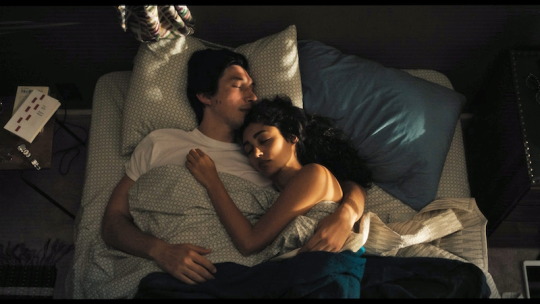
8. Paterson – Wonderfully understated, warm, and compassionate ode to the passion and creativity found in everyday life, making even the smallest mundanities feel profound and moving. No story arc or big dramatic moments to speak of; just the story of a quiet but observant bus driver/poet and his seemingly unremarkable but, well, poetic life. The relationship between Adam Driver and his wife (Golshifteh Farahani) is one of the most beautiful I’ve ever seen in a movie. Also; casting Adam Driver as a bus driver? Bravo, Jim Jarmusch.
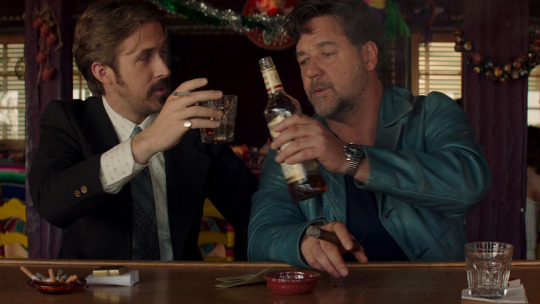
7. The Nice Guys – I can’t believe I used to not care for Ryan Gosling. Granted, for the longest time the only movie I’d seen him in was “Drive”, and it’s hard to take someone seriously as an actor when all the role asks of someone is to stare silently for uncomfortably long periods and occasionally hit people. But nonetheless, in recent years the guy has done phenomenal work and completely won me over as an actor, culminating in Shane Black’s “The Nice Guys”, where he gives his best performance to date. He is shockingly funny and provides not only a lot of the laughs in this movie, but also a good deal of its heart. He’s gotten a lot of awards attention for his role in “La La Land”, but to me this is the highlight of his career so far.
Gosling plays an alcoholic, bumbling private detective and single father who teams up with the low-rent enforcer who broke his arm (Russell Crowe) to crack a major conspiracy involving a missing girl and a dead porn star. Tagging along for much of the mystery is Gosling’s teenage daughter, played by Angourie Rice in one of the best child performances I’ve ever seen in a movie (damning with faint praise, but still, give her credit), easily holding her own in scenes with Gosling and Crowe, despite a few awkward line deliveries. The three leads are great and have excellent chemistry with each other and with the strong supporting cast, helped along by Black’s hilarious dialogue, irreverent sense of humor, and his continuing growth as a director. I already harped on this in previous reviews, but it’s really refreshing to see a comedy that actually sets its jokes up before giving them a good payoff, especially one where some setups aren’t initially obvious (a seemingly throwaway story about Richard Nixon ended up giving me one of the biggest laughs of the year later on).
There’s kind of a lack of urgency to the mystery that makes the pacing a bit lethargic. I didn’t mind it much because the characters are so likable that you don’t mind spending time with them, but it’s worth mentioning. While there’s some character conflict and growth, I wish it tied into the plot a bit more. The lack of a clear antagonist for the first half of the movie also hurts. There are a lot of jokes and visual gags, and while most work, a few do fall flat. I feel like an extra rewrite and some tighter editing could fix most of these problems, and none of them are by any means a deal-breaker.
It feels weird to call this film “original”, since it’s more or less the same film Shane Black’s been making for the past 30 years, but in an increasingly bland world of mainstream filmmaking, it’s so refreshing to see a unique voice like Black do his own thing with a great cast and a solid budget. It’s a damn shame that a film which should’ve led to some sequels instead just barely made its’ production budget back. Put it another way; if you complain about a lack of originality in Hollywood but still paid money to see the latest superhero flick instead of “The Nice Guys”, please dip your head into a bucket of wet cement until the bubbles stop.

6. Hacksaw Ridge – I’m willing to go on record and say that “Hacksaw Ridge” is probably the most violent movie I’ve ever seen (at least the most violent since the last Mel Gibson movie). Considering this, only Mad Mel can make such an insanely violent film while also telling a moving story about one man’s faith and adherence to pacifism. The story is about Desmond Doss, a conscientious objector and pacifist who wanted to serve his country as a combat medic, and whose extraordinary rescue of over 70 soldiers during the Battle of Okinawa became the stuff of legend and earned him a Medal of Honor.
The movie has kind of a typical biopic structure, showing his early years as a troublesome lad who finds meaning in life with Christianity, to his young adult days where he tries to romance his impossibly attractive later-wife, before moving to the boot camp scenes where he’s persecuted by others for his refusal to pick up a gun, and finally to the war scenes. The transition between corny but solid, old-fashioned melodrama (or MEL-odrama) and the incredible, surreal, horrific war stuff may sound jarring, but in a very smart move, Gibson opens the film with a slow-motion montage of combat with a narration from Doss. This seems kind of clichéd, but it sets your mind up to expect the stuff you’ll see later, while at the same time taking away none of the impact.
Contrary to what some may think about the film and of Gibson going in, it’s not one of those shitty “Christians are good, others suck” films that do remarkably well in the southern states. The subject of the film is deeply religious and the film has its fair share of unsubtle Christ-like imagery, sure, but not only does it not beat you over the head with it, it even feels earned after seeing what Doss is put through. Plus, if anything, it’s less about the strength of faith and more about sticking to your convictions even when the whole world tests you. Plus, it’s refreshing for a war movie to heroically portray a man who saved lives instead of taking them.
Despite being away from the director’s chair for a decade, Gibson has lost none of his storytelling prowess or his penchant for striking imagery. The period and technical detail is fantastic (during one scene where you see through the scope of a Japanese sniper rifle, the film even got the scope right). Despite having to fill the late, great James Horner’s (who couldn’t do the film due to his unfortunate death in 2015) shoes, Rupert Gregson-Williams surprisingly turns in one of the strongest musical scores of the year. The mostly-Australian cast is excellent, with Andrew Garfield giving a career-best performance as Doss (at this point, I forgive him for “The Amazing Spiderman 2”), as well as strong supporting turns from Vince Vaughn as the funny/tough drill sergeant, and especially from Hugo Weaving as Doss’s PTSD-ridden WWI veteran father. Weaving genuinely looks like a man who died in the trenches in France but whose body still returned home, turning to booze and anger to make him forget the trauma he experienced.
I would say that Hacksaw Ridge has all the makings of a great film but is slightly held back by some story choices. The film kind of ends shortly after Doss’s heroic exploits with some standard biopic text and interviews from his real-life former comrades. It’s fine, but I think it would have had more impact to first show Doss returning home and reuniting with his wife and family, considering how prominent the theme of family was in the film. Also, there is one scene late in the movie involving Japanese officers, which I won’t spoil, but it feels forced and EXTREMELY unnecessary (I guess Gibson just has a thing for beheadings).
Still, considering how good this film is overall and how well it’s being received, I’m happy to report that Mel Gibson is no longer persona non-grata in Hollywood, and that I absolutely look forward to whatever he’s making next. Welcome back, Mel. We missed you.
Note: Something I thought of after watching “Hacksaw Ridge”; Mel Gibson could totally direct a “Mad Max” film.
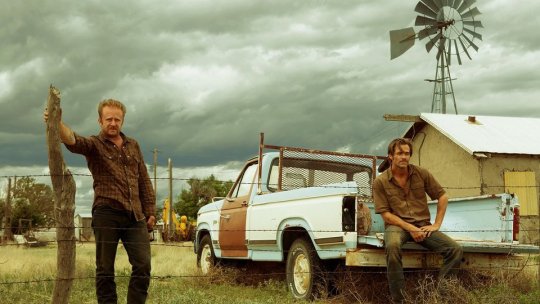
5. Hell or High Water - On an early Texas morning, a two men rob a pair of branches of the Texas Midlands Bank. While not without a few hiccups, the robberies go smoothly. The two men are siblings; calm and smart divorced father Toby (Chris Pine), and his loose-cannon ex-con brother Tanner (Ben Foster). They are trying to raise enough money to save their family farm by paying off the foreclosing bank with its own stolen money, while being hunted down by Texas Rangers Marcus and Alberto (Jeff Bridges and Gil Birmingham), the former close to retirement. There are still a number of branches they need to rob in order to raise the needed amount. What ensues is one of the most mature and intelligent thrillers I’ve seen in a long time.
There is no black or white. Just two sides of the law. We understand both sides, and the motivation of each man. While the robbery scenes are thrilling and gritty, the movie actually shows a tremendous level of restraint. The pacing is deliberately slow, but the film is so well-made and well-written and so confident in itself that it never becomes boring, and it builds exceptionally well to its grip-you-by-the-balls climax. The movie spends a lot of time with the characters talking, with dialogue that feels both realistic and entertaining. The extremely underrated TV show "Justified" has instilled in me a joy in hearing Southern people talk shit to each other, and the movie doesn't let me down in that regard. The rural, neo-Western setting is wonderfully atmospheric and does a good job conveying how tough life can be in such a place (with a noteworthy supporting performance from Katy Mixon as a waitress who refuses to give back a large tip of stolen money to the Rangers).
Even though his character is pretty much a less alcoholic and more down-to-earth version of his Rooster Cogburn from the Coens’ “True Grit”, Bridges still impresses with a soulful and highly entertaining performance. Similarly, while Ben Foster feels a bit typecast as the “wild man” brother, he still knocks it out of the park with his confidence and screen presence. The biggest surprise is Chris Pine, tuning down his smirky charm and turning in his best performance to date as a man whose cool-headedness masks his desperation.
If I had to think of a flaw, it's that the film has a slightly-annoying over-reliance on licensed country songs in the first half of the movie...really, that's all I can think of. The slow pacing might be a turnoff for some people (some extremely thick people who very likely have ADHD and are virgins), but it pays off so well that I can't even consider it a problem for anyone with a three-digit IQ. If you are tired of action movies or thrillers being dumb, this is the movie for you. If you are tired of smart movies being dull, this is the movie for you. "Hell or High Water" is a diamond in the rough that is 2016, and deserves your attention.
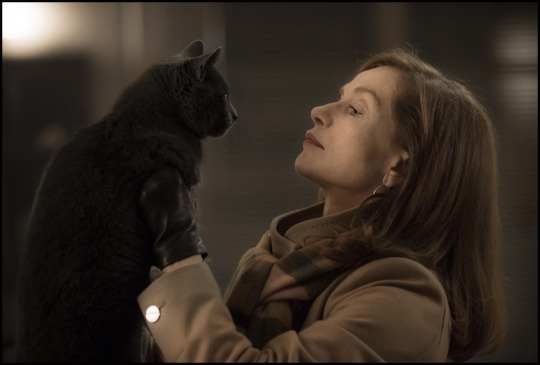
4. Elle – I saw this movie solely because Paul Verhoeven directed a sizable portion of my childhood (Robocop, Total Recall, and Starship Troopers), and he has enough goodwill based on that alone that I’ll check out anything he makes. While his European films are noticeably different from his American action classics, one thing that hasn’t faltered is his skill as a director and unique voice in telling provocative stories. “Elle” certainly has one hell of an opening. A wealthy middle-aged woman named Michèle is attacked and raped in her home in France. After the intruder leaves, Michèle calmly collects herself, cleans herself and her home, and goes to work the next day as if nothing is wrong. The rest of the movie is about her conducting her own investigation into finding out who attacked her as we learn about her feelings and why she doesn’t notify the police, as well as her complicated relationships with her friends, neighbors and family.
I can definitely see a lot of people getting offended by this movie’s depiction of rape and its consequences on the main character, but considering how complex and unpredictable human beings can be, this is one of the most bracing, raw and honest depictions of the subject I’ve ever seen. Put it simply, this isn’t your typical rape-revenge film. The excellent writing and Verhoeven’s strong command of the material and his cast elevates it beyond what I thought possible. The characters are very well-defined, with all their own quirks and needs and insecurities, and despite how uncomfortable the film can be, it’s also surprisingly very funny in how it presents them and their relationships with each other, especially during a fantastic Christmas dinner scene where all the characters and their animosities come together. There is a lot of gossiping, resentment, passive-aggressiveness and cuckoldry on display (it’s a French movie, so no surprise there). The film is certainly lurid, but everything from the story and performances to the themes and subtext is done so well that you can’t stop watching. At no moment during its two-and-a-half-hour running time was I bored.
“Elle” is a film I wouldn’t recommend to everyone due to its’ length and subject matter, but thanks to the strong writing, Paul Verhoeven’s confident direction, and a stunning lead performance from Isabelle Huppert, this a bold, gripping, and surprisingly entertaining film that is absolutely worth going out of your way to see if you can stomach it. Plus, there’s a really cute cat.
With that out of the way; please come back to America and make another gory, over-the-top action film, Mr. Verhoeven. Hollywood needs you more than you need it.
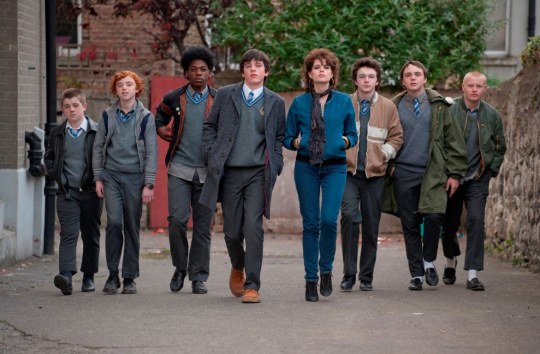
3. Sing Street – An Irish lad from a broken home in 1985 Dublin gets transferred to a rough, inner-city school. Soon he meets a mysterious girl hanging around outside the school, and in an effort to impress her, asks her to be a model in a music video for his non-existent band.
What follows is a coming-of-age story about artistic expression and love where the boy gathers anyone that can play an instrument (including the funniest part of the movie where they try to recruit “probably the only black guy in Dublin”), starts making music and videos, and slowly starts bonding with the girl. It’s tough to make a movie set in 20th century Ireland feel optimistic, but writer/director John Carney deftly maneuvers between comedy and drama, makes the film simultaneously fantastic yet grounded, making the story of falling in love and following one’s dreams feel believable and easy to root for.
From the tagline “Boy meets girl. Girl unimpressed. Boy starts band”, you can probably guess the general progression of the plot. This, coupled with the fact that I don’t like coming-of-age stories, or musicals, or Irish people*, means that this film was facing an uphill battle from me. Imagine how goddamn good this film must be that it’s number 3 on my list this year. A cynic would say that it doesn’t face much competition from an unremarkable year for film like 2016, but “Sing Street” is a wonderful ode to the power of music and young love that would be great in any year, and I defy you to watch it without a smile on your face. Basically, if you possess a heart, a soul, a dream, a love for music, or a pulse, I cannot recommend “Sing Street” enough.
*kidding. I love you, you pale, swear-y, chip-shop bombing drunkards.

2. Star Trek Beyond – After a strong start to a reboot of the storied franchise with 2009’s “Star Trek”, the series took a nosedive with “Star Trek Into Darkness”, the woefully misguided attempt to make the series dark and gritty. Because of this and the new director being Justin Lin, a man who has made four (well, three and a cameo) films about Vin Diesel sleepily growling about family in between scenes of supercars performing Cirque du Soleil acts, I wasn’t all too excited for the new entry, even though it’d be written by talented comic actor and well-known nerd Simon Pegg. Who would have thought that Pegg and Lin would have been the ones that saved not only 2016 from being a shit year for blockbusters, but also the soul of the “Star Trek” franchise?
The plot is about Kirk and the Enterprise crew getting stranded on a remote world after being attacked by a mysterious warlord while investigating a missing ship. It’s a slick and self-contained adventure, making it feel like a long and big-budget episode of the series in the best possible way. I don’t want to imply that this is the “Star Trek” of yore. It’s still a big, over-the-top space action film. But it has something that the previous two films (especially Into Darkness) lacked; spirit. The spirit of discovery, of exploration, of optimism. That despite the dangers in the galaxy, any problem can be overcome as long as all the species work together. Most importantly, it has an emphasis on character, actually slowing down at times to let them breathe and talk and joke with each other (y’know, like they’re people or something, and not just plot-devices). There’s a wonderful little scene at the start where Kirk and Bones share a drink to toast Kirk’s deceased father, and the tributes to the gone-but-not-forgotten Leonard Nimoy and Anton Yelchin were beautifully done.
It’s remarkable how well Lin and Pegg capture this “Star Trek” spirit while still making an exciting, blockbuster action film. Lin brings his A-game to the action scenes, making them fun, creative, and natural as a story progression. You always understand why the action is happening, as opposed to a random fight being thrown in for its own sake. There’s a certain scene later in the film where a ship has to take on a swarm of smaller enemies with a familiar musical cue, and I cannot remember the last time I ever felt so much hype and childish glee in a movie scene.
I guess the villain is the same generic normal-guy-who-was-betrayed-and-wants revenge that the past two films had, but between the still-excellent cast (newcomer Sofia Boutella steals the show as an alien warrior/scavenger that Scotty meets), a strong soundtrack, awesome visuals, a fun story, involving action scenes, and that warm “Star Trek” feel to it, “Star Trek Beyond” feels like a jolt to the heart of a series that was in danger of becoming lost to soulless, studio-driven blockbuster territory. Assuming there’s more to this series of films, I cannot wait to see where the franchise boldly goes from here.

1. Free Fire – This is the most fun I’ve had in a theater since “Mad Max: Fury Road”. I wasn’t a huge fan of Ben Wheatley’s previous films, but among the material I didn’t really care for, I saw an undeniable talent in his work. Here, it’s like he used his powers to make a movie precisely for me.
The film is about an arms deal that takes place in a warehouse between two groups of criminals that quickly gets out of hand after shots are fired in the exchange. The remaining 70 minutes of this 90-minute long movie is basically one really long shootout as everyone picks sides, betray each other, and get increasingly wounded while rarely ceasing their shit-talking. Think “Reservoir Dogs” as a comedy of miscommunication. In an amazing feat of filmmaking, Wheatley makes sure that this lengthy shootout set mostly in one large room isn’t boring for a second. His smart, gradual escalation of events punctuated with a number of “holy shit” moments and set pieces, held together by excellent editing, keeps the film exciting and darkly funny throughout. In between the big moments, characters take pause to hurl expletives at each other and ponder their own situation as they desperately try to get out of it, adding up to people you care about and are interested in even if they’re all dicks. This is a brilliant example of how important pacing and characterization is to a film, especially to one with so little plot.
Also helping is the hilarious banter, delivered by a wonderful and colorful cast of characters played by a small but absolutely stellar cast. Everyone is great and play their characters perfectly, with a standout performance by Sharlto Copley as an unhinged, self-absorbed arms dealer who causes much of the conflict in the film. I knew I’d love him as soon as a character says “Vernon was misdiagnosed as a child genius and never got over it.” I also want to mention the sound design, which is some of the best in recent memory, with every bullet fired feeling like a loud jolt to one’s system. The writing is highly enjoyable on a superficial level, and even carries a bit of depth with the shootout being a clever allegory for human nature and just generally what happens when idiots own guns.
“Free Fire” is by far the best movie I saw this year, and when it gets a theatrical release, I implore you to go see it. The only complaints I can think of are that the ending is just alright, and after a certain point you start to wonder where some of the characters keep getting their ammo from. Time will tell if this film stands up to repeated viewings, but this was easily the funniest, craziest, and most entertaining film I’ve seen all year. Yes, my favorite movie of 2016 is a 2017 movie in which characters argue and shoot each other in a dirty warehouse for 90 minutes. Cinema isn’t dead yet.
The “30 and Still Living in Parents’ Basement” Award for Biggest Disappointment
Nominees:
· Jack Reacher: Never Go Back
· Jason Bourne
· Passengers
· Rogue One: A Star Wars Story
· Warcraft
Runner-up:
Rogue One: A Star Wars Story
Winner:
Passengers
The “Clever Marketing” Award for Best Tagline
Nominees:
· Elvis & Nixon – “On December 21st, 1970, two of America's greatest recording artists met for the first time.”
· Free Fire – “All guns. No control.”
· London Has Fallen – “Prepare for bloody hell”
· The Dressmaker – “Revenge is back in fashion”
Runner-up:
The Dressmaker
Winner:
Elvis & Nixon
The “Postcore Avantwave” Award for Best Film Score
Nominees:
· Bear McCreary – 10 Cloverfield Lane
· Justin Hurwitz – La La Land
· Mark Mancina, Lin-Manuel Miranda, Opetaia Foa'i - Moana
· Matthew Margeson – Eddie the Eagle
· Michael Giacchino – Star Trek Beyond
· Rupert Gregson-Williams – Hacksaw Ridge
· Shirō Sagisu – Shin Godzilla
Runner-up:
Mark Mancina, Lin-Manuel Miranda, Opetaia Foa'i - Moana
Winner:
Bear McCreary – 10 Cloverfield Lane
The "I'm Glad We Decided to Keep It" Award for Best Child Performance
Nominees:
· Angourie Rice - The Nice Guys
· Auli'i Cravalho - Moana
· Ferdia Walsh-Peelo – Sing Street
· Harvey Scrimshaw - The Witch
· Julian Dennison - Hunt for the Wilderpeople
· Kim Su-an – Train to Busan
· Lucas Jade Zumann – 20th Century Women
Runner-up:
Julian Dennison - Hunt for the Wilderpeople
Winner:
Angourie Rice - The Nice Guys
The “If Only the Rest of the Movie Was This Good” Award for Best Scene
Nominees:
· Athens riot – Jason Bourne
· Beach drowning – Silence
· Captain America and Winter Soldier vs. Iron Man – Captain America: Civil War
· Car chase – Operation Avalanche
· Christmas dinner party – Elle
· Climactic robbery/shootout/getaway – Hell or High Water
· Desmond’s rescues – Hacksaw Ridge
· “Drive It Like You Stole It” – Sing Street
· Epilogue – La La Land
· Entering the ship – Arrival
· “How Far I’ll Go” – Moana
· Police station – Manchester by the Sea
· Sabotage – Star Trek Beyond
· The un-destruction of Hong Kong – Doctor Strange
· The 90-meter jump – Eddie the Eagle
· Quicksilver and the exploding mansion – X-Men: Apocalypse
· Warehouse rescue - Batman v Superman: Dawn of Justice
Runner-up:
Police station – Manchester by the Sea
Winner:
Sabotage – Star Trek Beyond
The “Pig in Lipstick” Award for Prettiest Movie
Nominees:
· A Bigger Splash
· Batman v Superman: Dawn of Justice
· Doctor Strange
· Hail Caesar!
· Kubo and the Two Strings
· La La Land
· Moana
· The Handmaiden
· The Love Witch
Runner-up:
The Handmaiden
Winner:
Kubo and the Two Strings
The “Premium Meth” Award for Best Chemistry
Nominees:
· Adam Driver and Golshifteh Farahani - Paterson
· Casey Affleck and Michelle Williams – Manchester by the Sea
· Chris Pine and Ben Foster – Hell or High Water
· Gerard Butler and his knife – London Has Fallen
· Jeff Bridges and Gil Birmingham – Hell or High Water
· Michael Peña and Alexander Skarsgård – War on Everyone
· Ruth Negga and Joel Edgerton – Loving
· Ryan Gosling and Russell Crowe – The Nice Guys
· Ryan Reynolds and Morena Baccarin – Deadpool
· Sacha Baron Cohen and Mark Strong – The Brothers Grimsby
Runner-up:
Michael Peña and Alexander Skarsgård – War on Everyone
Winner:
Casey Affleck and Michelle Williams – Manchester by the Sea
The “Healed Broken Bone” Award for Best Cast
Nominees:
· 20th Century Women
· Captain America: Civil War
· Everybody Wants Some!!
· Fences
· Free Fire
· Hail, Caesar!
· Love & Friendship
· Sing Street
· Star Trek Beyond
· The Magnificent Seven
Runner-up:
Sing Street
Winner:
Free Fire
The “Convincingly Faked Orgasm” Award for Best Performance
Honorable Mentions:
· Andrew Garfield – Hacksaw Ridge
· Ben Foster – Hell or High Water
· Blake Lively – The Shallows
· Chris Pine – Hell or High Water
· Emma Stone – La La Land
· Hugo Weaving – Hacksaw Ridge
· Joe Alwyn – Billy Lynn’s Long Halftime Walk
· Joel Edgerton – Loving
· Judy Davis – The Dressmaker
· Kate Beckinsale – Love & Friendship
· Kate Winslet – The Dressmaker
· Kwak Do-won – The Wailing
· Mahershala Ali - Moonlight
· Ruth Negga – Loving
· Sam Neill – Hunt for the Wilderpeople
· Viggo Mortensen – Captain Fantastic
· Woody Harrelson – The Edge of Seventeen
Nominees:
· Adam Driver – Paterson
· Alden Ehrenreich – Hail, Caesar!
· Annette Bening – 20th Century Women
· Casey Affleck – Manchester by the Sea
· Denzel Washington – Fences
· Gerard Butler – London Has Fallen
· Greta Gerwig – 20th Century Women
· Isabelle Huppert - Elle
· Jeff Bridges – Hell or High Water
· John Goodman – 10 Cloverfield Lane
· Michael Shannon – Nocturnal Animals
· Michelle Williams – Manchester by the Sea
· Ralph Fiennes – A Bigger Splash
· Rebecca Hall – Christine
· Ryan Gosling – The Nice Guys
· Ryan Reynolds – Deadpool
· Sharlto Copley – Free Fire
· Tom Bennett – Love & Friendship
· Viola Davis – Fences
Runner-up:
Gerard Butler – London Has Fallen
Winner:
Ryan Gosling – The Nice Guys
In regards to my final award:
The whole “Fuck 2016” thing has been done to death, albeit not undeservingly, so this’ll be my only word on the matter. A lot of us had a rough year, dealing with political strife, global conflict, environmental issues, personal problems, celebrity deaths, “Suicide Squad”, etc. Even in film, 2016 has felt like a bit of a downer, with many films I was looking forward to letting me down. However, there have been quite a few gems, especially in the latter half of the year, and a good number of these are off the beaten path, ones I actively searched for to find and ones I gave a shot even if they’re the type of thing I wouldn’t normally see.
My point is, we have to make an effort to get the good out of life. You can still find some gems while wading through a river of shit (which you’re going to wade through anyway), and I’m not just talking about movies. Try something you normally wouldn’t. Try to pick up a new hobby. Make some personal time for yourself, even if you’re swamped with work or school. Start exercising if you don’t already (hell, try yoga). Don’t just accept that life is shit; do something to make it less shit. Always strive to better yourself, because while there’s no such thing as perfection (unless you’re Michael Shannon), it doesn’t mean we shouldn’t reach for it.
The mere fact that you’re reading this means that you’re actively trying to de-pleb yourself, or maybe it’s because you love me or maybe I just make you laugh sometimes. In any case, thank you for reading this year-in-review. As it has been for the past two years, writing this was fun and therapeutic. I wish you all luck in seeking happiness (and good taste in film, like mine), and for those of you who have a bad day somewhere on that journey, film is always there for you, including the following films which can cheer one up even on the rainiest days.
The “Ancient Indian Burial Ground” Award for Film Most Likely to Raise Your Spirits
Nominees:
Eddie the Eagle
Sing Street
Hunt for the Wilderpeople
Everybody Wants Some!!
Moana
Runner-up:
Sing Street
Winner:
Eddie the Eagle
2 notes
·
View notes